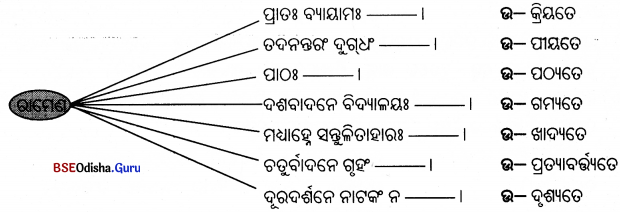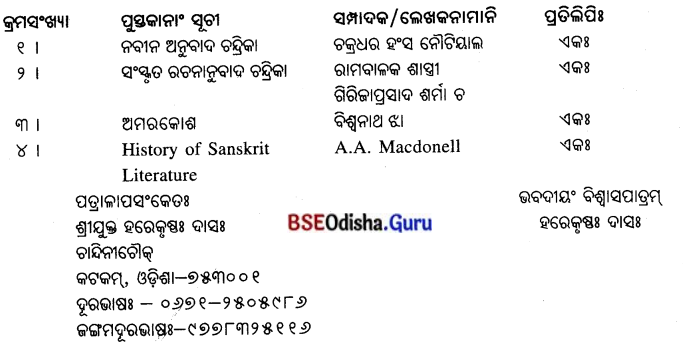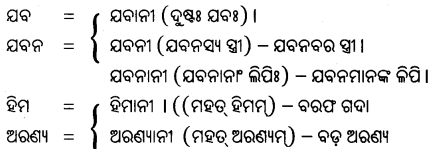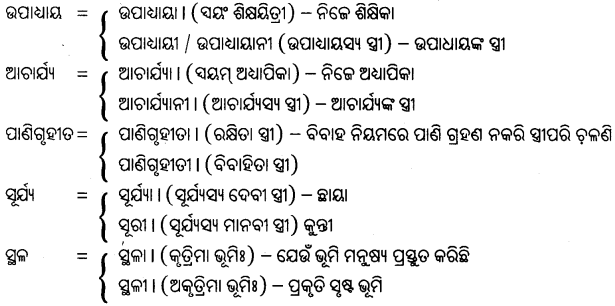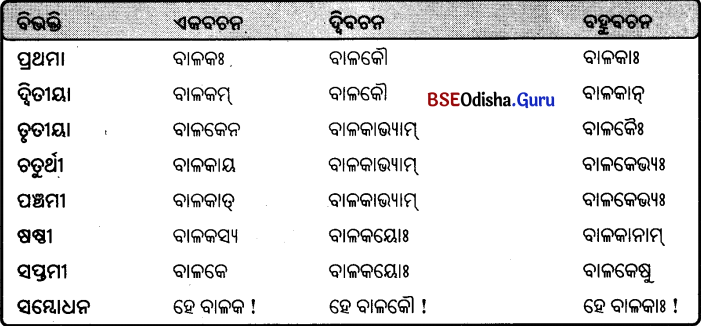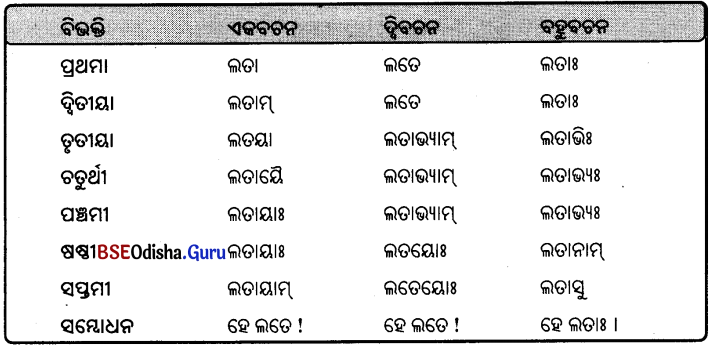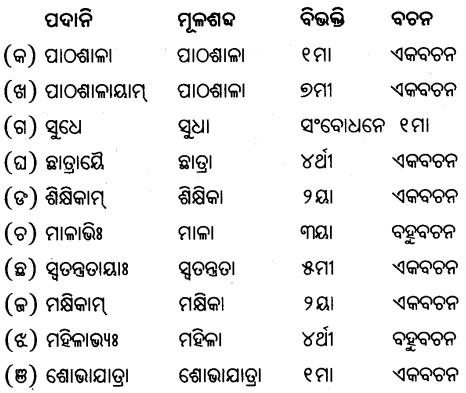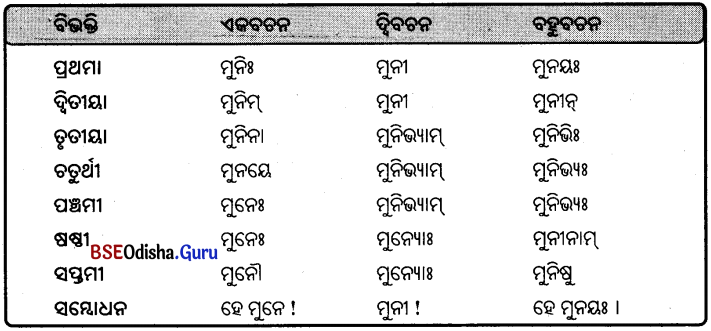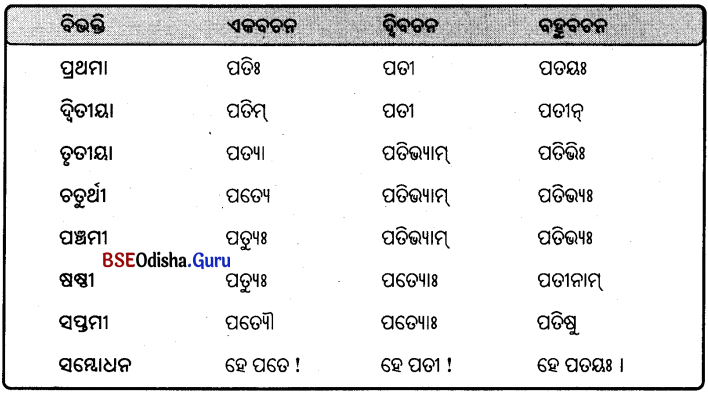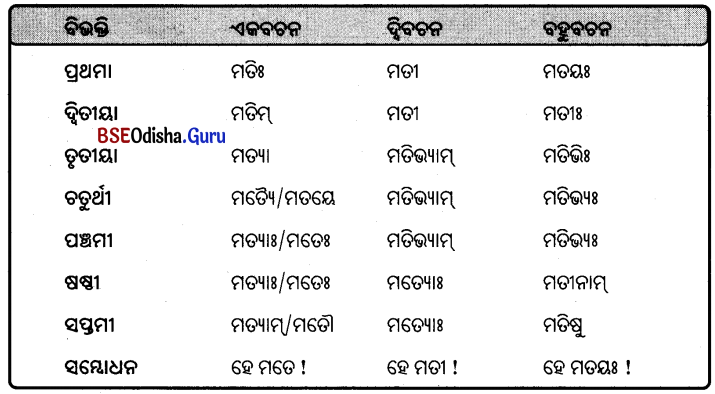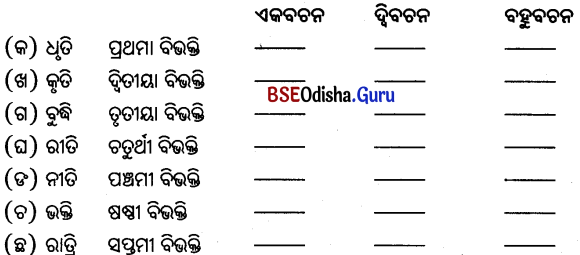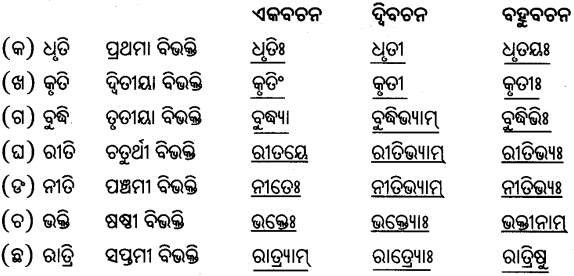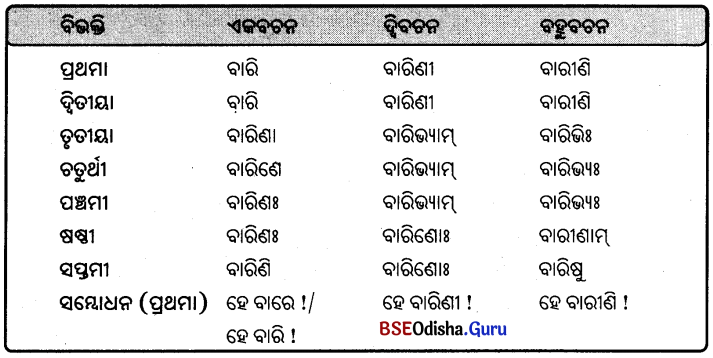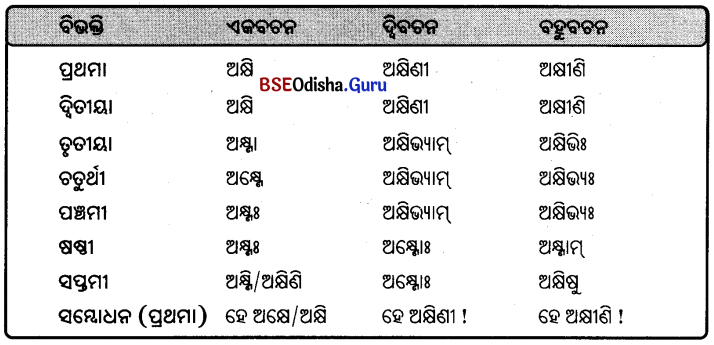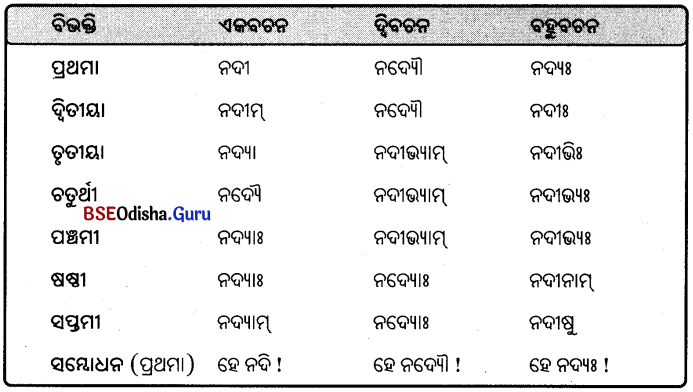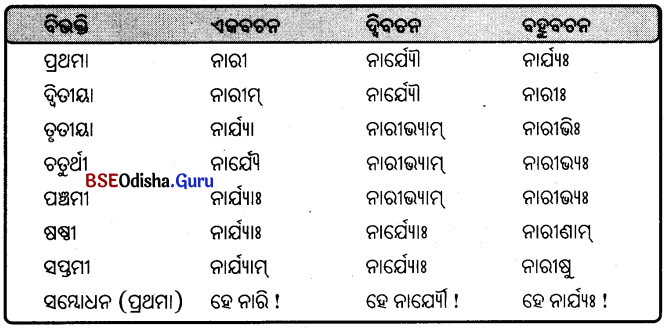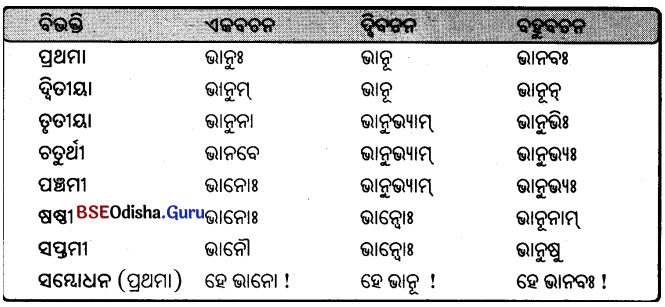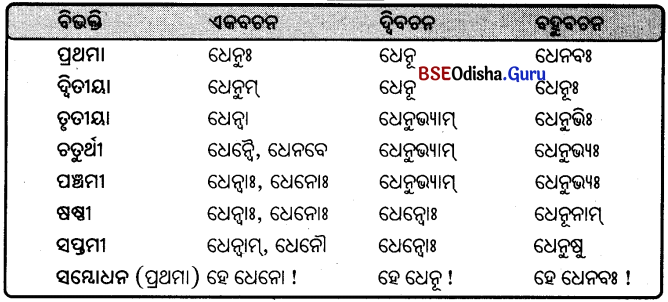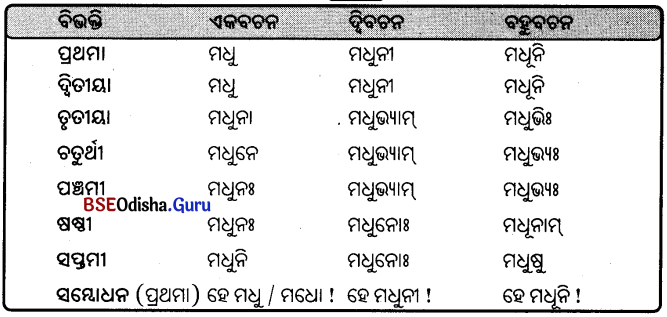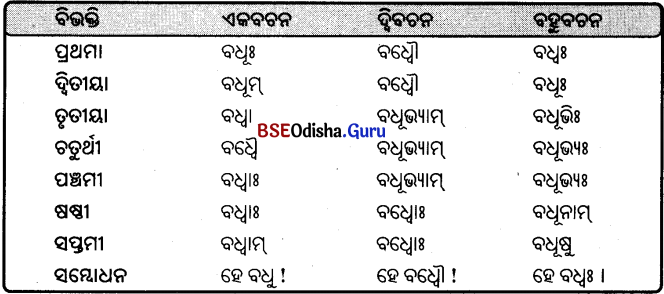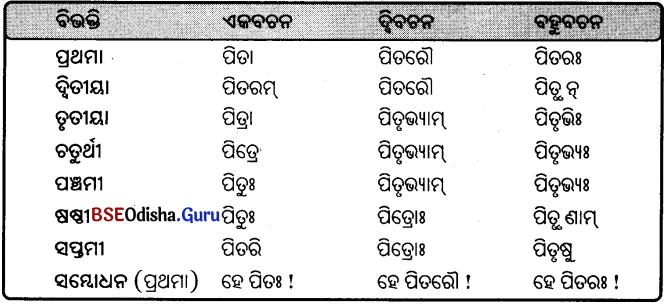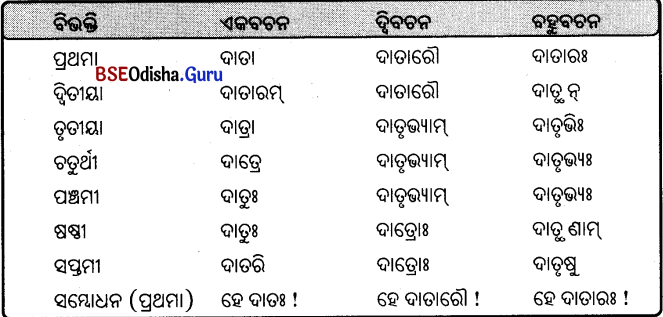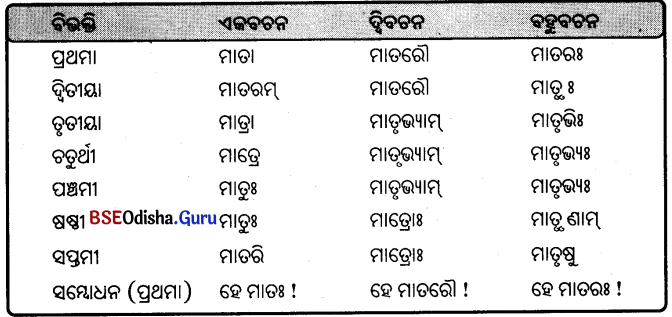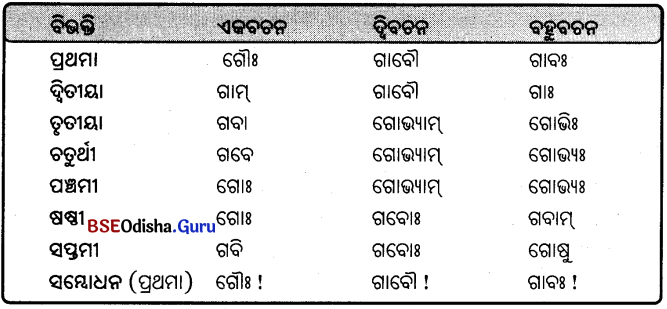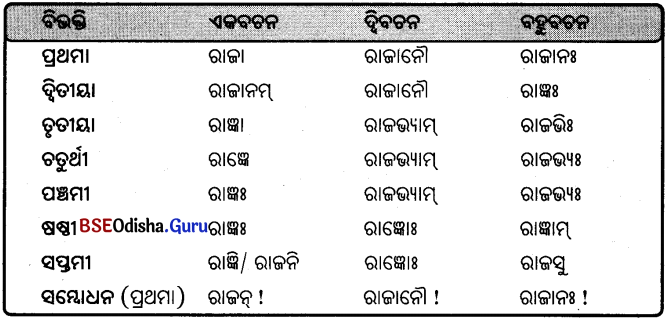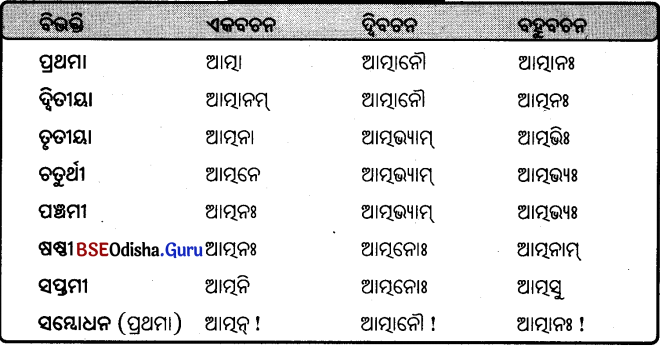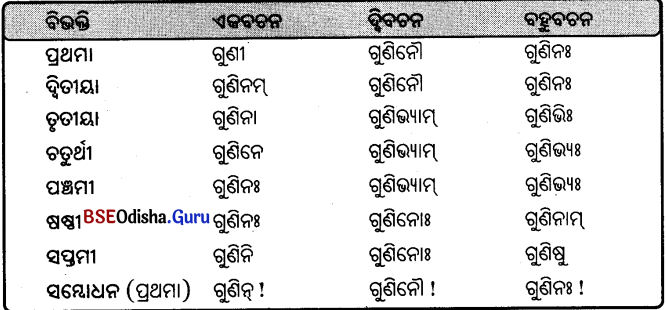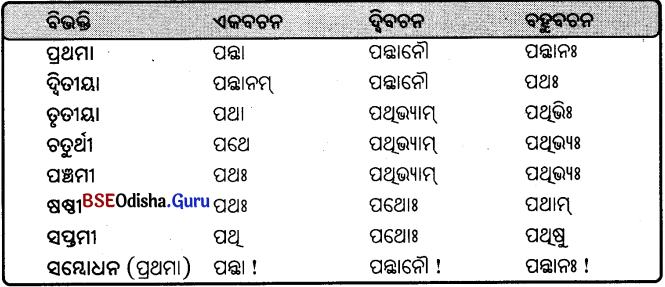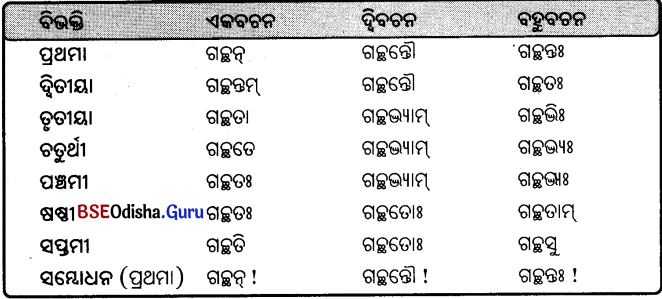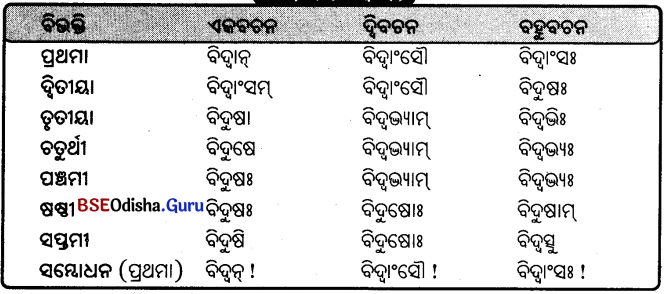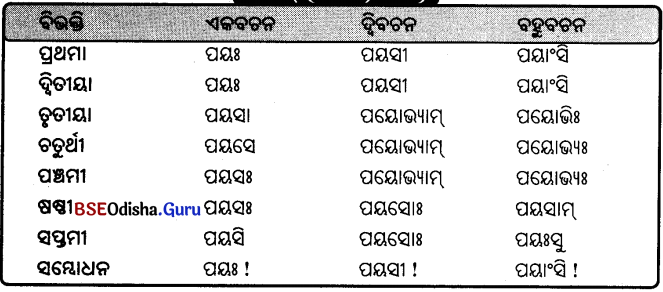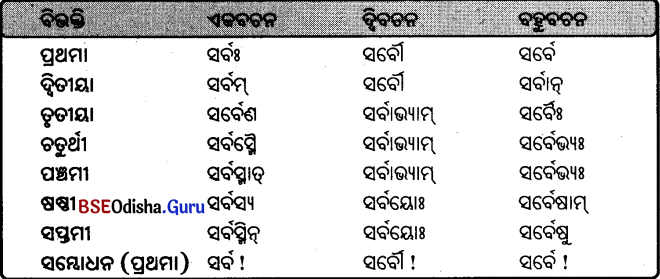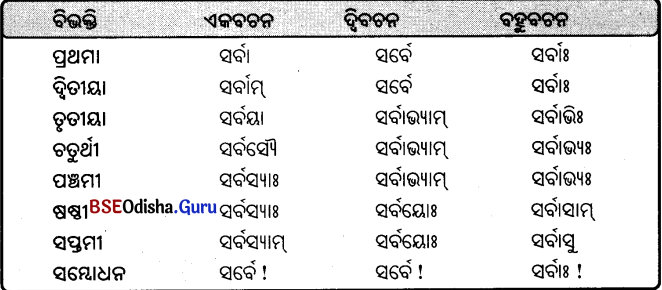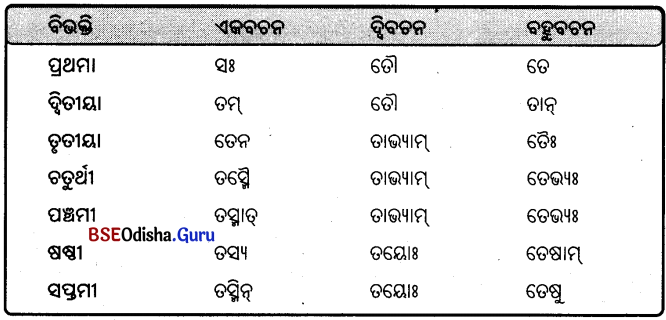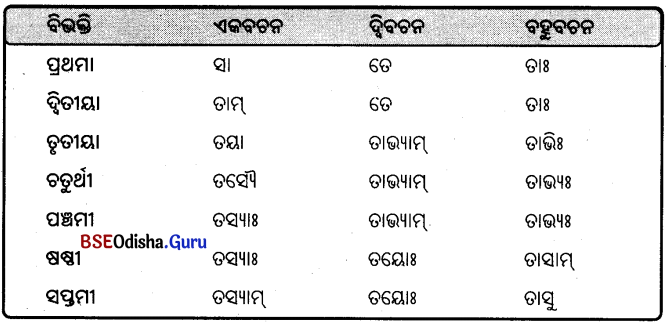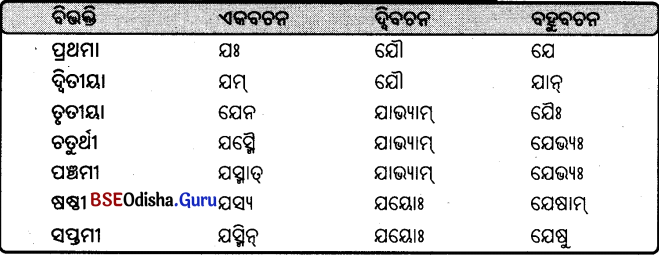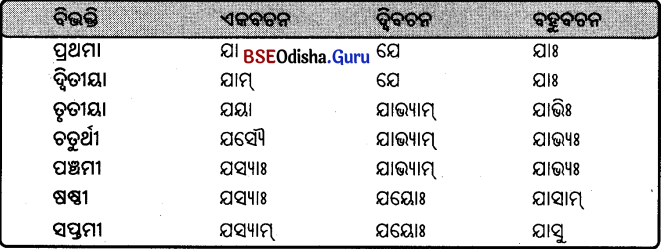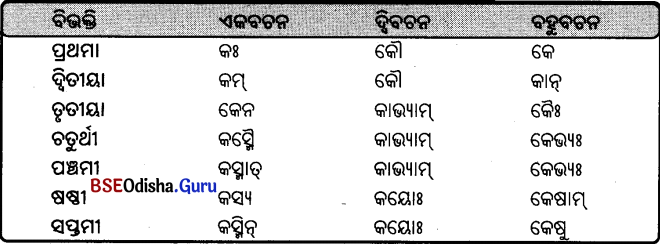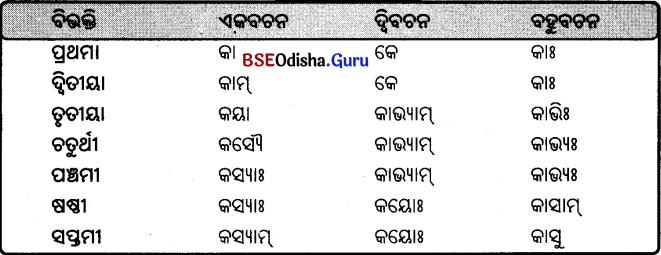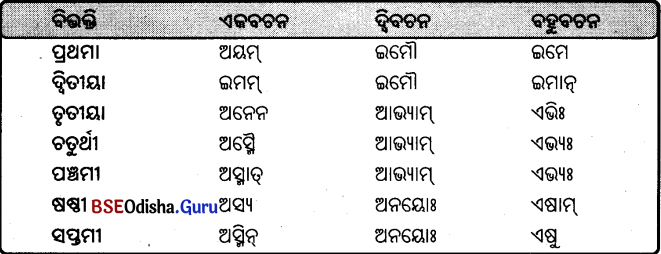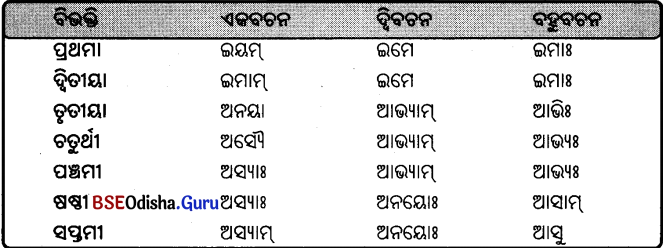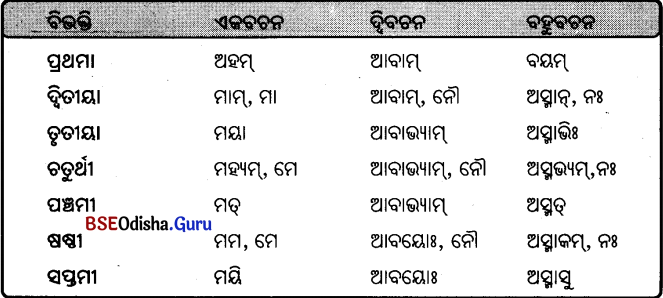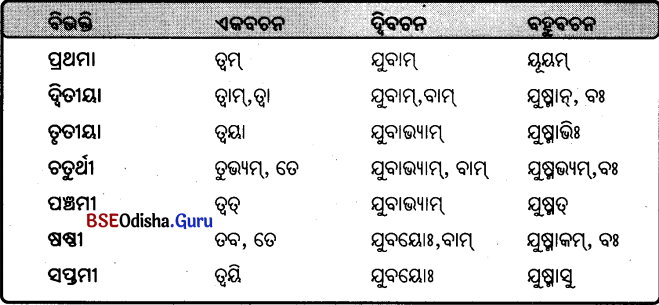Odisha State Board BSE Odisha Class 10 Sanskrit Grammar Book Solutions Chapter 2 ସମାସ Textbook Exercise Questions and Answers.
BSE Odisha Class 10 Sanskrit Grammar Solutions Chapter 2 ସମାସ
ସମାସର ସଜ୍ଞା : ପରସ୍ବର ନିକଟବର୍ତୀ ସମ୍ବନ୍ଧ ଥୁବା ପଦମାନଙ୍କର ସଂହତି ବା ମିଳନକୁ “ସମାସ” କୁହାଯାଏ ।
“ସମସ୍ଯତେ ଅନେକପଦମ୍ ଇତି ସମାସଃ? । ଏକାଧ୍କ ପଦମାନଙ୍କ ମିଳନସମୟରେ ଭାବ ବା ଅର୍ଥକୁ ଆଶ୍ରୟ କରି ସମାସ ନିରୂପଣ କରାଯାଇଥାଏ । ସମାସ ପଦବିଧ୍ ଅଟେ। ସମସନଂ ନାମ ସମାସଃ ।
ଲକ୍ଷ/ କର :
ମାତୁଳାଳୟଃ = ମାତୁଳସ୍ଯ ଆଳୟଃ ! (ମାମୁଙ୍କ ଘର)
ଉପକୂଳମ୍ = କୁଳସ୍ୟ ସମୀପମ୍ । (କୂଳର ନିକଟ)
ମାତାପିତରୌ = ମାତା ଚ଼ ପିତା ଚ଼। (ମାଆ ଓ ବାପା)
ବୀଣାପାଣିଃ = ବୀଣା ପାଣୌ ଯସ୍ୟାଃ ସା । (ବୀଣା ପାଣିରେ ଯାହାର ସେ)
ଉପର୍ଯ୍ୟକ୍ତ “ ମାତୁଳାଳୟଃ” ପ୍ରଭୃତି ପଦଗୁଡ଼ିକର ଅର୍ଥ “ ମାତୁଳସ୍ୟ ଆଳୟଃ” ଇତ୍ୟାଦି ପଦସଂହତିଦ୍ଵାରା ସ୍ପଷ୍ଟ କରାଯାଇଛି । ତେଣୁ “ ମାତୁଳସ୍ୟ ଆଳୟଃ” ପ୍ରଭୃତିକୁ ବ୍ୟାସବାକ୍ୟ / ବିଗ୍ରହ / ସମସ୍ୟମାନ ପଦ ବୋଲି କୁହାଯାଏ । ସେହିପରି ‘ ମାତୁଳାଳୟଃ” ପ୍ରଭୃତି ସମସ୍ତ ଅର୍ଥକୁ ଏକପଦରେ ପ୍ରକାଶ କରୁଥ୍ବାରୁ ସେମାନଙ୍କୁ “ ସମସ୍ତପଦ” କୁହାଯାଏ । ବ୍ୟାସବାକ୍ୟରେ ଥୁବା ଦୂଇଟିପଦ ଯଥା – ମାତୁଳ ଏବଂ ଆଳୟ ମିଶିଯାଇ “ମାତୁଳାଳୟ” ଗଠିତ ହେବାପରେ ଏହାର ଆକାଂନ୍ଷିତ ୧ ମା ବିଭଛି ଏକବଚ଼ନରେ “ମାତୁଳାଳୟଃ” ରୂପ ସୃଷ୍ଠି ହୋଇଛି । ସମସ୍ତପଦର ଅନ୍ୟବିଭ୍ତିରେ ରୂପାନ୍ତରଣ ପାଇଁ ବିଗ୍ରହବାକ୍ୟ ପରେ ତଦ୍ଶବ୍ଦର ସେହି ବିଭକ୍ତି ଓ ବଚ଼ୂନର ରୂପ ଲଗାଯାଇଥାଏ ।
ଲକ୍ଷଃ କର :
ମାତୁଳାଳୟମ୍ ମାତୁଳସ୍ୟ ଆଳୟଃ, ତମ୍ ।
ମାତୁଳାଳୟେନ = ମାତୁଳସ୍ଯ ଆଳୟଃ, ତେନ ଇତ୍ୟାଦି ।

ମ୍ଣନରଙ୍କ – (୧) ସମସ୍ତପଦ ବିଗ୍ରହବାକ୍ୟ ନିର୍ଣ୍ୟ ସମୟରେ ପ୍ରଥମେ ସମସ୍ତପଦର ମୂଳପଦଟି ନିର୍ଣ୍ଣୟ କରି ତା”ର ବିଗ୍ରହବାକ୍ୟ ସୃଷ୍ଟି କରାଯାଏ । ତା’ ପରେ ସମସ୍ତପଦର ଯେଉଁ ବିଭକ୍ତି ଓ ବଚ଼ନ ଥାଏ, ତଦ୍ଶବ୍ଦର ସେହି ବିଭକ୍ତ ଓ ବଚ଼ନର ରୂପ ଲଗାଯାଏ, “ମାତୁଳାଳୟଃ” ପଦରେ ଥବା ଦୁଇଟିପଦମଧ୍ଚରୁ ମାତୁଳ ପଦଟିକୁ ପୂର୍ବପଦ ଓ ଆଳୟ ପଦଟିକୁ ପରପଦ ବା ଉତ୍ତରପଦ କୁହାଯାଏ । ବିଗ୍ରହବାକ୍ୟାରେ ଥବା ପୂର୍ବପଦ ଓ ପରପଦର ବିଭଳ୍ତି ଓ ବଚ଼ନର ଯେଉଁ ଚିହ୍ନ ଲାଗିଥାଏ, ତାହା ସମାସବିଧ୍ସମୟରେ ଲୋପପାଇଥାଏ । ବିଗ୍ରହବାକ୍ୟରେ ଥୁବା ପୂର୍ବପଦ ଓ ପରପଦର ମିଳନ ସମୟରେ ଆବଶ୍ୟକତା ଅନୁଯାୟୀ ସନ୍ଧି କରାଯାଏ – ନିତ୍ୟା ସମାସେ’ । ଶେଷରେ ଆବଶ୍ୟକ ବିଭକି ଓ ବଚ଼ନର ଚିହ୍ନ ସମସ୍ତପଦରେ ଲଗାଯାଇଥାଏ ।
ପୂର୍ବବର୍ଣ୍ଣିତ ଉଦାହରଣଗୁଡ଼ିକୁ ଲକ୍ଷ୍ୟ କର :
“ମାତୁଳାଳୟଃ” ପଦରେ ଉଭର ପଦ ବା ‘ଆଳୟ’ ପଦର ପ୍ରାଧାନ୍ଯ, “ଭପକୂଳମ୍” ପଦରେ ପୂର୍ବପଦ ବା ଉପ (ଅବ୍ୟୟ) ପଦର ପ୍ରାଧାନ୍ୟ, “ ମାତାପିତରୌ” ପଦରେ ଉଭୟପଦ ବା ମାତା ଓ ପିତା ପଦଦୁଇଟିର ପ୍ରାଧାନ୍ୟ ଏବଂ “ ବୀଣାପାଣିଃ” ପଦରେ କୋଣସି ପଦର ପ୍ରାଧାନ୍ୟ ନଥାଇ “ ସରସ୍ପତୀ? ପଦାର୍ଥର ପ୍ରାଧାନ୍ୟ ଅନୁଭୂତ ହୁଏ । ଏହି ପ୍ରାଧାନ୍ୟ ଦୃଷ୍ଟିରୁ ସମାସକୁ ୪ଟି ବିଭାଗରେ ବିଭକ୍ତ କରାଯାଇଛି ।
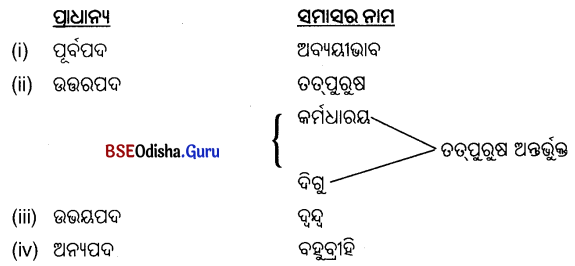
ସମାସ ଛଅ ପ୍ରକାର – (i) ଅବ୍ୟୟୀ ଭାବ, (ii) ତତ୍ପୁରୁଷ, (iii) କର୍ମଧାରୟ, (iv) ଦ୍ବନ୍ଦ୍ବ (v) ଦ୍ବିଗୁ ଓ (vi) ବହୁବ୍ରୀହିଃ । ନିମ୍ନସ୍ଥ ସମାସବିଧିକୁ ଲକ୍ଷ୍ୟ କର-

ଏଠାରେ ସୁବୁଵି” ପଦଟି ଭିନ୍ନଭିନ୍ନ ଅର୍ଥ ପ୍ରକାଶ କରୁଛି । ଯଥା –
(i) ବାଳକସ୍ୟ ସୁବୁଦ୍ଧିଃ ପ୍ରଶଂସନୀୟା (କର୍ମଧାରୟ) – ପିଲାଟିର ସୁବୁଦି ପ୍ରଶଂସାଯୋଗ୍ୟ ।
(ii) ସୁବୁଦ୍ଧିଃ ପୁତ୍ରଃ ପ୍ରଶଂସିତଃ ଭବତି । (ବହୁବ୍ରୀହି – ପୁଲିଙ୍ଗ) – ସୁବୁଵି ପୁତ୍ର ପ୍ରଶଂସିତ ହୁଏ ।
(iii) ସୁବୁଦ୍ଧିଃ କନ୍ୟା ପ୍ରଶଂସିତା ଭବତି । (ବହୁବ୍ରୀହି – ସ୍ତୀଲିଙ୍କ) – ସୁବୁଦି କନ୍ଯା ପ୍ରଶଂସିତ ହୁଏ ।
ଅର୍ଥକୁ ଆଶ୍ରୟ କରି “ସୁବୁଦ୍ଧି” ପଦର ଭିନ୍ନ ଭିନ୍ନ ବିଗ୍ରହବାକ୍ୟ ଓ ସମାସ ହେଉଅଛି । ତେଣୁ ସମାସକୁ ଅଅର୍ଥାଶ୍ରୟୀ କୁହାଯାଏ ।
ଏହି ସମାସଗୁଡ଼ିକର ଉପବିଭାଗସବୁ ରହିଛି ସେଗୁଡ଼ିକ ସଂପୃକ୍ତ ସମାସ ଆଲୋଚ଼ନା ସମୟରେ ଉପସ୍ଥାପନ କରାଯିବ । ଏତଦ୍ବ୍ୟତୀତ ଅଲୁକ୍, ନିତ୍ୟ ଓ ସୁପ୍ସୁପା ଇତ୍ୟାଦି ସମାସ ବିଷୟରେ ଆଲୋଚ଼ନା କରାଯିବ ।
ଅବ୍ଯୟୀଭାବ:
ଅବ୍ଯୟ ପୂର୍ବପଦରେ ଥାଇ ଯେଉଁ ସମାସ ହୁଏ ତାହାକୁ “ଅବ୍ଯୟୀଭାବ” ସମାସ କୁହାଯାଏ ‘ମୂର୍ବେଛବ୍ୟୟେଃବ୍ଯୟୀଭାବଃ? କୃତ୍, ତଵିତ, ନିପାତ ଓ ଉପସର୍ଗ ଅନ୍ତର୍ଗତ ଅବ୍ଯୟଗୁଡ଼ିକ ପୂର୍ବପଦରେ ବ୍ଯବହୃତ ହୋଇଥ୍ଲେ ସମସ୍ତପଦ ଅବ୍ୟୟୀଭାବ ସମାସର ହୋଇଥାଏ । ସାଧାରଣତଃ ସମସ୍ତପଦଗୁଡ଼ିକ ଅବ୍ୟୟ ହୁଅନ୍ତି ।
ଲକ୍ଷ୍ୟ କର :
(i) ଅହଂ ଯଥାଶକ୍ତି ଧନଂ ଦାସ୍ୟାମି । (ମୁଁ ଯଥାଶକ୍ତି ଧନ ଦାନ କରିବି)
(ii) ଶିକ୍ଷକଃ ପ୍ରତିଶିଷ୍ୟଂ ପ୍ରଶ୍ନଂ ପୃଛ୍ଛତି । (ଶିକ୍ଷକ ପ୍ରତ୍ୟେକ ଶିଷ୍ୟକୁ ପ୍ରଶ୍ନ ପଚାରନ୍ତି)
ପ୍ରଥମ ବାକ୍ୟରେ “ଯଥାଶକ୍ତି’ ପଦଟି ଶକ୍ତିଅନୁସାରେ (ଶକ୍ତିମ୍ ଅନତିକ୍ରମ୍ୟ) ଏବଂ ଦ୍ବିତୀୟ ବାକ୍ୟରେ “ଅନତିକ୍ରମ୍ୟ” ଅର୍ଥରେ “ଯଥା” ଏବଂ ଦ୍ବିତୀୟ ବାକ୍ୟରେ ଶିଷ୍ୟପଦର ଦ୍ବିରୁକ୍ତି ଅର୍ଥରେ “ ପ୍ରତି ଅବ୍ୟୟର ପ୍ରୟୋଗ କରାଯାଇଛି । ପଦଦୂଇଟି ଅବ୍ୟୟ (କ୍ଯୀବଲିଙ୍ଗ) ପ୍ରଥମାବିଭକ୍ତି ଏକବଚ଼ନ) ହୋଇଛନ୍ତି ।
ମନେରଖ: ପୂର୍ବପଦରେ ପ୍ରଯୁକ୍ତ ଅବ୍ୟୟଟି ବିଗ୍ରହବାକ୍ୟରେ ତା’ର ଅର୍ଥକୁ ସ୍ପଷ୍ଟ କରିଥାଏ। ଏହିପରି କେତେକ ଉଦାହରଣକୁ ଲକ୍ଷ୍ୟ କର –
(i) ପିତା ଯଥାକାଳମ୍ ଆଗମିଷ୍ୟତି (କାଳମ୍ ଅନତିକ୍ରମ୍ୟ) । – ବାପା ଠିକ୍ ସମୟରେ ଆସିବେ ।
(ii) ସଃ ଦରିଦ୍ରେଭ୍ୟଃ ଯଥେନ୍ଛଂ ଯଚ୍ଛତି । (ଇଚ୍ଛାମ୍ ଅନତିକ୍ରମ୍ୟ) – ସେ ଗରିବ ଲୋକଙ୍କୁ ଯଥେଚ୍ଛ ଦିଅନ୍ତି ।
(iii) ଅହଂ ଯଥାବିଧ୍ ଭଶ୍ଵରଂ ନମାମି। (ବିଧ୍ମ୍ ଅନତିକରମ୍ଯ) – ମୁଁ ବିଧ୍ପୂର୍ବକ ଭଶ୍ରଙ୍କୁ ନମନ କରେ ।
ବ୍ୟତିକ୍ରମ – ଯଥା ହରିଃ, ତଥା ହରଃ” ଇତ୍ୟାଦି କ୍ଷେତ୍ରରେ ଏପରି ଭାବ ପ୍ରକାଶିତ ହେଉ ନଥୁବାରୁ ସମାସ ହୋଇପାରିବ ନାହିଁ।
ମନେରଖ: ପୂର୍ବପଦରେ ବ୍ୟବହୃତ “ଉପ” ଅବ୍ୟୟପଦ ‘ ସାମୀପ୍ଯ’ ଅର୍ଥକୁ ବୁଝାଇଥାଏ । ଉଦାହରଣ-}
(i) ସଃ ଉପକୂଳଂ ଗଚ୍ଛତି । (କୂଳସ୍ଯ ସମୀପମ୍) – ସେ ନୂଳନିକଟକୁ ଯାଉଛି ।
(ii) ଯାନମ୍ ଉପନଗର ପ୍ରାପ୍ତମ୍ (ନଗରସ୍ୟ ସମୀପମ୍) – ଗାଡ଼ିଟି ସହର ପାଖରେ ପହଁଥ୍ଲା ।
(iii) ନଦୀ ଉପମନ୍ଦିରଂ ପ୍ରବହତି (ମନ୍ଦିରସ୍ଯ ସମୀପମ୍) – ନଭ ମନ୍ଦିର ନିକଟରେ ପ୍ରବାହିତ ।
ବ୍ୟତିକ୍ରମ – ଉପରାଜ୍ୟପାଳଃ, ଉପକୁଳାଧ୍ପତିଃ, ଉପାଧ୍କ୍ଷଃ ଇତ୍ଯାଦି ପଦରେ “ଉପ” ପଦର ସାମୀପ୍ୟ ଅର୍ଥ ନ
ଥାଇ ଅଧସ୍ତନ ବ୍ୟକ୍ତିବିଶେଷଙ୍କୁ ବୁଝାଇଥାଏ, ତେଣୁ ଅବ୍ୟୟୀଭାବ ସମାସ ହୁଏ ନାହିଁ!

ମନେରଖ: ପୂର୍ବପଦରେ ବ୍ୟବହୃତ *ଅନୁ” ଅବ୍ୟୟପଦ ପଛ ବା ପଶ୍ଚାତ୍ ଅର୍ଥକୁ ବୁଝାଇଥାଏ । ଉଦାହରଣ ]
(i) ଅନୁଶିକ୍ଷକଂ ଛାତ୍ରାଃ ଗଚ୍ଛନ୍ତି । (ଶିକ୍ଷକସ୍ଯ ପଶ୍ଚାତ୍) – ଶିକ୍ଷକଙ୍କ ପଛରେ ଛାତ୍ରମାନେ ଯାଉଛନ୍ତି ।
(ii) ଅନୁବୃକ୍ଷଂ ଚୌରଃ ଅସ୍ତି । (ବୃକ୍ଷସ୍ଯ ପଶ୍ଚାତ୍) – ଗଛ ପଛରେ ଚୋର ଅଛି ।
(iii) ଅନୁଗୃହଂ ବାଟିକା ବିଦ୍ୟତେ । (ଗୃହସ୍ୟ ପଶ୍ଚାତ୍) – ଘରପଛରେ ବଗିଚା ଅଛି ।
ବ୍ୟତିକ୍ରମ – ମାତ୍ର, “ଅନୁରୂପମ୍” ପଦର ବିଗ୍ରହବାକ୍ୟ ‘ ରୂପସ୍ଯ ଯୋଗ୍ୟମ୍’ ହୁଏ ଏବଂ ‹ ଅନୁକୂଳମ୍’ ପଦର ‘ ଅନୁଗତ କୂଳମ୍’ ହୋଇଥାଏ ।
ମନେରଖ: ପୂର୍ବପଦରେ ବ୍ୟବହୃତ “ସୁ” ଉପସର୍ଗ ସମୃଦ୍ଧି ବା ପ୍ରାଚୁର୍ଯ୍ୟ ଅର୍ଥକୁ ପ୍ରକାଶ କରିଥାଏ । ଉଦାହରଣ-
(i) ପ୍ରାକ୍ ଅୟଂଦେଶଃ “ ସୁଭାରତମ୍’ ଆସୀତ୍ । (ଭାରତାନାଂ ସମୃଵିଃ) – ସମୃଦ୍ଧ କଳିଙ୍ଗ ଥ୍ଲା ।
(ii) ସୁମଦ୍ରଂ ଗର୍ବଂ ଜନୟତି। (ମଦ୍ରାଣଂ ପ୍ରାଚୁର୍ଯ୍ୟମ୍) – ମଦ୍ରମାନଙ୍କ ପ୍ରାଚୂର୍ଯ୍ୟ ଅହଂକାର ଜନ୍ମାଏ ।
ବ୍ୟତିକ୍ରମ – କର୍ମଧାରୟ ଏବଂ ବହୁବ୍ରୀହି ସମାସରେ ବ୍ୟବହୃତ “ସୁ’ ପଦ ଶୋଭନ ବା ସୁନ୍ଦର ଅର୍ଥକୁ ବୁଝାଇବାସହିତ ବିଶେଷରୂପ ଗ୍ରହଣ କରିଥାଏ ।
ମନେରଖ: ଅଭାବ ବା ବ୍ୟୂଦ୍ଧି ଅର୍ଥରେ “ଦୁଃ” ଏବଂ ‹ ନିଃ’ ଉପସର୍ଗର ପ୍ରୟୋଗ କରାଯାଇଥାଏ । ଉଦାହରଣ –
(i) ଦେଶେ ଦୂର୍ଭିକ୍ଷଂ ଦୃଶ୍ୟତେ । (ଭିକ୍ଷାୟାଃ ଅଭାବଃ) – ଦେଶରେ ଭିକ୍ଷାର ଅଭାବ ଦେଖାଯାଉଛି)
(ii) ସ୍ଥାନେଃଞ୍ପିନ୍ ନିର୍ମକ୍ଷିକମ୍ ଅନୁଭୂୟତେ । (ମଧିକାଣାମ୍ ଅଭାବଃ) – ଏଠାରେ ମାଛିମାନଙ୍କ ଅଭାବ ଅନୁଭୂତ ହେଉଛି।
ବ୍ୟତିକ୍ରମ – କର୍ମଧାରୟ ଓ ବହୁବ୍ରୀହି ସମାସରେ ‘ ଦୁଃ” ଦୁଷ୍ଟ ଓ “ନିଃ” “ ଅବିଦ୍ୟମାନ” ଅର୍ଥକୁ ବୁଝାଉଥ୍ବାରୁ ବିଶେଷ ରୂପେ ବ୍ୟବହୃତ ହୋଇଥାଂ ନ୍ତି ।
ମନେରଖ: ପୂର୍ବପଦରେ “ଅଧ ଉପସର୍ଗ ପ୍ରୟୋଗ କରାଯାଇଥୁଲେ ତାହା ପରପଦରେ ସପ୍ତମୀ ବିଭକ୍ତି ଅର୍ଥକୁ
ବୁଝାଇଥାଏ । ଉଦାହରଣ-
(i) ବକ୍ତା ଅଧ୍ଯାମ୍ମ୍ ଅଭାଷତ । (ଆମ୍ବନି ଇତି) – ବକ୍ତା ଆମୂବିଷୟକ ଭାଷଣ ଦେଉଛନ୍ତି ।
(ii) କୃଷକାଃ ଅଧ୍ଗ୍ରାମଂ ନିବସନ୍ତି । (ଗ୍ରାମେ ଇତି) – କୃଷକମାନେ ଗୀରେ ରହୁଛନ୍ତି ।
(iii) ଅଧ୍ହରି ଭକିଂ କୁରୁ (ହରୌ ଇତି) – ହରିଙ୍କଠାରେ ଭକି କର ।
ମନେରଖ: ପୂର୍ବପଦରେ ପ୍ରଯୁକ “ଆ” ଉପସର୍ଗ ପର୍ଯ୍ୟନ୍ତ (ଯାବତ୍) ଅର୍ଥକୁ ବୁଝାଇଥାଏ । ଉଦାହରଣ-
ଗାନ୍ଧିମହାଭାଗଃ ଆମରଣଂ ସତ୍ୟମ୍ ଅପାଳୟତ । (ମରଣଂ ଯାବତ୍) – ଗାନ୍ଧିଜୀ ମୃତ୍ୟୁପର୍ଯ୍ୟନ୍ତ ସତ୍ୟ ପାଳନ କରିଥ୍ଲେ ।
(i) ଦୋଷୀ ଆଜୀବନଂ କାରାଗାରଂ ନୀତଃ (ଜୀବନଂ ଯାବତ୍) – ଦୋଷୀ ଜୀବନସାରା ଜେଲ ଗଲା ।
(ii) ରଘୁଃ ଆସମୁଦ୍ରଂ ରାଜ୍ୟଂ ଶଶାସ । (ସମୁଦ୍ରଂ ଯାବତ୍) – ରଘୁ ସମୁଦ୍ର ପର୍ଯ୍ୟନ୍ତ ରାଜ୍ୟ ଶାସନ କରୁଥୁଲେ ।
ସେହିପରି,
ଲକ୍ଷ୍ୟ କର –
(i) ପିତା ମାମ୍ ଆପାଦମସ୍ତକମ୍ ଅପଶ୍ୟତ୍ । (ପାଦମସ୍ତକଂ ବ୍ୟାପ୍ୟ) – ବାପା ମୋତେ ଗୋଡ଼ଠାରୁ ମୁଣ୍ଡପର୍ଯ୍ୟନ୍ତ ଚାହିଁଲେ।
(ii) ଭାରତବର୍ଷମ୍ ଆକୁମାରୀହିମାଚଳଂ ବର୍ତତେ । (କୁମାରୀହିମାଚଳୌ ଯାବତ୍) – ଭାରତବର୍ଷ କୁମାରୀକାଠାରୁ ହିମାଚ଼ଳ ଯାଏ ।
(iii) ଆହିମାଳୟଂ ଗଙ୍ଗା ଦୃଶ୍ୟତେ । (ହିମାଳୟାତ୍ ଆରଭ୍ୟ) – ହିମାଳୟଠାରୁ ଗଙ୍ଗା ଦେଖାଯାଉଛି ।
ମନେରଖ: ପୂର୍ବପଦରେ ବ୍ୟବହୃତ ‘ସ’ ସାଦୃଶ୍ୟ ଅର୍ଥକୁ ବୂଝାଇଥାଏ । ଉଦାହରଣ-
(i) ସିଂହଃ ସଚ୍ିତ୍ରଂ ପ୍ରତିଭାତି (ଚ଼ିତ୍ରସ୍ୟ ସାଦୃଶ୍ୟମ୍) – ସିଂହ ଚ଼ିତ୍ରସଦୃଶ ପ୍ରତିଭାତ ହେଉଛି ।
(ii) ଭକ୍ତଃ ଭଶ୍ଵରେ ସହରି ଅନୂଭବତି । (ହରେଃ ସାଦୃଶ୍ୟମ୍) – ଭକ୍ତ ଭଶ୍ନରକୁ ହରିସଦୃଶ ଅନୁଭବ କରେ ।
ମନେରଖ: ମ୍ଣଳନ୍ଧନ୍ଖୀ ପୂର୍ବପଦରେ ବ୍ୟବହୃତ “ପ୍ରତି” ବୀସ୍ଵା ବା ପଦର ବାରମ୍ବାର ଆବୃଭ୍ଭିକୁ ବୁଝାଇଥାଏ । ଉଦାହରଣ-
(i) ଭିକ୍ଷୁଃ ପ୍ରତିଗୃହଂ ଭିକ୍ଷତେ । (ଗୃହଂ ଗୃହମ୍ / ଗୃହେଗୃହେ) – ଭିକ୍ଷୁକ ଘରକୁ ଘର ଭିକ୍ଷା ମାଗୁଛି ।
(ii) ମେଘ ପ୍ରତିଦିଶଂ ବ୍ୟାପ୍ନୋତି । (ଦିଶଂଦିଶମ୍ / ଦିଶିଦିଶି) – ମେଘ ସବୁଦିଗକୁ ବ୍ୟାପିଛି ।
(iii) ସଃ ପ୍ରତ୍ୟହମ୍ ଆଗଚ୍ଛତି । (ଅହନି ଅହନି) – ସେ ପ୍ରତିଦିନ ଆସନ୍ତି ।
ମନେରଖ: ଅକ୍ଷି’ ଶବ୍ଦ ସମାସବିଧସମୟରେ ‘ ଅକ୍ଷ”ରେ ପରିଣତ ହୋଇଥାଏ ।
ଲକ୍ଷ୍ୟ କର –
(i) ପ୍ରଧାନଶିକ୍ଷକଃ ମାଂ ପ୍ରତ୍ୟକ୍ଷମ୍ ଅପଶ୍ୟତ୍ । (ଅକ୍ଷି ପ୍ରତି) – ପ୍ରଧାନାଶିକ୍ଷକ ମୋତେ ପ୍ରତ୍ୟକ୍ଷ ଦେଖୁଲେ ।
(ii) ଦୁର୍ଜନଃ ପରୋକ୍ଷଂ ନିନ୍ଦତି । (ଅକ୍ଷ୍ଣୋଃ ପରମ୍) – ଦୁଷ୍ଟ ଆଖ୍ ଉହାଡ଼ରେ ନିନ୍ଦାକରେ ।
(iii) ତବ ସମକ୍ଷଂ କଃ ଆଗଚ୍ଛତ୍ ? (ଅକ୍ଷ୍ଣୋଃ ସମୀପମ୍ / ସମମ୍) – ତୁମ ପାଖକୁ କିଏ ଆସିଲା ?
(iv) ମମ ଅନ୍ଵକ୍ଷଂ ଚୌରଃ ଅଗଚ୍ଛତ୍ । (ଅକ୍ଷ୍ଣୋଃ ପଶ୍ଚାତ୍) – ମୋର ଆଖ୍ ଉହାଡ଼ରେ ଚୋର ଚାଲିଗଲା ।
ମନେରଖ: ନଦୀବାଚ଼କ ପଦର ସମାହାର ହେଲେ ତାହା ଦ୍ବିଗୁସମାସ ନ ହୋଇ ଅବ୍ୟୟୀଭାବ ସମାସର ହୋଇଥାଆନ୍ତି । ଉଦାହରଣ –
(i) ଉତ୍ତରଭାରତେ ପଞ୍ଚନଦମ୍ ଅସ୍ତି । (ପଞ୍ଚାନାଂ ନଦୀନାଂ ସମାହାରଃ) – ଉତ୍ତରଭାରତରେ ପଞ୍ଚନଦୀ ଅଛି ।
(ii) ପ୍ରୟାଗେ ତ୍ରିଗଙ୍ଗ ବିରାଜତେ । (ତିସୃଣାଂ ଗଙ୍ଗାନାଂ ସମାହାରଃ) – ପ୍ରୟାଗରେ ତିନିଗଙ୍ଗା ବିରାଜିତ ।
ମନେରଖ: ଅବ୍ୟଭୀଭାବ ସମାସରେ ସମସ୍ତ ପଦଗୁଡ଼ିକ ଅବ୍ୟୟ ହୋଇଥୁଲେ ମଧ୍ଯ କେତେକ କ୍ଷେତ୍ରରେ ତୃତୀୟା ଓ ସପ୍ତମୀ ବିଭକ୍ତିର ମଧ୍ଯ ପ୍ରୟୋଗ ଦେଖାଯାଇଥାଏ । ଉଦାହରଣ –
ପ୍ରରୋକ୍ଷେ କାର୍ଯ୍ୟହନ୍ତାରଂ ପ୍ରତ୍ୟକ୍ଷେ ପ୍ରିୟବାଦିନମ୍। ଇତ୍ୟାଦି ଆଖୁ ଉହାଡ଼ରେ କାମ ନଷ୍ଟକାରୀ ଆଗରେ ମଧୁରଭାଷୀ ବଡ଼ସାନ କ୍ରମ ଅର୍ଥର ଅବ୍ୟୟୀଭାବ ହୁଏ । ଯଥା – ଜ୍ୟେଷ୍ଠସ୍ଯ ଆନୁପୂର୍ବ୍ୟେଣ – ଅନୁଜ୍ଯେଷ୍ଠମ୍ ।

ଅଭ୍ୟାସ:
୧। ସଂସ୍କୃତଭାଷୟା ଅନୁବାଦଂ କୁରୂତ। (ସଂସ୍କୃତ ଭାଷାରେ ଅନୁବାଦ କର )
(କ) ଶିବଦତ୍ତ ଶକ୍ତିଅନୁସାରେ ଦାନ ଦି ଅନ୍ତି।
Answer:
ଶିବଦତ୍ତଃ ଯଥାଶକ୍ତି ଦାନଂ ଦଦାତି ।
(ଖ) ମୃଗପଛରେ ସିଂହ ଦୌଦ଼ୂଥ୍ଲା
Answer:
ମୃଗମ୍ ଅନୁ ସିଂହଃ ଅଧାବତ୍ ।
(ଗ) ଗୀ ନିକଟରେ ହାଟ ବସେ ।
Answer:
ଉପଗ୍ରାମଂ ହଟ୍ଟଃ ବର୍ତତେ ।
(ଘ) ସବୁଘର ପରିଷ୍କାର ରଖ ।
Answer:
ପ୍ରତିଗୃହଂ ପରିଷ୍ପରୁ ।
(ଙ) ଭାରତର ସମୃଦଵି ପ୍ରଶଂସନୀୟ।
Answer:
ସୁଭାରତଂ ପ୍ରଶଂସନୀୟମ୍ ।
(ଚ) ଦେଶକୁ ଦେଶ ସମ୍ବନ୍ଧ ବଢ଼ି ଚାଲିଛି।
Answer:
ପ୍ରତିଦେଶଂ ସମ୍ବନ୍ଧଃ ବର୍ଦତେ ।
(ଛ) ମୋ ଆଖୁଆଗରେ ପିଲାଟି ପଡ଼ିଗଲା।
Answer:
ମମ ପ୍ରତ୍ୟକ୍ଷଂ ବାଳକଃ ଅପତତ୍ ।
(ଜ) ସବୁଦିଗରେ ଶସ୍ୟକ୍ଷେତ୍ରସବୁ ଶୋଭାପାଉଛି ।
Answer:
ପ୍ରତିଦିଶଂ ଶସ୍ୟକ୍ଷେତ୍ରାଣି ଶୋଭନ୍ତେ ।
(ଝ) କୃପଣ ଧନବିଷୟରେ ଚିନ୍ତାକରେ ।
Answer:
କୃପଣଃ ସୁଧନଂ ଚିନ୍ତୟତି ।
(ଞ) ଆପଣମାନେ ପୋଖରୀପାଖଦେଇ ଯିବେ।
Answer:
ଭବନ୍ତଃ ଆସରୋବରଂ ଗମିଷ୍ଯନ୍ତି ।
୨। ଏକପଦେନ ଅର୍ଥଂ ପ୍ରକାଶୟତ। (ଏକପଦରେ ଅର୍ଥ ପ୍ରକାଶ କର।)
କଣ୍ତସ୍ୟ ସମୀପମ୍
Answer:
ଆକଣ୍ଠମ୍ ।
ଅକ୍ଷ୍ଣୋଃ ସମୀପମ୍
Answer:
ସମକ୍ଷମ୍ ।
ବୃକ୍ଷସ୍ୟ ପଶ୍ଚାତ୍
Answer:
ଅନୁବୃକ୍ଷମ୍ ।
ଶିଷ୍ୟସ୍ୟ ସାଦୃଶ୍ୟମ୍
Answer:
ସଶିଷ୍ୟମ୍ ।

ଗୃହେ ଇତି
Answer:
ଅଧ୍ଗୃହମ୍ ।
ବିଦ୍ୟାଳୟଂ ଯାବତ୍
Answer:
ଆବିଦ୍ୟାଳୟମ୍ ।
ଅହନି ଅହନି
Answer:
ପ୍ରତ୍ୟହମ୍ ।
ଧନାନାଂ ସମୃଦ୍ଧିଃ
Answer:
ସୁଧନମ୍ ।
ଜନସ୍ୟ ଅଭାବଃ
Answer:
ନିର୍ଜନମ୍ ।
ଭିକ୍ଷାୟାଃ ସମୃଦ୍ଧିଃ
Answer:
ସୁଭିକ୍ଷମ୍ ।
ମକ୍ଷିକାଣାମ୍ ଅଭାବଃ
Answer:
ନିର୍ମୟ୍ଷିମ୍ ।
ଉତ୍କଳସ୍ୟ ସମୃଦ୍ଧିଃ
Answer:
ସୂକ୍ୁଳମ୍ ।
୩। ବିଗ୍ରହବାକ୍ୟାନି ଲିଖତ। (ବିଗ୍ରହବାକ୍ୟ / ବ୍ୟାସବାକ୍ୟ ଲେଖ!)
ପ୍ରତିଦିନମ୍
Answer:
ଦିନଂ ଦିନମ୍
ଦୁର୍ଭିକ୍ଷମ୍
Answer:
ଭିକ୍ଷାୟାଃ ଅଭାବଃ
ସୁଭିକ୍ଷମ୍
Answer:
ଭିକ୍ଷାୟାଃ ସମୃଵ୍ିଃ
ଅନୁଜ୍ୟେଷ୍ଠମ୍
Answer:
ଜ୍ୟେଷ୍ଠସ୍ୟ ଆନୁପୂର୍ବ୍ୟେଣ
ପରୋକ୍ଷମ୍
Answer:
ଅକ୍ଷ୍ଣୋଃ ପରମ୍
ଅନୁରୂପମ୍
Answer:
ରୂପସ୍ୟ ଯୋଗ୍ୟମ୍
ଅଧୁହରି
Answer:
ହରୌ ଇତି
ଉପଗ୍ରାମମ୍
Answer:
ଗ୍ରାମସ୍ୟ ସମୀପମ୍

ତ୍ରିଗଙ୍ଗମ୍
Answer:
ତିସୃଣାଂ ଗଙ୍ଗାନାଂ ସମାହାରଃ
ଯଥାବୂଦ୍ଧି
Answer:
ବୁଦ୍ଧିମ୍ ଅନତିକ୍ରମ୍ୟ
ଯଥେଷ୍ଟମ୍
Answer:
ଇଚ୍ଛାମ୍ ଅନତିକ୍ରମ୍ୟ
ସହରି
Answer:
ହରୌ ଇତି
ଆସମୁଦ୍ରମ୍
Answer:
ସମୁଦ୍ରଂ ଯାବତ୍
ପଞ୍ଚନଦମ୍
Answer:
ପଞ୍ଚାନାଂ ନଦୀନାଂ ସମାହାରଃ
୪। ସମ୍ଭମେଳନଂ କୁରୁତ। (ସ୍ତମ୍ଭମେଳନ କର।) ଉତ୍ତର ।
| ‘କ’ ସ୍ତମ୍ଭଃ |
‘ଖ’ ସ୍ତମ୍ଭଃ |
| ଅନୁରୂପମ୍ |
ହରେଃ ସାଦୃଶ୍ୟମ୍ |
| ଅଧୂହରି |
ଗଙ୍ଗାୟାଃ ସମୀପମ୍ |
| ଉପଗଙ୍ଗଂମ୍ |
ମରଣଂ ଯାବତ୍ |
| ଆମରଣମ୍ |
ହରୌ ଇତି |
| ଅନ୍ଵକ୍ଷମ୍ |
ରୂପସ୍ୟ ଯୋଗ୍ୟମ୍ |
| ସୁଭାରତମ୍ |
ଭାରତସ୍ୟ ସମୃଦ୍ଧି |
| ସହରି |
ଅକ୍ଷ୍ଣୋଃ ପଶ୍ଚାତ୍ |
Answer:
| ‘କ’ ସ୍ତମ୍ଭଃ |
‘ଖ’ ସ୍ତମ୍ଭଃ |
| ଅନୁରୂପମ୍ |
ରୂପସ୍ୟ ଯୋଗ୍ୟମ୍ |
| ଅଧୂହରି |
ହରେଃ ସାଦୃଶ୍ୟମ୍ |
| ଉପଗଙ୍ଗଂମ୍ |
ଗଙ୍ଗାୟାଃ ସମୀପମ୍ |
| ଆମରଣମ୍ |
ମରଣଂ ଯାବତ୍ |
| ଅନ୍ଵକ୍ଷମ୍ |
ଅକ୍ଷ୍ଣୋଃ ପଶ୍ଚାତ୍ |
| ସୁଭାରତମ୍ |
ଭାରତସ୍ୟ ସମୃଦ୍ଧି |
| ସହରି |
ହରୌ ଇତି |
୫। ବାକ୍ୟାନି ରଚ଼ୟତ। (ବାକ୍ଯରଚନା କର!)
ସମକ୍ଷମ୍, ପଞ୍ଚନଦମ୍, ଆଶୈଶବମ୍, ଆଜୀବନମ୍, ସୁଶସ୍ଯମ୍, ଯଥାମତି, ସୁଭାରତମ୍, ଆହିମାଳୟମ୍, ଯଥାବିଧ୍, ଅନୁ ପୂତ୍ରମ୍ ।
Answer:
ସମକ୍ଷମ୍ (ଆଖ୍ଆଗରେ) – ମମ ସମକ୍ଷଂ ସତ୍ଯ ବଦ ।
ପଞ୍ଚନଦମ୍ (ପାଞ୍ଚଟି ନଦୀର ସମାହାରଃ) – ପଞ୍ଜାବଂ ପଞ୍ଚନଦଂ ଭବତି ।
ଆଶୈଶବମ୍ (ପିଲାଦିନରୁ) – ଆଶୈଶବଂ ରାମଃ ଧାର୍ମିକଃ ।
ଆଜୀବନମ୍ (ଜୀବନସାରା) – ଭୀଷ୍ମଃ ଆଜୀବନଂ ବ୍ରହ୍ମଚାରୀ ।
ସୁଶସ୍ୟମ୍ (ଶସ୍ଯର ସମୃଵି) – ସୁଶସ୍ଯଂ ଭାରତଂ ଭବେତ୍ ।
ଯଥାମତି (ଯଥା ବୁଦି) – ଯଥାମତି ପାଠଂ ପଠତ ।
ସୁଭାରତମ୍ (ଭାରତର ସମୃଵି) – ଭାରତଂ ସଦା ସୁଭାରତଂ ସ୍ୟାତ୍ ।
ଆହିମାଳୟମ୍ (ହିମାଳୟ ପର୍ଯ୍ୟନ୍ତ) – ଆହିମାଳୟଂ ଭାରତବର୍ଷମ୍ ।
ଯଥାବିଧ୍ (ବିଧ୍କୁ ଅତିକମ ନ କରି) – ଯଥାବିଧ୍ ଶାସନଂ ପ୍ରଚ଼ଳତି କିମ୍ ?
ଅନୁପୁତ୍ରମ୍ (ପୁତ୍ରସ୍ୟ ପଶ୍ଚାତ୍) – ଅନୁପୁତ୍ରମ୍ ଏକା କନ୍ୟା ।

ତତ୍ପୂରୂଷସମାସ:
ପୂର୍ବପଦରେ ଦ୍ବିତୀୟାଠାରୁ ସପ୍ତମୀପର୍ଯ୍ୟନ୍ତ ବିଭକ୍ତିର ପଦ ଥାଇ ପରପଦର ପ୍ରାଧାନ୍ୟ ରହିଲେ ତତ୍ପୂରୂଷସମାସ ହୁଏ। ପୂର୍ବପଦରେ ଯେଉଁ ବିଭନ୍ତି ଥାଏ, ସମାସର ନାମ ସେହି ତତ୍ପୁରୁଷ ହୁଏ । ସମସ୍ତପଦର ମୂଳପ୍ରଥମାବିଭକ୍ତି ରୂପ କରାଯାଇ ବିଗ୍ରହ କରାଯାଏ ପରେ ଳିଙ୍ଗ, ବିଭକ୍ତି ଓ ବଚ଼ନ ଅନୁଯାୟୀ ତଦ୍ଶବ୍ଦର ରୂପ ଯୋଡ଼ାଯାଏ ।
ଦ୍ବିତୀୟା ତତ୍ପୁରୂଷ:
ଶ୍ରିତ, ଗତ, ଅତ୍ୟସ୍ତ, ପ୍ରାପ୍ତ, ଆପନ୍ନ ଓ ଅତୀତ ପ୍ରଭୃତି ପଦ ପରପଦରେ ଥାଇ ପୂର୍ବପଦର ଦ୍ବିତୀୟା ହେଲେ ଦ୍ବିତୀୟା ତତ୍ପୁରୂଷସମାସ ହୋଇଥାଏ ।
ଳନ୍ଦଷ/ ଜଳ :
(i) ଗୁହାଶ୍ରିତଃ ସିଂହଃ ଗର୍ଜତି । (ଗୁହାଂ ଶ୍ରିତଃ) – ଗୁଖ୍ାରେ ଆଶ୍ରୟନେଇଥ୍ବା ସିଂହ ଗର୍ଜନ କରୁଛି ।
(ii) ବିଳାଶ୍ରିତଃ ମୂଷକଃ ବହିଃ ପଶ୍ୟତି । (ବିଳମ୍ ଆଶ୍ରିତଃ) – ଗାତରେ ଆଶ୍ରୟନେଇଥ୍ବା ମୂଷା ବାହାରକୁ ଚାହିଁଛି।
(iii) ହସ୍ତଗତଂ ଧନଂ ଦେହି । (ହସ୍ତଂ ଗତମ୍) – ହାତକୁ ଆସିଥବା ଟଙ୍କା ଦିଅ ।
(iv) ଗୃହାଗତଂ ବନ୍ଧୁଂ ପୂଚ୍ଛ। (ଗୃହମ୍ ଆଗତଃ, ତମ୍) – ଘରକୁ ଆସିଥବା ବନ୍ଧୁଙ୍କୁ ପଚାର ।
(v) ଶରଣାପନ୍ଲଃ ସର୍ବଦା ରକ୍ଷଣୀୟଃ (ଶରଣମ୍ ଆପନ୍ନଃ) – ଶରଣ ପଶିଥ୍ବା ଲୋକଙ୍କୁ ରକ୍ଷାକରିବା ଉଚ଼ିତ ।
(vi) ଦୁଃଖାତୀତଃ ଜନଃ ସୁଖଂ ଲଭତେ । (ଦୁଃଖମ୍ ଅତୀତଃ) – ଦୁଃଖ ଭୋଗକରିଥ୍ବା ଲୋକ ସୁଖାପାଏ ।
(vii) ଗର୍ଭପତିତଃ କୁକ୍ଟରଃ ବୁକ୍ତି । (ଗର୍ଭଂ ପତିତଃ) – ଗାତରେ ପଡ଼ିଥ୍ବା କୁକୁର ଭୁକୁଛି ।
(viii)ଏହିପରି ଦେଶାଗତଃ = ଦେଶମ୍ ଆଗତଃ (ଦେଶକୁ ଆସିଥ୍ବା) ।
(ix) ଧନଂ ପ୍ରାପ୍ତଃ (ଧନ ପାଇଥ୍ବା) ଇତ୍ୟାଦି ହୋଇଥାଏ ।
ଲକ କଳ –
(i) ଗ୍ରାମଗମୀ ଛାତ୍ରଃ ନ ଆଗତଃ (ଗ୍ରାମଂ ଗମୀ) – ଗୀକୁ ଯାଇଥ୍ବା ଛାତ୍ର ଆସିଲା ନାହିଁ।
(ii) ଗ୍ରାମଯାୟୀ ରାଜସେବକଃ ଆଗଛ୍ଛତି । (ଗ୍ରାମଂ ଯାୟୀ) – ଗୀକୁ ଯାଇଥ୍ବା ସରକାରୀ କର୍ମଚାରୀ ଆସୁଛନ୍ତି ।
(iii) ପଶବଃ ସ୍ତନ୍ୟପାୟିନଃ ଭନ୍ତି । (ସ୍ତନ୍ଯଂ ପାୟିନଃ) – ପଶୁମାନେ ସ୍ତନ୍ୟପାନ କରନ୍ତି ।
ଏଠାରେ “ଗମୀ” “ଗମନ କରୁଛି ଯିଏ” ଅର୍ଥକୁ ବୁଝାଉଛି । ଏହି ଭବିଷ୍ୟତ ଅର୍ଥରେ ପ୍ରଯୁକ୍ତ “ଇନ୍” ପ୍ରତଞ୍ଜନ୍ତ ପଦଯୋଗରେ ମଧ୍ଯ ଦ୍ବିତୀୟା ତତ୍ପୁରୁଷ ହୋଇଥାଏ ।
(i) ଜଳପିପାସୁଃ ମୃଗଃ ସରୋବରଂ ଧାବତି । (ଜଳଂ ପିପାସୁଃ) – ପାଣି ପିଇବାକୁ ଚାହୁଁଥ୍ବା ହରିଣ ପୋଖରୀକୁ ଧାଉଁଛି ।
(ii) ଅନ୍ନବୁଭୁକ୍ଷୁଃ ଦରିଦ୍ରଃ ପ୍ରତିଦ୍ଵାରଂ ଭ୍ରମତି । (ଅନ୍ନ ବୁଭୁକ୍ଷୁଃ) – ଖାଦ୍ୟ ଖାଇବାକୁ ଇଚ୍ଛାକରୂଥ୍ବା ଗରିବ ଦ୍ଵାରଦ୍ଵାର ବୁଲୁଛି।
(iii) ଶାସତୁଜିଜ୍ଞାସୁଃ ଶିଷ୍ୟଃ ଗୁରୁଂ ପୃଚ୍ଛତି । (ଶାସ୍ତ୍ରାଣି ଜିଜ୍ଞାସୁଃ) – ଶାସ୍ତ୍ର ଜାଣିବାକୁ ଇଚ୍ଛାକରୂଥ୍ବା ଶିଷ୍ୟ ଗୁରୁଙ୍କୁ ପଚାରୁଛି ।
‘ସନନ୍ତ’ ବିଶେଷଣ (ପା-ସନ୍+ଉ) ପିପାସୁ (ଭୁଜ୍- ସନ୍ + ଉ) ବୁଭୁଷ୍ଣୁ ଆଦି ପଦଯୋଗରେ ଦ୍ଵିତୀୟା ତତ୍ପୁରୁଷ ହୁଏ।
ଏହିପରି ମନ୍ଦିରଂ ଦିଦୃକ୍ଷୁଃ = ମନ୍ଦିରଦିଦୃକ୍ଷୁଃ (ମନ୍ଦିର ଦେଖ୍ବାକୁ ଇଚ୍ଛାକରୁଥ୍ବା) ।
ଧନଂ ଲିପ୍ଗୁଃ = ଧନଲିସୁଃ (ଧନ ପାଇବାକୁ ଇଚ୍ଛାକରୂଥ୍ବା) ଆଦି ହୋଇଥାଏ ।
ସେହିପରି ବ୍ୟାପ୍ତି ବୁଝାଉଥୁ୍ବା କାଳବାଚ଼କ ଓ ମାର୍ଗବାଚ଼ ପଦସହିତ ସମାସକୁ ମଧ୍ଯ ଦ୍ବିତୀୟା ତତ୍ପୁରୁଷ କୁହାଯାଏ ।
ଲକ୍ଷ୍ୟ କର :
(i) ତେତ ବର୍ଷଭୋଗ୍ୟଃ କାରାବାସଃ ଅନୁଭୂତଃ । (ବର୍ଷଂ ଭୋଗ୍ୟଃ) – ସେ ଏକବର୍ଷ ଜେଲଦଣ୍ଡ ଭୋଗିଲେ ।
(ii) ପ୍ରତ୍ୟହଂ ଦିନପାଠ୍ୟ କୁରୁ (ଦିନଂ ପାଠ୍ୟମ୍) – ପ୍ରତିଦିନର ପାଠ ପ୍ରତିଦିନ କର ।
(iii) ମାସବ୍ୟାପ୍ରଃ ବୃଷ୍ଟିପାତଃ ପ୍ରଶମିତଃ । (ମାସଂ ବ୍ୟାପ୍ତଃ) – ମାସେବ୍ୟାପି ହୋଇଥ୍ବା ବର୍ଷା କମିଗଲା ।
(iv) କ୍ରୋଶପ୍ରମିତଃ ମାର୍ଗଃ ଅତିକ୍ରମଣୀୟଃ । (କ୍ରୋଶଂ ପ୍ରମିତଃ) – କୋଶେବାଟ ଅତିକ୍ରମ କରିବାକୁ ହେବ ।ଉପର୍ଯ୍ୟକ୍ତ ଉଦାହରଣଗୁଡ଼ିକରେ ଅତ୍ୟନ୍ତ ସଂଯୋଗ ରହିଅଛି । ଏହିପରି ମୁହୁର୍ତସୁଖମ୍ – ମୁହୁର୍ଭ’ ସୁଖମ୍ (କ୍ଷଣିକ ସୁଖ), କ୍ଷଣନିଦ୍ରା = କ୍ଷଣଂନିଦ୍ରା (କ୍ଷଣିକ ନିଦ୍ରା) ଆଦି ହୋଇଥାଏ ।
ତୃତୀୟା ତତ୍ପୁରୁଷ:
ପୂର୍ବପଦରେ ତୃତୀୟା ବିଭକ୍ତି ପରପଦରେ ପୂର୍ବ, ସଦୃଶ, ସମ, ଭନ, କଳହ, ମିଶ୍ର, ଯୁକ୍ତ ଆଦି ପଦ ଥ୍ଲେ ସମାସକୁ ତୃତୀୟା ତତ୍ପୁରୁଷ କୂହାଯାଏ।
ଲକ କଲ:
(i) ରାମଃ ଶ୍ୟାମାତ୍ ମାସପୂର୍ବଃ । (ମାସେନ ପୂର୍ବଃ) – ରାମ ଶ୍ୟାମଠାରୁ ମାସେ ବଡ଼ ।
(ii) ଆଚାର୍ଯ୍ୟଃ ପିତୃତୁଲ୍ୟଃ ପୂଜ୍ୟଃ । (ପିତ୍ରା ତୁଲ୍ୟଃ) – ଗୁରୁ ପିତୃତୁଲ୍ୟ ସମ୍ମାନଯୋଗ୍ୟ ।
(iii) ରାଜସଦୃଶଃ ମହାତ୍ମା ମାର୍ଗେ ଗଚ୍ଛତି । (ରାଜ୍ଞା ସଦୃଶଃ) -_ ରାଜାଙ୍କ ପରି ମହାତ୍ମା ବାଟରେ ଯାଉଛନ୍ତି ।
(iv) ମାତୃସମା ମାତୃଭୂମିଃ ବନ୍ଦନୀୟା। (ମାତ୍ରା ସମା) – ମାଆପରି ମାତୃଭୂମିର ବନ୍ଦନା କରିବା ଉଚ୍ମିତ ।
(v) ଧନହୀନଃ ଭିକ୍ଷୁଃ ଭିକ୍ଷତେ । (ଧନେନ ହୀନଃ) – ଧନହୀନ ଭିକାରୀ ଭିକ୍ଷା ମାଗୁଛି ।
(vi) ଏକ୍ରୋନଂ ଧନଂ ପ୍ରାପ୍ତମ୍ । (ଏକେନ ଉନମ୍) – ଗୋଟିଏ ଟଙ୍କା କମ୍ ପାଇଲି ।
(vii) ତୟୋଃ ମଧ୍ଯେ ବାକ୍ଟଳହଃ ଅଭବତ୍ । (ବାଚା କଳହଃ) – ସେ ଦୁହିଁଙ୍କ ମଧ୍ଯରେ ପାଟିତୁଣ୍ଡ ହେଲା ।
(viii) ବାଳାଦପି ଯୁକ୍ତିଯୁକ୍ତଂ ବଚ଼ଃ ଗ୍ରହଣୀୟମ୍। (ଯୁକ୍ତ୍ୟା ଯୁକ୍ତମ୍) – ପିଲାଟିଠାରୁ ଯୁକ୍ତିଯୁକ୍ତ ବାକ୍ୟ ଗ୍ରହଣଯୋଗ୍ୟ ।
(ix) ଗୁଡ଼ମିଶ୍ରାଃ ଲାଜାଃ ଭକ୍ଷଣୀୟାଃ । (ଗୁଡ଼େନ ମିଶ୍ରାଃ) ଉଖୁଡ଼ା ଖାଇବା ଉଚ୍ଦିତ ।
ଏହିପରି ଧାନ୍ୟେନ ଅର୍ଥଃ = ଧାନ୍ୟାର୍ଥଃ (ଧାନଲାଭ), ଆଚାରେଣ ଶ୍କ୍ଷଃ – ଆଚାରଶ୍କ୍ଷଃ (ଆଚାର କୋମଳ)
(ଶ୍ଭକ୍ଷଃ – କୋମଳ, ମୃଦୂ, ସୌମ୍ୟ, ସିଗୁ, ଚିକ୍କଣ, ସୁନ୍ଦର), ଯୁକ୍ତ୍ଯା ନିପୁଣଃ – ଯୁକିନିପୁଣଃ (ଯୁକିରେ ନିପୁଣ) ଆଦି ହୋଇଥାଏ ।
ମନେରଖ: ପ୍ରତ୍ୟୟାନ୍ତ ପଦସହିତ ତୃତୀୟା ବିଭକ୍ତ୍ୟନ୍ତ ପଦର ସମାସ ହେଲେ ତୃତୀୟା ତତ୍ପୁରୂଷସମାସ ହୁଏ।
ଲଣ କଲ:
(i) ସଃ ମଦ୍ଦଭଂ ପୁସ୍ତକମ୍ ଅନୟତ୍ । (ମୟା ଦତମ୍) – ସେ ମୋଦ୍ବାରା ଦିଆଯାଇଥୁବା ବହି ନେଇଗଲା ।
(ii) ଜଳସିକ୍ତଃ ଜନଃ କମ୍ପତେ । (ଜଳେନ ସିକ୍ତଃ) – ପାଣିରେ ଭିଜିଥ୍ବା ଲୋକଟି ଥରୁଛି ।
(iii) ଶରାହତଃ ମୃଗଃ ଅମ୍ରିୟତ । (ଶରେଣ ଆହତଃ) – ଶରଦ୍ବାରା ଆହତ ହରିଣଟି ମରିଗଲା ।
(iv) ନଖଛିନୁଂ ଫଳଂ ଭୁମୌ ଅପତତ୍ । (ନଖୈଃ ଛିନ୍ନମ୍) – ନଖରେ ଛିଣ୍ିିଥ୍ବା ଫଳଟି ତଳେ ପଡ଼ିଗଲା ।

ଚ଼ତୂର୍ଥୀ ତତ୍ପୁରୂଷ:
ତଦର୍ଥ (ନିମିରାର୍ଥେ) , ପୂଜା, ବଳି, ହିତ, ସୁଖ ଆଦି ପଦ ସହିତ ଚ଼ତୁର୍ଥୀ ବିଭ୍ୟକୁଯନ୍ତ ପଦର ସମାସକୁ ଚ଼ତୂର୍ଥୀ ତତ୍ପୁରୂଷ ସମାସ କୁହାଯାଏ। ପ୍ରକୃତିବିକୃତି ଯୋଗ ରହିଥ୍ଲେ ଚ଼ତୂର୍ଥୀ ତତ୍ପୁରୁଷ ହୁଏ ଅନ୍ୟତ୍ର ହୁଏ ନାହିଁ।
ଲନ୍ଷ/ କଲ:
(କ) ମାତା ହାରସୁବର୍ଣଂ ଦର୍ଶୟତି । (ହାରାୟ ସୁବର୍ଣ୍ମ୍) – ମାଆ ହାରନିମନ୍ତେ ସୁନା ଦେଖାଉଛନ୍ତି ।
(ଖ) ଶାଳାୟାମ୍ ଅଶ୍ଵଘାସଃ ନାସ୍ତି । (ଅଶ୍ଵସ୍ୟ ଘାସଃ) – ଘୋଡ଼ାଶାଳରେ ଘୋଡ଼ାଘାସ ନାହିଁ ପ୍ରଥମ ବାକ୍ୟରେ ହାର (ବିକୃତି) ଓ ସୁବର୍ଣ୍ଣ (ପ୍ରକୃତି) ମଧ୍ଯରେ ପ୍ରକୃତିବିକୃତିଭାବ ରହିଥ୍ବାରୁ ଚ଼ତୁର୍ଥୀ ତତ୍ପୁରୁଷ ହୋଇଛି, ମାତ୍ର ଦ୍ବିତୀୟବାକ୍ୟରେ ଅଶ୍ଵ ଓ ଘାସ ମଧ୍ଯରେ ସେପରି ଭାବ ନ ଥୁବାରୁ ସମ୍ବନ୍ଧ ଅର୍ଥରେ ଷଷ୍ଠୀ ତତ୍ପୁରୁଷ ସମାସ ହୋଇଛି। ଏହିପରି ବ୍ରାହ୍ମଣେନ ଯୂପଦାରୁ ପୂଜିତମ୍ । (ଯୂପାୟ ଦାରୁ) – ବ୍ରାହ୍ମଣ ଯୂପଦାରୁ ପୂଜାକଲେ ।
(ବି. ଦ୍ର.: ନୁମ-ଯଜଞନ ବଳିକିଆଦିର/ ଯା ନହୁନୁ ରାନିକ ନିମଳେ ଛୁନିନେ 6ଘୋରାଫିଚା ଛନ୍ଦ ନନ୍ଞସ୍ନଦ ଛ୍ଫରିନଦୁବନୁଫ ଥାନ ନର୍ଥ)
ପ୍ରଭାତେ ଭୂତବଳିଃ କରଣୀୟଃ । (ଭୂତେଭ୍ୟଃ ବଳିଃ) – ସକାଳୁ ଭୂତବଳି କରିବା ଉଚ଼ିତ ।
(ବି. ଦ୍ର.: ହୁଳକଳି – ମାନକୁ ନାଜ/ ଜନ, ଜୁଜନନ)
(i) ରାଜା ପ୍ରଜାହିତ୍ କୂର୍ଯ୍ୟାତ୍ । (ପ୍ରଜାଭ୍ୟଃ ହିତମ୍) – ରାଜା ପ୍ରଜାମାନଙ୍କର ମଙ୍ଗଳ କରିବା ଉଚ଼ିତ ।
(ii) ଗୋସୁଖଂ ରାଜ୍ୟସ୍ୟ ଉନ୍ନତିଂ କରୋତି । (ଗୋଭ୍ୟଃ ସୁଖମ୍) – ଗୋରୁମାନଙ୍କୁ ସୁଖରେ ରଖ୍ଲେ ରାଜାଙ୍କର ଉନ୍ନତି ହୁଏ ।
(iii) କନ୍ୟାରକ୍ଷିତଂ ଧନଂ ନ ଦାସ୍ୟାମି । (କନ୍ୟାୟୈ ରକ୍ଷିତମ୍) – କନ୍ୟା ନିମନ୍ତେ ରଖୁଥ୍ବା ଧନ ଦେବି ନାହିଁ।
ପଞ୍ଚମୀ ତତ୍ପୁରୁଷ:
ପଞ୍ଚମୀ ବିଭକ୍ତ୍ୟନ୍ତ ପଦସହିତ ଭୟ, ଅପେତ (ବିଯୁକ, ବିଚଳିତ, ମୁଳି, ବଞ୍ଚତ) , ମୁକ, ପତିତ, ସଳିତ ଓ ଅପୋଢ଼ (ଦୂରକୁ ଠେଲି ଦିଆଯାଇଥ୍ବା) ଆଦି ପଦର ସମାସକୁ ପଞ୍ଚମୀ ତତ୍ପୁରୁଷ କୁହାଯାଏ । ଲକ୍ଷ୍ୟ କର –
(i) ରାଜପଥେଷୁ ଚୌରଭୟଂ ଦୃଶ୍ୟତେ । (ଚୌରାତ୍ ଭୟମ୍) – ରାଜପଥରେ ଚୋରଭୟ ଦେଖାଯାଉଛି ।
(ii) ବନ୍ଧନଭୀତଃ ବିହଗଃ ଉଚ୍ଚୈଃ କୂଜତି । (ବନ୍ଧନାତ୍ ଭୀତଃ) – ବନ୍ଧନଭୟରେ ଚଢ଼େଇ ବଡ଼ପାଟିରେ ରାବୁଛି।
(iii) ଶତ୍ରୁତ୍ରାସାତ୍ ରାଜା ବନମ୍ ଅଗଚ୍ଛତ୍ । (ଶତ୍ରୁଭ୍ୟଃ ତ୍ରାସଃ, ତସ୍ମାତ୍) – ଶତ୍ୁଭୟ ହେତୁ ରାଜା ବଣକୁ ଚାଲିଗଲେ ।
(iv) ବାଳଃ ରୋଗମୁକ୍ତ ଅଭବତ୍ । (ରୋଗାତ୍ ମୁକ୍ତଃ) – ପିଲାଟି ରୋଗରୁ ମୁକ୍ତି ପାଇଲା ।
(v) ଆକାଶପତିତଂ ଜଳଂ ଚକ୍ରବାକଃ ପିବତି । (ଆକାଶାତ୍ ପତିତମ୍) – ଆକାଶରୁ ପଡୁଥ୍୍ବା ଜଳ ଚକୋରପକ୍ଷୀ ପାନ କରେ।
ଉପର୍ଯ୍ୟୁକ୍ତ ଉଦାହରଣଗୁଡ଼ିକପରି ତରଙ୍ଗାତ୍ ଅପତ୍ରସ୍ତଃ (ଟିକିଏ ଡ଼ରୁଥ୍ବା) = ତରଙ୍ଗାପତ୍ରସ୍ତଃ (ତରଙ୍ଗକୁ ଟିକିଏ ଡରୁଥ୍ବା)
କଳ୍ପନାୟାଃ ଅପୋଢ଼ଃ (ଦରୂକୁ ଠେଲିଦିଆଯାଇଥ୍ବା) = କଳନାପୋଢ଼ଃ, ଦୁଖାତ୍ ଅପେତଃ (ବିଯୁକ୍ତ) = ଦୁଃଖାପେତଃ (ଦୁଃଖବିମୁକ୍ତ) ।
ପର୍ବତାତ୍ ସ୍କଳିତମ୍ (ଖସିଥ୍ବା) = ପର୍ବତସ୍କଳିତମ୍ (ପର୍ବତରୁ ଖସିଥ୍ବା) ଆଦି ହୋଇଥାଏ ।
ଷଷ୍ଠୀ ତତ୍ପୁରୁଷ:
ଷଷ୍ଠୀବିଭକ୍ତ୍ୟନ୍ତ ପଦ ସୁବନ୍ତପଦସହିତ କିମ୍ବା କୃଦନ୍ତସହିତ ସମାସ ହେଲେ ତାହାକୁ ଷଷ୍ଠୀ ତତ୍ପୁରୁଷ ସମାସ କୁହାଯାଏ। ସୁବନ୍ତ ପ୍ରାତିପଦିକ ସହିତ ସମ୍ବନ୍ଧକୁ ନେଇ ଷଷ୍ଠୀ ତତ୍ପୁରୁଷର କେତେକ ଉଦାହରଣକୁ ଲକ୍ଷ୍ୟ କର-
(i) ରାଜପୁରୁଷଃ ମାର୍ଗେ ଗଚ୍ଛତି । (ରାଜ୍ଞଃ ପୁରୁଷଃ) – ରାଜକର୍ମଚାରୀ ରାସ୍ତାରେ ଯାଉଛନ୍ତି ।
(ii) ନଦୀଜଳଂ ସୁଶୀତଳଂ ଭବତି । (ନଦ୍ୟାଃ ଜଳମ୍) – ନଭପାଣି ଶୀତଳ ଅଟେ ।
(iii) ଅହଂ ମାତୁଳାଳୟାତ୍ ଆଗଢଚ୍ଛାମି । (ମାତୃଳସ୍ଯ ଆଳୟଃ, ତସ୍ନାତ୍) – ମୁଁ ମାମୁଘରୁ ଆସୁଛି ।
(iv) ଦେବପୂଜକଃ ମନ୍ଦିରେ ନ ଦୃଶ୍ୟତେ । (ଦେବାନାଂ ପୂଜକଃ) – ଦେବପୂଜକ ଦେଉଳରେ ଦେଖାନାହାନ୍ରି ।
ଏହିପରି ବୃକ୍ଷସ୍ୟ ମୂଳମ୍ = ବୃକ୍ଷମୂଳମ୍ (ଗଛମୂଳ), ମମ ଗୃହମ୍ = ମଦ୍ଗୃହମ୍ (ମୋ ଘର)
ତବ ପୁସ୍ତକମ୍ = ତ୍ବତ୍ପୁସ୍ତକମ୍ (ତୁମ ବହି), ଅସ୍ନାକଂ ଗ୍ରାମଃ – ଅସ୍ନଦ୍ ଗ୍ରାମଃ (ଆମ ଗୀ) ଯୁବୟୋଃ / ଯୁସ୍ମାକଂ ମାତା = ସୂକ୍ଷୁଦ୍ମାତା (ତୁମ ମାଆ) ଆଦି ପଦଗୁଡ଼ିକ ନିଷ୍ପନ୍ନ ହୋଇଅଛି । ସେହିପରି କୃଦନ୍ତ ପଦଯୋଗରେ ଷଷ୍ଠୀ ତତ୍ପୁରୁଷ ସମାସର ଉଦାହରଣକୁ ଲକ୍ଷ୍ୟ କର –
(i) ରାମସ୍ୟ ବନଗମନମ୍ ଅଭିପ୍ରେତମ୍ ଆସୀତ୍ । (ବନସ୍ୟ ଗମନମ୍) – ରାମଙ୍କ ବନଯାତ୍ରା ନିଶ୍ଚିତ ଥଲା ।
(ii) ଜଳଦାନଂ ମହାପୁଣ୍ୟମ୍ । (ଜଳସ୍ୟ ଦାନମ୍) – ଜଳଦାନ ମହା ପୁଣ୍ୟ ।
(iii) ପୁରସ୍କାରବିତରଣଂ ଭବିଷ୍ଯତି । (ପୁରସ୍କାରାଣାଂ ବିତରଣମ୍) – ପୁରସ୍ତାର ବିତରଣ ହେବ ।
(iv) ଭଶ୍ଵରଃ ଜଗତ୍ ସ୍ରଷ୍ଟା ଭବତି । (ଜଗତଃ ସ୍ରଷ୍ଟା) – ଭଶ୍ନର ଜଗତର ସ୍ରଷ୍ଟା ଅଟନ୍ତି ଇତ୍ୟାଦି ।
ଏହିପରି ଧନସ୍ୟ ଦାନମ୍ = ଧନଦାନମ୍, ପୁସ୍ତକସ୍ଯ ପଠନମ୍ – ପୁସ୍ତକପଠନମ୍ ଓ ଅନ୍ନସ୍ଯ ଦାତା – ଅନ୍ନଦାତା ଇତ୍ୟାଦି ପଦଗୁଡ଼ିକ ହୋଇଥାଏ । କେତେକ କ୍ଷେତ୍ରରେ ପୂର୍ବ ଓ ପର ପଦର ସ୍ଥ୍ରାନବିନିମୟ ମଧ୍ଯ ହୁଏ । ଯଥା –
(i) ପୂର୍ବାହ୍ନେ ସେବକଃ ଆଗଚ୍ଛତି । (ଅହ୍ୁଃ ପୂର୍ବମ୍, ତସ୍ମିନ୍) – ପୂର୍ବାହ୍ନରେ ଚାକର ଆସେ ।
(ii) ଅପରାହ୍ନେ ସଭା ଅଭବତ୍ । (ଅହ୍ନଃ ଅପରମ୍, ତସ୍ମିନ୍) – ଅପରାହୁରେ ସଭା ହେଲା ।
(iii) ପୂର୍ବରାତ୍ରଃ ଦୁଃଖଦାୟକଃ ଆସୀତ୍ । (ରାତ୍ରେଃ ପୂର୍ବମ୍) – ପୂର୍ବରାତ୍ରି ଦୁଃଖଦାୟକ ଥ୍ଲା ।
(iv) ପୁର୍ବକାୟଃ ରାଜା ସନ୍ତୋଷମ୍ ଅଲଭତ । (କାୟସ୍ୟ ପୂର୍ବମ୍) ଇତ୍ୟାଦି । – ପଶୁ ଶରୀର ଆଗ ଅଂଶ ପାଇଥ୍ବା ରାଜା ସନ୍ତୋଷ ଲାଭ କଲେ ।
ନିର୍ଦ୍ଧାରଣ ଅର୍ଥରେ ଷଷ୍ଠୀ ତତ୍ପୂରୁଷ ନ ହୋଇ ସପ୍ତମୀ ତତ୍ପୁରୂଷ ହୁଏ । ଉଦାହରଣ –
(i) ନରୋଉମଃ ବିକ୍ରମାର୍କଃ ବେତାଳମ୍ ଅଭାଷତ (ନରେଷୁ ଶ୍ରେଷ୍ଠଃ) – ନରଶ୍ରେଷ୍ଠ ବିକ୍ରମାର୍କ ବେତାଳକୁ କହିଲେ ।
(ii) କାଳିଦାସଃ କବିଶ୍ରେଷ୍ଠଃ ଆସୀତ୍ । (କବିଷୁ ଶ୍ରେଷ୍ଠଃ) – କାଳଦାସ କବିମାନଙ୍କ ମଞ୍ଚରେ ଶ୍ରେଷ୍ଠ ଥ୍ଲେ ।
(iii) ମୁନିଶ୍ରେଷ୍ଠଃ ନାରଦଃ ନାରାୟଣମ୍ ଅପଶ୍ୟତ୍ । (ମୁନିଷୁ ଶ୍ରେଷ୍ଠଃ) – ମୁନମାନଙ୍କ ମଧ୍ଯରେ ଶ୍ରେଷ୍ଠ ନାରଦ ନାରାୟଠଙ୍କୁ ଦେଖ୍ଲେ ।
(iv) ପରଶୁରାମଃ ଦ୍ବିଜୋତ୍ତମଃ ଆସୀତ୍ । (ଦ୍ବିଜେଷୁ ଉତ୍ତମଃ) ଇତ୍ୟାଦି – ପର୍ଶୁରାମ ଦ୍ବିଜମାନଙ୍କ ମଧ୍ଯରେ ଶ୍ରେଷ୍ଠ ଥ୍ଲେ।

ମନେରଖ: ରାଜନ୍ ଶବ୍ଦ ରାଜରେ ପରିଣତ ହୁଏ । ଉଦାହରଣ –
(i) କପୋତରାଜଃ ଚିତ୍ରଗ୍ରୀବଃ ବୁଦ୍ଧିମାନ୍ ଆସୀତ୍ । (କପୋତାନାଂ ରାଜା) – କପୋତମାନଙ୍କ ରାଜା ଚିତ୍ରଗ୍ରୀବ ବୁଦ୍ଧିମାନ ଥ୍ଲେ ।
(ii) ସିଂହଃ ପଶୁରାଜଃ ଭବତି (ପଶୂନାଂ ରାଜା) – ସିଂହ ପଶୁମାନଙ୍କ ରାଜା ଅଟେ ।
(iii) କଳିଙ୍ଗରାଜଃ ଖାରବେଳଃ ମହାବୀରଃ ଆସୀତା୍ । (କଳିଙ୍ଗାନାଂ ରାଜା) – କଳିଙ୍ଗମାନଙ୍କ ରାଜା ଖାରବେଳ ମହାବୀର ଥୁଲେ ।
(iv) କୁରୁରାଜଃ ପିତାମହମ୍ ଅବଦତ୍ । (କୁରୂଣାଂ ରାଜା) ଇତ୍ୟାଦି । – କୁରୁମାନଙ୍କ ରାଜା ପିତାମହକୁ କହିଲେ ।
ମନେରଖ: ରାଜନ୍, ଲୋକ, ରାଜ୍ୟ, ଧର୍ମ ଓ ଦେବ ବ୍ୟତୀତ ଅନ୍ୟପଦମାନଙ୍କ ସହିତ ସଭା ଶବ୍ଦର ସମାସ ହେଲେ “ସଭମ’ ଆଦେଶ ହୁଏ
ରକ୍ଷଃସଭଂ ପ୍ରଚଳତି । (ରକ୍ଷସାଂ ସଭା) – ରାକ୍ଷସମାନଙ୍କ ସଭା ଚାଲିଛି ।
ପଶୁସଭଂ ବନେ ଅଭବତ୍ । (ପଶୂନାଂସଭା) ଇତ୍ୟାଦି । – ବଣରେ ପଶୁମାନଙ୍କ ସଭା ହୋଇଥଲା ।
କିନ୍ତୁ, ନାରୀସଭମ୍ ଅବଦତ୍ । (ନାରୀଣାଂ ସଭା) (ନାରୀ ସମୂହ) । – ନାରୀସଭା କହିଲା, (ନାରୀସମୂହ) ଧର୍ମସଭା ଆଶ୍ରୟଣୀୟା ! (ଧର୍ମସ୍ଯ ସଭା) (ଧର୍ମଶାଳା) – ଧର୍ମଶାଳା ଆଶ୍ରୟନେବା ଉଚିତ ।
ମନେରଖ: ସେନା, ସୂରା, ଛାୟା, ଶାଳା ଓ ନିଶା ଶବ୍ଦ ଷଷ୍ଠୀତତ୍ପୁରୁଷ ସମାସରେ ବିକଳରେ ଅକାରାନ୍ତ କ୍ଲୀବଲିଙ୍ଗ ହୁଏ ।
(i) କଳିଙ୍ଗସେନା/ କଳିଙ୍ଗସେନଂ ବିଜୟତେ ସ୍ମ । (କଳିଙ୍ଗାନାଂ ସେନା) – କଳିଙ୍ଗସେନା ବିଜୟ ଲାଭ କଲା ।
(ii) ମଗଧସେନା/ ମଗଧସେନଂ ପରାଜିତା । (ମଗଧାନାଂ ସେନା) – ମଗଧସେନା ପରାଜିତ ହେଲା ।
(iii) ବୃକ୍ଷଛ୍ାୟଂ / ବୃକ୍ଷଳାୟା ଶୀତଳତାଂ ଦଦାତି । (ବୃକ୍ଷସ୍ୟ ଛାୟା) – ଗଛଛାଇ ଶୀତଳତା ଦିଏ ।
(iv) ଗୃହେ ଗୋଶାଳ / ଗୋଶାଳା ଅସ୍ତି । (ଗବାଂ ଶାଳା) ଇତ୍ୟାଦି । – ଘରେ ଗୋରୁଗୁହାଳ ଅଛି ।
ବ୍ୟତିକ୍ରମ- ତରୂଣାଂ ଛାୟା (ତରୁମାନଙ୍କ ଛାୟା) – ତରୁଚ୍ଛାୟମ୍ ହୁଏ ତରୁଛ୍ଛାୟା ହୁଏ ନାହିଁ । ବହୁବୃକ୍ଷର ଛାୟା ବୁଝାଇଲେ ନିତ୍ୟରେ ଆଦେଶ ହୁଏ ।
ମନେରଖ: ତୃପ୍ତ୍ୟର୍ଥିକ ପଦଯୋଗେ ଷଷ୍ଠୀ ତତ୍ପୁରୁଷ ହୁଏ ନାହିଁ, ତୃତୀଯାଚତ୍ପୁରୁଷ ହୁଏ । ଉଦାହରଣ-
(i) ଜଳତୃପରଃ ତୃଷାର୍ଭଃ ଗଚ୍ଛତି । (ଜଳେନ ତୃପ୍ତଃ) (ଜଳସ୍ୟ ତୃପ୍ତଃ ନୁହେଁ) – ଶୋଷିଲୋକ ଜଳରେ ତୃପ୍ତ ।
(ii) ଧନତୃପ୍ତଃ କୃପଣଃ ନନ୍ଦତି । (ଧନେନ ତୃପ୍ତଃ) (ଧନସ୍ୟ ତୃପ୍ତଃ ନୁହେଁ) – କୃପଣ ଧନରେ ତୃପ୍ତ ଓ ଖୁସୀ ।
ବର୍ଭମାନକାଳ ଅର୍ଥରେ ପ୍ରଯୁକ୍ତ “କ୍ତ’ ପ୍ରତ୍ୟୟାନ୍ତ ପଦସହିତ ଷଷ୍ଠୀ ତତ୍ପୁରୁଷ ହୁଏ ନାହିଁ । ଉଦାହରଣ-
ସତାଂ ମତଂ ଗ୍ରହଣୀୟମ୍ । (ସନ୍ଗତଂ ହେବ ନାହିଁ) – ସାଧୁମାନଙ୍କ ମତ ଗ୍ରହଣ ଯୋଗ୍ୟ ।
ରାଜ୍ଞାଂ ପୂଜିତଃ ଶ୍ରୀକୃଷ୍ଣଃ ଅଭାଷତ । (ରାଜପୂଜିତଃ ହେବ ନାହିଁ) – ରାଜାମାନଙ୍କ ପୂଜିତ ଶ୍ରୀକୃଷ୍ଣ କହିଲେ ।
ମନେରଖ: ପୂରଣବାଚକ ପଦସହିତ ଷଷ୍ଠୀତତ୍ପୂରୁଷ ସମାସ ମଧ୍ଯ ହୁଏ ନାହିଁ । ଯଥା-
(i) ଗଣେଶଃ ଛାତ୍ରାଣାଂ ପ୍ରଥମଃ ଭବତି । (ଛାତ୍ରପ୍ରଥମଃ ହେବନାହିଁ) – ଗଣେଶ ଛାତ୍ରମାନଙ୍କ ମଧ୍ଯରେ ପ୍ରଥମ ।
(ii) ଲତା ଛାତ୍ରାଣାଂ ତୃତୀୟା ଆସୀତ୍ । (ଛାତ୍ରାତୃତୀୟା ହେବ ନାହିଁ) – ଲତା ଛାତ୍ରମାନଙ୍କ ମଧ୍ଯରେ ତୃତୀୟ ।
ମନେରଖ: ହଂସୀ, ମୃଗୀ, କୁକ୍ଳଟୀ ଆଦି ସ୍ତ୍ରୀଲିଙ୍ଗାନ୍ତପଦର ଅଣ୍ଡ, ଶାବକ, ଦୁଗ୍ଧ ଓ ପଦ ଇତ୍ୟାଦି ପଦସହିତ ଷଷ୍ଠ୍ରୀତତ୍ପୁରୁଷ ସମାସ ହେଲେ ଫୁଲିଙ୍ଗରୂପ ହୋଇଥାଏ । ଯଥା-
(i) କୁକ୍ଟଟାସ୍ଡଂ ହିତକରଂ କଥ୍ୟତେ । (କୁକ୍ଟ୍ୟାଃ ଅଣ୍ଡମ୍) – କୁକୁଡ଼ା ଅଣ୍ଡା ହିତକର କୁହାଯାଏ ।
(ii) ଛାଗଦୁଗ୍ଦୁଂ ରୋଟଂ ନିବାରୟତି । (ଛାଗ୍ୟାଃ ଦୁଗ୍ଧମ୍) – ଛେଳୀ ଦୂଧ ରୋଗ ଦୂରକରେ
(iii) ମୂଗଶାବକଃ ମାତରମ୍ ଅନୁ ଧାବତି । (ମୃଗ୍ୟାଃ ଶାବକଃ) – ହରିଣଛୁଆ ମାଆ ପଛରେ ଧାଉଁଛି ।
(iv) ହଂସପଦଂ ସୁନ୍ଦରଂ ଦୃଶ୍ୟତେ । (ହଂସ୍ୟାଃ ପଦମ୍) ଇତ୍ୟାଦି । – ହଂସରପାଦ ସୁନ୍ଦର ଦେଖାଯାଏ ।
ବ୍ୟତିକ୍ରମ – ମାତ୍ର, ସନ୍ତାନଟି ପୁତ୍ର ବା କନ୍ୟା ବୁଝାଇଲେ ଲିଙ୍ଗପରିବର୍ତନ ହୁଏ ନାହିଁ । ଯଥା-
ଶୃଗାଳୀପୁତ୍ରଃ ଧାବତି । (ଶୃଗାଲ୍ୟାଃ ପୁତ୍ରଃ) – ବିଲୁଆ ଛୁଆ ଧାଉଁଛି ।
ସିଂହକ୍ରନ୍ୟା ଶେତେ । (ସିଂହସ୍ୟ କନ୍ୟା) ଇତ୍ୟାଦି । – ସିଂହର ଝିଅ ଶୋଇଛି ।
ସପ୍ତମୀ ତତ୍ପୁରୂଷ:
ସପ୍ତମୀବିଭକ୍ତ୍ୟନ୍ତ ପଦର ଦକ୍ଷ, ନିପୁଣ, କୁଶଳ, ପଟୁ, ଶୌଣ୍ଡ (କୁଶଳ) , ଅଧୀନ ଇତ୍ୟାଦି ପଦସହିତ ସମାସ ହେଲେ ସପ୍ତମୀ ତତ୍ପୁରୂଷ ହୁଏ ।
(i) କାର୍ଯ୍ୟଦକ୍ଷଃ ମନ୍ତ୍ରୀ ରାଜାନଂ ବଦତି । (କାର୍ଯ୍ୟେ ଦକ୍ଷଃ) – କାର୍ଯ୍ୟରେ ନିପୁଣ ମନ୍ତ୍ରୀ ରାଜାଙ୍କୁ କହୁଛନ୍ତି ।
(ii) କ୍ରୀଡ଼ାକୁଶଳଃ ପୁରସ୍କାରଂ ଲଭତେ । (କ୍ରୀଡ଼ାୟାଂ କୁଶଳଃ) – କ୍ରୀଡ଼ାରେ କୁଶଳ ବ୍ୟକ୍ତି ପୁରସ୍କାର ପାଏ ।
(iii) ରଣପଟୁଃ ଯୋଦ୍ଧା ବୀରଗତିଂ ପ୍ରାପ୍ତଃ । (ରଣେ ପଟୁଃ) – ରଣପଟୁ ଯୋଦ୍ଧା ବୀରଗତି ଲାଭ କରେ ।
(iv) ଦାନଶୌଣ୍ଡଃ କର୍ଣ୍ଣଃ ଅମରଃ ବଭୁବ । (ଦାନେ ଶୌଣ୍ଡଃ) – ଦାନକୁଶଳ କର୍ଣ୍ଣ ଅମର ହୋଇଥୁଲେ ।
(v) ଇଚ୍ଛାଧୀନଃ ବିଷୟଃ ପଠନୀୟଃ । (ଇଚ୍ଛାୟାମ୍ ଅଧୀନଃ) – ଇଚ୍ଛାଧୀନ ବିଷୟ ପଢ଼ିବା ଉଚିତ ।
ଏହିପରି ବାଚି ପଟୁଃ (ବିଦ୍ବାନ୍) – ବାକ୍ପଟୁଃ (କଥାକହିବାରେ ନିପୁଣ), ସଂଗୀତେ ନିପୁଣଃ – ସଙ୍ଗୀତନିପୁଣଃ (ସଙ୍ଗୀତରେ ନିପୁଣ), ବ୍ୟାଖ୍ୟାନେ ଚତୁରଃ – ବ୍ୟାଖ୍ୟାନଚତୁରଃ (ବୁଝାଇବାରେ ଚତୁର), ଶାସ୍ସେଷୁ ପଣ୍ଚିତଃ – ଶାସ୍ତପଣ୍ିତଃ (ଶାସ୍ତ୍ରରେ) ଆଦି ହୋଇଥାଏ । ଲକ୍ଷ୍ୟ କର –
(i) ଅଗ୍ସିଦ୍ଧଃ ଶାକଃ ଭକ୍ଷଣୀୟଃ । (ଅଗ୍ନୌ ସିଦ୍ଧଃ) – ଅଗ୍ନିରେ ସିଝିଥୁବା ପରିବା ଖାଇବା ଉଚିତ ।
(ii) ଆତପଶୁଷ୍କଂ ଫଳମ୍ ଆନୟ । (ଆତପେ ଶୁଷ୍କମ୍) – ଖରାରେ ଶୁଖ୍ଥୁବା ଫଳ ଆଣ ।
(iii) ସ୍ରାଲୀପକ୍ଵଂ ବ୍ୟଞ୍ଜନଂ ନାସ୍ତି । (ସ୍ଥାଲ୍ୟାଂ ପକ୍ସମ୍) – ହାଣ୍ଡିରନ୍ଧା ତରକାରୀ ନାହିଁ ।

ମନେରଖ: ସିଦ୍ଧ, ଶୁଷ୍କ ଓ ପକ୍ସ୍ ଆଦି ପଦର ସପ୍ତମୀ ବିଭକ୍ତ୍ୟନ୍ତ ପଦ ସହିତ ସପ୍ତମୀତତ୍ପୁରୁଷ ସମାସ ହୁଏ ।
କନ୍ଧ କଳ –
(i) ବର୍ଷପରିଶୋଧ୍ମ୍ ରଣଂ କରୋମି । (ବର୍ଷେ ପରିଶୋଧ୍ଯମ୍) – ରଣ ବର୍ଷରେ ସୁଝି ଦେଉଛି ।
(ii) ମାସଦେୟଂ ସତ୍ଵରଂ ଗୃହାଣ । (ମାସେ ଦେୟମ୍) – ମାସକରେ ଦେବାଯୋଗ୍ୟ ସଙ୍ଗେ ସଙ୍ଗେ ଗ୍ରହଣ କର।
ମନେରଖ: ପରିଶୋଧ ଅର୍ଥରେ କୃତ୍ୟପ୍ରତ୍ୟୟାନ୍ତ ପଦର ସପ୍ତମୀବିଭକ୍ତ୍ୟନ୍ତ ପଦସହିତ ସପ୍ତମୀ ତତ୍ପୁରୁଷ ସମାସ ହୁଏ।
ପ୍ରାଦିତତ୍ପୁରୁଷ:
ଭିନ୍ନଭିନ୍ନ ଅର୍ଥରେ ବ୍ୟବହୃତ “ ପ୍ର’ ପ୍ରଭୃତି କେତେକ ନିପାତର ସୁବନ୍ତ ପଦସହିତ ସମାସକୁ ପ୍ରାଦିତତ୍ପୁରୁଷ କୂହାଯାଏ। ଯଥା-
(i) ପ୍ରାଚାର୍ଯ୍ୟଃ ଶିଷ୍ୟମ୍ ଅବଦତ୍ । (ପ୍ରଗତଃ ଆଚାର୍ଯ୍ୟଃ) – ପ୍ରାଚାର୍ଯ୍ୟ ଶିଷ୍ୟକୁ କହିଲେ ।
(ii) ଭକ୍ତଃ ମନ୍ଦିରସ୍ୟ ଅଭିମୁଖଂ ଗଚ୍ଛତି । (ଅଭିଗତଂ ମୁଖମ୍) – ଭକ୍ତ ମନ୍ଦିର ଆଡ଼କୁ ଯାଉଛି ।
(iii) ରସସ୍ୟ ଅନୁକୂଳଂ ବର୍ଣ୍ସଂଯୋଜନଂ କୁରୁ । (ଅନୁଗତଂ କୂଳମ୍) – ରସ ଅନୁକୂଳ ବର୍ଣ୍ସଂଯୋଗ କର ।
ଏହିପରି ପ୍ରକୃଷ୍ଟଃ ଭାବଃ = ପ୍ରଭାବଃ, ଅଧ୍ଗତଂ ଜ୍ୟାମ୍ – ଅଧ୍ଜ୍ଯମ୍ – (ଧନୁରଗୁଣ ଧରିଥ୍ବା)
ଉଦ୍ଥିତଃ ନିଦ୍ରାୟାଃ = ଉନ୍ନିଦ୍ରଃ ଆଦି ହୁଏ ।- (ନିଦରୁ ଉଠି)
ନଞ୍ଜ ତତ୍ପୁରୂଷ:
ନ (ନଞ୍ଜ)ର ସୁବନ୍ତ ପଦ ସହିତ ସମାସକୁ ନଞ୍ଜ ତତ୍ପୁରୂଷ କୁହାଯାଏ। ସାଧାରଣତଃ ପରପଦର ଆରମ୍ଭରେ ସ୍ପରବର୍ଷ୍ଚ ଥୁଲେ ନ ସ୍ତ୍ରାନରେ ଅନ୍ ଏବଂ ବ୍ୟଞ୍ଜନ ବର୍ଣ୍ଣ ଥୁଲେ ନସ୍ତ୍ରାନରେ ଅ ହୁଏ । ଲକ୍ଷ୍ୟ କର-
(i) ଅଧୁନା ପଠନେ ଅନିଛା ଅସ୍ତି। (ନ ଇଚ୍ଛା) – ବର୍ଭମାନ ପଢ଼ାରେ ଇଚ୍ଛା ନାହିଁ।
(ii) ଅନୁଦାରଃ କଳହଂ କରୋତି । (ନ ଉଦାରଃ) – ଉଦାରହୀନ ଲୋକ କଳି କରେ ।
(iii) ଅନୈକ୍ୟଂ ପରତନ୍ତ୍ରତାଂ ସୂଚୟତି । (ନ ଏଁକ୍ୟମ୍) – ଅନେକତା ପରାଧୀନତାକୁ ସୂଚିତ କରେ ।
(iv) ଅନଧୀତମ୍ ଅଭ୍ୟାସଂ କୁରୁ (ନ ଅଧୀତମ୍) – ଯାହା ଅଧୟନ କରିନାହଁ ତାହା ଅଭ୍ୟାସ କର ।
(v) ଅହିଂସା ପରମଃ ଧର୍ମଃ । (ନ ହିଂସା) – ଅହିଂସା ଶ୍ରେଷ୍ଠ ଧର୍ମ ।
(vi) କଦାପି ଅନ୍ୟାୟଃ ନ କରଣୀୟାଃ । (ନ ନ୍ୟାୟଃ) – କେବେ ମଧ୍ଯ ଅନ୍ୟାୟ କରିବା ଅନୁଚିତ ।
(vii) ତବ ଅଦର୍ଶନଂ ଦୁଃଖଂ ଜନୟତି । (ନ ଦର୍ଶନମ୍) – ତୁମକୁ ନଦେଖ୍ ଦୁଃଖ ଲାଗୁଛି ।
ଏହିପରି ନ ମୋଘଃ = ଅମୋଘଃ (ଅବ୍ୟର୍ଥ), ନ ଉଷମ୍ = ଅନୁଷମ୍, ନ ସତ୍ୟମ୍ = ଅସତ୍ୟମ୍, ନ ରଣମ୍ = ଅନୃଣମ୍ ଆଦି ହୁଏ । କିନ୍ତୁ ନ ଗଃ = ନଗଃ/ ଅଗଃ (ପର୍ବତ) ହୋଇଥାଏ । (ଗଃ = ଗଚତି ଇତି) । ନଗଃ (ପର୍ବତଃ) ଦୃଶ୍ୟତେ । ଅଗଃ କିଂ ଲଭତେ ?
ଉପପଦ ତତ୍ପୁରୁଷ:
ଉପପଦ ସହିତ କୃଦନ୍ତ ପଦର ସମାସକଜୁ ଉପପଦ ତତ୍ପୁରୁଷ କୁହାଯାଏ ସମସ୍ତପଦରେ ଥୁବା କୃଦନ୍ତ ପଦଟି ବିଗ୍ରହବାକ୍ୟରେ କ୍ରିୟା ରୂପରେ ପ୍ରୟୋଗ କରାଯାଇଥାଏ । ଲକ୍ଷ୍ୟ କର-
(i) ମମ ସହପାଠୀ ସାଧୁଃ ଭବତି । (ସହ ପଠତି ଯଃ) – ମୋ ସହପାଠୀ ସାଧୁ ଅଟେ ।
ଏଠାରେ ସମସ୍ତ ପଦରେ ଥୁବା “ପାଠୀ” ପଦଟି ବିଗ୍ରହ ବାକ୍ୟରେ “ସହ ପଠତି ଯଃ” ହୋଇଛି । ଏହାର ଫୁଲିଙ୍ଗ, ସ୍ତ୍ରୀଲିଙ୍ଗ, କ୍ଲୀବଲିଙ୍ଗ ଏବଂ ବିଭିନ୍ନ ବଚନରେ ମଧ୍ଯ ପ୍ରୟୋଗ ହୋଇଥାଏ । ଯଥା-
(ii) ତବ ସହପାଠିନଃ କୁତ୍ବ ଗତାଃ । (ସହ ପଠନ୍ତି ଯେ) – ତୁମ ସହପାଠୀମାନେ କୁଆଡ଼େ ଗଲେ ?
(iii) ଅନୁଜାୟାଃ ସହପାଠିନୀ କ୍ରୁରା ଭବତି । (ସହ ପଠତି ଯା) ଇତ୍ୟାଦି । – ସାନ ଭଉଣୀର ସହପାଠିନୀ ନିଷ୍ଣୁରା ଅଟେ।
ଏହିପରି କେତେକ ଉଦାହରଣକୁ ଲକ୍ଷ୍ୟ କର-
(i) ମିଥ୍ୟାବାଦୀ ସତ୍ଂ ନ ବଦତି । (ମିଥ୍ଯା ବଦତି ଯଃ) – ମିଥ୍ୟାବାଦୀ ସତ କୁହେ ନାହିଁ।
(ii) ସତ୍ୟବାଦୀ ପ୍ରଶଂସାର୍ହଃ (ପ୍ରଶଂସାଯୋଗ୍ୟ) ଭବତି । (ସତ୍ଯଂ ବଦତି ଯଃ) – ସତ୍ୟବାଦୀ ପ୍ରଶଂସା ପ୍ରାତ୍ର ହୁଏ।
(iii) ଦୋଷଦର୍ଶୀ ଅଧଃ ଗଚ୍ଛତି । (ଦୋଷଂ ପଶ୍ୟତି ଯଃ) – ଦୋଷଦର୍ଶୀ ଅଧୋଗତି ଲାଭକରେ ।
(iv) ବିଦ୍ଵାଂସଃ ଦୂରଦର୍ଶିନଃ ଭବନ୍ତି । (ଦୂରଂ ପଶ୍ୟନ୍ତି ଯେ) – ବିଦ୍ବାନମାନେ ଦୂରଦର୍ଶୀ ଅଟନ୍ତି ।
(v) ମଧୁପଃ ଗୁଞ୍ଜନଂ କରୋତି । (ମଧୁ ପିବତି ଯଃ) – ଭଅଁର ଗୁଞ୍ଜାନ କରେ ।
(vi) ଗୃହସ୍ୁଃ ଧାର୍ମିକଃ ସ୍ୟାତ୍ । (ଗୃହେ ତିଷ୍ଠତି ଯଃ) – ଗୃହସ୍ଥ ଧାର୍ମିକ ହେବା ଉଚିତ ।
(vii) ସେନାନୀ ସୈନ୍ଯାନ୍ ଚାଳୟତି । (ସେନାଂ ନୟତି ଯଃ) – ସେନାପତି ସୈନ୍ଯମାନଙ୍କୁ ଚଳାନ୍ତି ।
(viii) କୁମ୍ଭକାରଃ କୁମ୍ଭାନ୍ ଆନୟତି । (କୁମ୍ଭ” କରୋତି ଯଃ) – କୁମ୍ଭାର ମାଠିଆଗୁଡ଼ିକୁ ଆଣୁଛି ।
(ix) ବଚସ୍କାରଃ ସର୍ବଥା ରକ୍ଷଣୀୟଃ । (ବଚ଼ଃ କରୋତି ଯଃ) – କୁହାଳିଆ ଲୋକକୁ ରଖ୍ବା ଉଚିତ ।
(x) ଭୃତ୍ୟଃ ଆଜ୍ଞାକାରୀ ଭବତି । (ଆଜ୍ଞାଂ କରୋତି ଯଃ) – ଚାକର ଆଜ୍ଞା ପାଳନ କରେ ।
(xi) ଶତୁଘୁଃ ଅସୁରାନ୍ ଅମାରୟତ୍ । (ଶତ୍ରୁନ୍ ହନ୍ତି ଯଃ) – ଶତୃଘ ଅସୁରମାନଙ୍କୁ ମାରିଥ୍ଲେ ।
(xii) ପୟୋଧଃ ଦୁସ୍ତରଃ ଭବତି । (ପୟଃ ଦଧାତି ଯଃ) – ସାଗର ପାରିହେବା କଷ୍ଟ ଅଛି ।
(xiii) ନେତା ସମାଜସେବୀ ଭବେତ୍ । (ସମାଜଂ ସେବତେ ଯଃ) – ନେତା ସମାଜସେବୀ ହେବା ଉଚିତ ।
(xiv) ଶଯ୍ୟାଶାୟୀ ବୃଦ୍ଧଃ ନ ଭାଷତେ । (ଶଯ୍ୟାୟଂ ଶେତେ ଯଃ) – ଶେଯରେ ଶୋଇଥ୍ବା ବୁଢ଼ା କଥା କହୁ ନାହିଁ।
(xv) ଜଳଦଃ ନଭସି ଦୃଶ୍ଯତେ । (ଜଳଂ ଦଦାତି ଯଃ) – ଆକାଶରେ ମେଘ ଦେଖାଯାଉଛି ।
(xvi) ଗ୍ରାମବାସିନଃ ସରଳାଃ ଭବନ୍ତି। (ଗ୍ରାମେ ବସନି ଯେ) – ଗାଁଲୋକେ ସରଳ ଅଟନ୍ତି ।
(xvii) ଜଳଚରଃ ମତ୍ସ୍ୟଃ ସ୍ଥଳେ ନ ଜୀବତି । (ଜଳେ ଚରତି ଯଃ) – ଜଳରେ ବଞ୍ଚୁଥ୍ବା ମାଛ ସ୍ଥଳରେ ବଞ୍ଚେ ନାହିଁ ।
(xviii) ପଥଚାରୀ ଜଳମ୍ ଅନ୍ନେଷୟତି । (ପଥେ ଚରତି ଯଃ) – ବାଟୋଇ ପାଣି ଖୋଜୁଛି ।
(xix) ନିରାମିଷାଶୀ ଦୀର୍ଘଂ ଜୀବତି । (ନିରାମିଷମ୍ ଅଶ୍ନାତି ଇତି) – ଆମିଷ ଖାଉ ନଥ୍ବାଲୋକ ବେଶୀଦିନ ବଞ୍ଚେ ।
(xx) ପଶବଃ ସୁଳଚ଼ରାଃ ଭବନ୍ତି । (ସ୍ଥଳେ ଚ଼ରନ୍ତି ଯେ) – ପଶୁମାନେ ସ୍ଳଭାଗରେ ବିଚରଣ କରନ୍ତି ।
(xxi) ମୃଗାଃ ତୃଣଭୋଜିନଃ ସନି । (ତୃଣଂ ତୃଣାନି ଭୁଞ୍ଜତେ ଯେ) – ହରିଣମାନେ ଘାସ ଖାଆନି ।
(xxii) ଧର୍ମଚାରିଣୀ ସୀତା ପତିମ୍ ଅବଦତ୍ । (ଧର୍ମଂ ଚ଼ରତି ଯା) – ଧର୍ମଚାରିଣୀ ସୀତା ସାମୀଙ୍କୁ କହିଲେ ।
ଏହିପରି ତ୍ଵରୟା ଗଚ୍ଛତି ଯଃ = ତୁରଗଃ/ ତୁରଙ୍ଗଃ/ ତୁରଙ୍ଗମଃ, (ଘୋଡ଼ା) ତୁରନ୍ତ ଯାଏ ।
(xxiii) ଭୁଜେନ ଗଚ୍ଛତି ଯଃ = ଭୁଜଗଃ/ ଭୁଜଙ୍ଗଃ/ ଭୁଜଙ୍ଗମଃ (ସାପ) ଭୁଜରେ ଗମନ କରେ ଯିଏ ।
(xxiv) ବିହାୟସା ଗଚ୍ଛତି ଯଃ = ବିହଗଃ/ ବିହଙ୍ଗ ବିହଙ୍ଗମଃ (ପକ୍ଷୀ) ହୁଏ । – ବିହାୟସ/ଆକାଶରେ ଗମନ କରେ ଯିଏ।

ନିପାତସିଦ୍ଧ ତତ୍ପୂରୁଷ ସମାସ:
ତତ୍ପୁରୂଷ ସମାସ ହୋଇଥୁଲେ ମଧ୍ଯ କେତେକ ସମସ୍ତପଦର ବିଗ୍ରହ ଓ ସମସ୍ତପଦ ମଧ୍ଯରେ ସାମଞ୍ଜସ୍ୟ ପରିଲକ୍ଷିତ ହୁଏ ନାହିଁ, ସେଗୁଡ଼ିକୁ “ ନିପାତସିଦ୍ଧ ତତ୍ପୂରୁଷ ରୂପେ ଗ୍ରହଣ କରାଯାଏ । ଲକ୍ଷ୍ଯ କର-
(i) ଗବାକ୍ଷଃ ସୁନ୍ଦରଃ ଦୃଶ୍ୟତେ । (ଗବାମ୍ ଅକ୍ଷି ଇବ) – ଝରକା ସୁନ୍ଦର ଦେଖାଯାଉଛି ।
(ii) ବରହସ୍ପତିଃ ଦେବଗୁରୁଃ ଆସୀତ୍ । (ବୃହତାଂ ପତିଃ) – ବୃହସତି ଦେବଗୁରୁ ଥୁଲେ ।
(iii) ପୁରୁଷାୟୁଷମ୍ ଅସୀମଂ ନ ଭବତି । (ପୁରୁଷସ୍ଯ ଆୟୁଃ) – ମଣିଷର ଆୟୁ ଅସୀମ ନୁହେଁ ।
(iv) ବନସ୍ପତିଃ ବାୟୁଂ ଶୋଧୟତି । (ବନସ୍ୟଯ ପତିଃ) – ବନସ୍ତି ବାୟୁ ଶୋଧନ କରେ ।
(v) ଆକାଶେ ବଳାହକଃ ନଦତି । (ବାରୀଣାଂ ବାହକଃ) – ଆକାଶରେ ମେଘ ଗର୍ଜନ କରୁଛି ।
(vi) ବିଶ୍ବାମିତ୍ରଃ ଜାତ୍ୟା କ୍ଷତ୍ରିୟଃ। (ବିଶ୍ବସ୍ଯ ମିତ୍ରମ୍) – ବିଶ୍ଵାମିତ୍ର ଜାତିରେ କ୍ଷତ୍ରିୟ ।
(vii) ଅମିତ୍ରଃ ଅନିଷ୍ଠଂ କରୋତି । (ନ ମିତ୍ରମ୍) – ଶତ୍ରୁ ଅନିଷ୍ଟ କରେ।
(viii) ଶ୍ରୁଶାନଂ ପ୍ରେତଭୂମିଃ କଥ୍ଯତେ । (ଶବାନାଂ ଶୟନମ୍) – ମଶାଣିକୁ ପ୍ରେତଭୂଇଁ କୁହନ୍ତି ।
(ix) ପରଶତାଃ ଜନାଃ ସଭାମ୍ ଆଗତାଃ । (ଶତାତ୍ ପରେ) – ଶହେରୁ ଅଧ୍କ ଲୋକ ସଭାକୁ ଆସିଥ୍ଲେ ।
(x) ପରସହସ୍ରାଃ ଛାତ୍ରାଃ ପଠନ୍ତି। (ସହସ୍ରାତ୍ ପରେ) – ହଜାରରୁ ଅଧ୍କ ଛାତ୍ର ପଢ଼ୁଛନ୍ତି
(xi) ରାଜଗବଃ ଭୂମୌ ଶେତେ । (ରାଜ୍ଞଃ ଗୌଃ) – ରାଜାଙ୍କ ଗାଭ ତଳେ ଶୋଇଛି ।
ଏହିପରି ଦନ୍ତାନୀଂ ରାଜା = ରାଜଦନ୍ତଃ (ବଡ଼ଦାନ୍ତ) , କଲ୍ଯାଃ ଦାସଃ = କାଳୀଦାସଃ ଆଦି ହୋଇଥାଏ । କାଳିନଃ ଦାସଃ – କାଳିଦାସଃ ।
ନିତ୍ୟସମାସ:
କେତେକ ସମାସରେ ସମସ୍ତପଦର ବିଗ୍ରହବାକ୍ୟ ନଥାଏ, ଅନ୍ୟ କେତେକ ସ୍କରଳରେ ସମସ୍ୟମାନ ପଦ ପରିବର୍ତେ ଅନ୍ୟପଦକୁ ନେଇ ବିଗ୍ରହବାକ୍ୟ ହୋଇଥାଏ- ଏହାକୁ ଳି୭/ସମା କୁହାଯାଏ ।
ଲକ୍ଷ୍ୟ କର-
(i) କୃଷ୍ଣସର୍ପଃ ବିବରେ ବସତି । (ଏକ ସର୍ପର ନାମ) – ନାଗସାପ ଗାତରେ ବାସ କରେ ।
(ii) ଚିତ୍ରକୁଟ୍ବିନୀ ମାର୍ଗେ ଗଚ୍ଛତି । (ଏକ ବୃଭିର ନାମ) ବୃଭିଜୀବିନୀ – ଚିତାକୁଟେଇ ବାଟରେ ଯାଉଛି ।
(iii) ଦନ୍ତଲେଖକଃ ମାମ୍ ଅବଦତ୍ । (ଦନ୍ତଚିକିସ୍ସକ) – ଦାନ୍ତଡାକ୍ତର ମୋତେ କହିଲେ।
ଉପର୍ଯ୍ୟୁକ୍ତ ପଦଗୁଡ଼ିକର ବିଗ୍ରହବାକ୍ୟ କରାଗଲେ, ତାହା ଅପେକ୍ଷିତ ଅର୍ଥକୁ ବୁଝାଏ ନାହିଁ। ତେଣୁ, କୃଷସର୍ପଃ ଇତ୍ୟାଦିର ବିଗ୍ରହ ହେଉ ନଥ୍ବାରୁ ଏଗୁଡ଼ିକୁ “ ଅବିଗ୍ରହନିତ୍ୟସମାସ” କୁହାଯାଏ । ଲକ୍ଷ୍ୟ କର –
(i) ଭୋଜନାର୍ଥି’ ଜଳମ୍ ଆନୟ। (ଭୋଜନାୟ ଇଦମ୍) – ଖାଇବାକୁ ପାଣି ଆଣ ।
(ii) ଗ୍ରନ୍ଃ ରକ୍ଷିତଃ । (ଶିଷ୍ୟାୟ ଅୟମ୍) – ଶିଷ୍ୟ ପାଇଁ ଗ୍ରନ୍ଦଟି ରଖାଯାଇଛି ।
(iii) ତ୍ଵଦର୍ଥା ମାଳା ଅପହୃତା । (ତୂଭ୍ୟମ୍ ଇୟମ୍) – ତୁମମାନଙ୍କ ପାଇଁ ଥୁବା ମାଳ କିଏ ନେଇଗଲା ।
ମନେରଖ: ଇଦମ୍’ ଶବ୍ଦ ସମସ୍ତ ପଦରେ “ ଅର୍ଥ’ରେ ପରିଣତ ହେଉଛି । ଅୟଂ ପାଇଁ ‘ଅର୍ଥଃ? , ଇୟଂ ପାଇଁ ଅର୍ଥା? ଏବଂ ଇଦଂ ପାଇଁ “ ଅର୍ଥଂ ” ବ୍ୟବହୃତ ହୋଇଥାଏ । ସେହିପରି –
(i) ମୁଷ୍ଟିମାତ୍ରଂ ତଣ୍ଡୁଳଂ ଦେହି । (ମୁଷ୍ିିଃଏବ) – ମୁଠାଏ ଚାଉଳ ଦିଅ ।
(ii) ତନ୍ଜାତ୍ରଂ କଥୟିତ୍ଵା ବକ୍ତା ଗତବାନ୍ । (ତତ୍ ଏବ) – ସେତିକି କହି ବକ୍ତା ଚାଲିଗଲେ ।
ବ୍ୟତିକ୍ରମ – ଏଠାରେ ‘ ମାତ୍ର’ ପଦଟି ନିଶ୍ଚୟ ଅର୍ଥରେ ପ୍ରୟୋଗ କରାଯାଇଛି । ସେହିପରି –
(i) ଗ୍ରାମାନ୍ତରଂ ଭିକ୍ଷୁଃ ଗଚ୍ଛତି । (ଅନ୍ୟଃ ଗ୍ରାମଃ) – ଭିକ୍ଷୁକ ଅନ୍ୟଗୀକୁ ଯାଉଛି ।
(ii) ଅହଂ ଭାଷାନ୍ତରଂ କରୋମି । (ଅନ୍ୟ ଭାଷା) – ମୁଁ ଅନୁବାଦ କରୁଛି ।
(iii) ଯୁବୟୋଃ କଥଂ ମତାନ୍ତରଂ ଭବତି ? (ଅନ୍ୟତ୍ ମତମ୍) – ତୁମ ଦୁହିଁଙ୍କର କିପରି ମତାନ୍ତର ହେଉଛି ?
ଏଠାରେ ଅନ୍ୟ ପଦସ୍ଥାନରେ ସମସ୍ତପଦରେ ଅନ୍ତର ପଦର ପ୍ରୟୋଗ ହୋଇଛି । କେତେକ ଏହାକୁ ମୟୂରବ୍ୟଂସକାଦିର ଅନ୍ତର୍ଭୁକ୍ତ କରି କର୍ମଧାରୟମଧ୍ଯରେ ଗ୍ରହଣ କରିଥାଂନ୍ତି ।
ଅଭ୍ୟାସ:
୧ । ଯଥାସମ୍ଭବଂ ସମସ୍ତପଦାନି ବ୍ୟବହୃତ୍ୟ ସଂସ୍କୃତଭାଷାୟାମ୍ ଅନୁବାଦଂ କୁରୂତ। (ଯଥାସମ୍ଭବ ସମସ୍ତପଦ ବ୍ୟବହାର କରି ସଂସ୍କୃତ ଭାଷାରେ ଅନୁବାଦ କର)
(କ) ଗୃହକୁ ଆସିଥୁବା ଅତିଥୁଙ୍କୁ ଭୋଜନ ଦିଅ ।
Answer:
ଗୃହାଗତାୟ ଅତିଥ୍ୟେ ଭୋଜନଂ ଦେହି ।
(ଖ) ମୋ ମାଆ ସଙ୍ଗୀତରେ କୁଶଳ ଅଟନ୍ତି।
Answer:
ମମ ଅମ୍ବା ସଙ୍ଗୀତକୁଶଳା ଭବତି ।
(ଗ) ଗ୍ରାମରେ ଦ୍ାସକରୁଥୁବା ଲୋକ ସରଳ ଅଚନ୍ତି।
Answer:
ଗ୍ରାମବାସିନଃ ସରଳାଃ ଭବନ୍ତି ।
(ଘ) ଗଛରୁ ପଡ଼ିଥୁବା ଫୁଲଗୁଡ଼ିକୁ ଆଣ ।
Answer:
ବୃକ୍ଷପତିତାନି ପୂଷ୍ମାଣି ଆନୟ ।
(ଙ) ରୁରୁ ମୋ ପିତାଙ୍କ ସଦୃଶ ପୂଜ୍ୟ ଅଟନ୍ତି ।
Answer:
ଗୁରୁଃ ମମ ପିତୃତୁଲ୍ୟଃ ପୂଜ୍ୟଃ ଭବତି ।
(ଚ) ଆକାଶରୁ ପତିତ ଜଳବିନ୍ଦୁ ନିର୍ମଳ ଅଟନ୍ତି।
Answer:
ଆକାଶପତିତଃ ଜଳବିନ୍ଦୁଃ ନିର୍ମଲୋ ଭବତି ।

(ଛ) ଶରଦ୍ଵାରା ହତ ଅସୁରମାନେ ଦୁଷ୍ଟ ଥ୍ଲେ।
Answer:
ଶରାହତାଃ ଅସୁରାଃ ଦୁଷ୍ଟାଃ ଆସନ୍ ।
(ଜ) ଗରମ ନ ଥୁବା ଖାଦ୍ୟ ଖାଅ ନାହିଁ!
Answer:
ଅନୁଷ୍ଣଂ ଖାଦ୍ୟଂ ମା ଖାଦ ।
(ଝ) ଗଛର ମୂଳରେ ଷଣ୍ଢଟି ଶୋଇଥୁଲା ।
Answer:
ଗଚ୍ଛମୂଳେ ବୃଷଭଃ ଶେତେ ସ୍ମ ।
(ଞ) ମୁଁ ମାସକର ପାଠ୍ୟ ସାରିଦେଇଛି।
Answer:
ଅହଂ ମାସେନ ପାଠ୍ୟ (ମାସପାଠ୍ୟ’) ସମାପିତବାନ୍ ।
୨। ସବିଗ୍ରହଂ ସମାସନାମାନି ଲିଖତ। (ବିଗ୍ରହବାକ୍ଯ ସହିତ ସମାସନାମ ଲେଖ।) ହସ୍ତଗତଂ, ଯୂପଦାରୁ, କ୍ରୀଡ଼ାବିତ, କଳିଙ୍ଗସେନା, ବିଶ୍ବମିତ୍ରଃ, କୁମ୍ଭକାରଃ, ଦୁଃଖାପେତଃ, ମାତୃସମା ଆକାଶପତିତମ୍, ଅହିଂସା, ମୃଗଶାବକଃ, ତନ୍ମାତ୍ରମ୍, ଗୃହସୁଃ, ସର୍ଗପତିତଃ
ହସ୍ତଗତଂ – ହସ୍ତଂ ଗତଃ – ୨ୟା ତତ୍ପୁରୁଷଃ
ମାତୃସମା ମାତ୍ରା ସମା – ତୃତୀୟା ତତ୍ପୁରୁଷଃ
ଯୂପଦାରୁ – ଯୂପାୟ ଦାରୁ – ୪ର୍ଥୀ ତତ୍ପୁରୁଷଃ
ଆକାଶପତିତମ୍- ଆକାଶାତ୍ ପତିତମ୍ ୫ମୀ ତତ୍ପୁରୁଷଃ
କ୍ରୀଡ଼ାବିତ୍ – କ୍ରୀଡ଼ା” ବେଭି ଇତି – ଉପପଦତତ୍
ଅହିଂସା -ନ ହିଂସା- ନଞ୍ ତତ୍ପୁରୁଷଃ
କଳିଙ୍ଗସେନା – କଳିଙ୍ଗାନାଂ ସେନା – ଷଷ୍ଠୀ ତତ୍ପୁରୁଷଃ
ମୃଗଶାବକଃ- ମୃଗ୍ୟାଃ ଶାବକଃ- ଷଷ୍ଠୀ ତତ୍ପୁରୁଷଃ
ବିଶ୍ଵମିତ୍ରଃ- ବିଶ୍ଵସ୍ୟ ମିତ୍ରମ୍ – ନିପାତନସିଦ୍ଧଃ
ତତ୍ପୁରୁଷଃ ତନ୍ମାତ୍ରମ ତତ୍ ଏବ ନିତ୍ୟ ସମାସଃ
କୁମ୍ଭକାରଃ- କୁମ୍ଭଂ କରୋତି ଇତି – ଉପପଦ ତତ୍ପୁରୁଷଃ
ଗୃହସ୍ପଃ – ଗୃହେ ତିଷ୍ଠତି ଇତି – ଉପପଦ ତତ୍ପୁରୁଷଃ
ଦୁଃଖାପେତଃ -ଦୁଃଖାତ୍ ଅପେତଃ- ୫ମୀ ତତ୍ପୁରୁଷଃ
ସର୍ଗପତିତଃ- ସର୍ଗାତ୍ ପତିତଃ- ୫ମୀ ତତ୍ପୁରୁଷଃ
୩। ବନ୍ଧନୀମଧ୍ଯାତ୍ ଶୁଦ୍ଧଂ ସମସ୍ତପଦଂ ନିରୂପୟତ । (ବନ୍ଧନୀ ମଧ୍ଯରୁ ଶୁଦ୍ଧ ସମସ୍ତପଦ ନିରୂପଣ କର।)
(କ) ଶବାନାଂ ଶୟନମ୍ = ____________ । (ଶ୍ମଶାନମ୍, ଶବଶୟନମ୍, ଶବାୟନମ୍)
Answer:
ଶୁଶାନମ୍
(ଖ) ଅନ୍ୟା ଭାଷା = ____________ । (ଅନ୍ୟାଭାଷା, ଭାଷାନ୍ତରମ୍, ଭାଷାନ୍ଯା) ¦
Answer:
ଭାଷାନ୍ତରମ୍
(ଗ) ତର୍କେଣ ସଙ୍ଗତମ୍ = ____________ । (ତର୍କଗତମ୍, ତାର୍କିକମ୍, ତର୍କସଙ୍ଗତମ୍)
Answer:
ତର୍କସଙ୍ଗତ!
(ଘ) ପୁତ୍ରେ ସ୍ନେହଃ = ____________ । (ପୁତ୍ରସ୍ନେହଃ, ସ୍ଲେହପୁତ୍ରଃ, ପୁତ୍ରୀସ୍େହଃ) ।
Answer:
ପୁତ୍ରସ୍ନେହଃ
(ଙ) ପୁତ୍ରାୟ ଅୟମ୍ = ____________ । (ପୂତ୍ରାର୍ଥମ୍, ପୁତ୍ରାର୍ଥା, ପୁତ୍ରାର୍ଥଃ)
Answer:
ପୁତ୍ରାର୍ଥଃ
(ଚ) କୃତଂ ହନ୍ତି ଯଃ = ____________ । (କୃତଜ୍ଞଃ, କୃତଜ୍ଞାଃ, କୃତଘଃ)
Answer:
କୃତଘ୍ନଃ
(ଛ) ବିଦ୍ୟାମ୍ ଅର୍ଥୟତେ ଇତି = ____________ । (ବିଦ୍ୟାର୍ଥୀ, ବିଦ୍ୟାର୍ଥଃ, ବିଦ୍ୟାର୍ଥୀ)
ବିଦ୍ୟାର୍ଥୀ
(ଜ) କାଲ୍ୟାଃ ଦାସଃ = ____________ । (କାଳୀଦାସଃ, କାଳିଦାସଃ, କାଳଦାସଃ)
Answer:
କାଳୀଦାସଃ
(ଝ) ତରୂଣାଂ ଛାୟା = ___________ । (ତରୁଛ୍ଛାୟମ୍, ତରୁଚ୍ଛାୟା, ତରୁଛାୟମ୍)
Answer:
ତରୁଚ୍ଛାୟମ୍
(ଞ) ମନ୍ତ୍ରିଣାଂ ସଭା = ___________ । (ମନ୍ତ୍ରୀସଭମ୍, ମନ୍ତ୍ରୀସଭା, ମନ୍ତ୍ରିସଭା)
Answer:
ମନ୍ତ୍ରିସଭମ୍
(ବି.ଦ୍ର. ଉତ୍ତର ଭୁଲ୍ ଅଛି ମନ୍ତିସଭମ୍ ହେବ)
୪ । ବନ୍ଧନୀମଧ୍ଯାତ୍ ଶୁଦ୍ଧଂ ସମସ୍ତପଦଂ ନିରୂପୟତ । (ବନ୍ଧନୀ ମଧ୍ଯରୁ ଶୁଦ୍ଧ ସମସ୍ତପଦ ନିରୂପଣ କର।)
(କ) ଚନ୍ମାତ୍ରମ୍ = ___________ । (ତସ୍ୟ ମାତ୍ରା, ତସ୍ୟ ମାତ୍ରମ୍, ତତ୍ଏବ)
Answer:
ତତ୍ ଏବ

(ଖ) ପୁରୁଷାୟୁଷମ୍ = ___________ । (ପୁରୁଷସ୍ଯ ଆୟୁଷଃ, ପୁରୁଷସ୍ଯ ଆୟୁଷମ୍, ପୁରୁଷସ୍ଯ ଆୟୁଃ)
Answer:
ପୁରୁଷସ୍ଯ ଅୟୁଷମ୍
(ଗ) ଭୟାଉ୍ଁଃ = ___________ । (ଭୟେନ ରତଃ, ଭୟସ୍ୟ ରତଃ, ଭୟମ୍ ରତଃ)
Answer:
ଉୟେନ ରତଃ
(ଘ) ମଧୁପଃ = ___________ । (ମଧୁ ପିବତି ଯଃ, ମଧୁଂ ପିବତି ଯଃ, ମଧୁଃ ପିବତି ଯଃ)
Answer:
ମଧୁ ପିବତି ଯଃ
(ଙ) ଗୁରୁଭକିଃ = ___________ । (ଗୁରୁଂ ଭକ୍ିଃ, ଗୁରୌ ଭକିଃ, ଗୁରବେ ଭଳିଃ)
Answer:
ଗୁରୌ ଭକ୍ତିଃ
(ଚ) ଆପଦ୍ମୁକଃ = ___________ । (ଆପଦଃ ମୁକ୍ତଃ, ଆପଦ୍ ମୁକ୍ତଃ, ଆପଦଂ ମୁକ୍ତଃ)
Answer:
ଆପଦ ମୁଲୁଃ
(ଛ) ତତ୍ତ୍ରଜ୍ଞଃ = ___________ । (ତତ୍ଵ୍ଵବଂ ଜାନାତି ଯଃ, ତଭ୍ଲେ ଅଜ୍ଞଃ, ତଜ୍ଲେ ଜ୍ଞାନମ୍)
Answer:
ତରୁଂ ଜାନାତି ଯଃ
(ଜ) ଅମିତ୍ରଃ = ___________ । (ନ ମିତ୍ରଃ, ନ ମିତ୍ରମ୍, ନ ଅମିତ୍ରଃ)
Answer:
ନ ମିତ୍ରମ୍
(ଝ) ରାଜସେବକଃ = ___________ । ଓରାଜସ୍ୟ ସେବକଃ, ରାଜ୍ଞଃ ସେବକଃ, ରାଜା ଏବ ସେବକଃ)
Answer:
ରାଜ୍ଞଃ ସେବକଃ
(ଞ) ବର୍ଷଭୋଗ୍ୟଃ = ___________ । (ବର୍ଷଂ ଭୋଗ୍ୟଃ, ବର୍ଷସ୍ଯ ଭୋଗ୍ଯଃ, ବର୍ଷେ ଭୋଗ୍ଃଃ)
Answer:
ବର୍ଷଂ ଭୋଗ୍ୟଃ
୫। ସ୍ତମ୍ଭଦ୍ବୟସ୍ୟ ମେଳନଂ କୁରୁତ- (ଦୁଇସ୍ତମ୍ଭର ମେଳଣ କର ।) ଉର!
| ‘କ’ ସ୍ତମ୍ଭଃ |
‘ଖ’ ସ୍ତମ୍ଭଃ |
| ବନସ୍ପତିଃ |
ଅବିଗ୍ରହନିତ୍ୟସମାସ |
| ବର୍ଷପରିଶୋଧ୍ଯମ୍ |
ଦ୍ବିତୀୟା ତତ୍ପୂରୂଷ |
| ଗୁଡ଼ମିଶ୍ରଃ |
ନିତ୍ୟସମାସ |
| ହାରସୁବର୍ଣ୍ରମ୍ |
ତୃତୀୟାତତ୍ପୁରୁଷ |
| ବୃକ୍ଷପତିତମ୍ |
ସପ୍ତମୀତତ୍ପୁରୂଷ |
| ଦେଶସେବା |
ଉପପଦତତ୍ପୁରୂଷ |
| ହସ୍ତଗତମ୍ |
ତୃତୀୟା ତତ୍ପୁରୁଷ |
| ଜଳତୃପ୍ତଃ |
ଷଷ୍ଠୀ ତତ୍ପୁରୁଷ |
| କ୍ରୀଡ଼ାଦକ୍ଷଃ |
ପଞ୍ଚମୀ ତତ୍ପୁରୂଷ |
| ଧନହୀନଃ |
ଚତୁର୍ଥୀ ତତ୍ପୁରୁଷ |
| କୃତଜ୍ଞଃ |
ତୃତୀୟା ତତ୍ପୁରୂଷ |
| ଚିତ୍ରକୁଟିନୀ |
ସପ୍ତମୀ ତତ୍ପୂରୂଷ |
| ପଠନାର୍ଥମ୍ |
ନିପାତନସିଦ୍ଧ ତତ୍ପୁରୂଷ |
Answer:
| ‘କ’ ସ୍ତମ୍ଭଃ |
‘ଖ’ ସ୍ତମ୍ଭଃ |
| ବନସ୍ପତିଃ |
ନିପାତନସିଦ୍ଧତତ୍ପୁରୂଷ |
| ବର୍ଷପରିଶୋଧ୍ଯମ୍ |
ସପ୍ତମୀତତ୍ପୁରୁଷ |
| ଗୁଡ଼ମିଶ୍ରଃ |
ତୃତୀୟା ତତ୍ପୁରୁଷ |
| ହାରସୁବର୍ଣ୍ରମ୍ |
ଚତୁର୍ଥୀ ତତ୍ପୁରୁଷ |
| ବୃକ୍ଷପତିତମ୍ |
ପଞ୍ଚମୀ ତତ୍ପୁରୁଷ |
| ଦେଶସେବା |
ଷଷ୍ଠୀ ତତ୍ପୁରୁଷ |
| ହସ୍ତଗତମ୍ |
ଦ୍ବିତୀୟା ତତ୍ପୁରୂଷ |
| ଜଳତୃପ୍ତଃ |
ତୃତୀୟାତତ୍ପୁରୁଷ |
| କ୍ରୀଡ଼ାଦକ୍ଷଃ |
ସପ୍ତମୀ ତତ୍ପୁରୁଷ |
| ଧନହୀନଃ |
ତୃତୀୟା ତତ୍ପୁରୂଷ |
| କୃତଜ୍ଞଃ |
ଉପପଦ ତତ୍ପୁରୁଷ |
| ଚିତ୍ରକୁଟିନୀ |
ଅବିଗ୍ରହନିତ୍ୟସମାସ |
| ପଠନାର୍ଥମ୍ |
ନିତ୍ୟ ସମାସ |
କର୍ମଧାରୟସମାସ:
ବିଶେଷ୍ୟ ଓ ବିଶେଷଣପଦର ସମାସକୁ କର୍ମଧାରୟସମାସ କୂହାଯାଏ। ଦୂଇଟି ବିଶେଷ୍ୟପଦ ଜଣକୁ ବୁଝାଉଥୁଲେ ବା ଜଣକର ଦୁଇଟି ବିଶେଷଣ ଥୁଲେ ବା କୌଣସି ବିଶେଷ୍ୟପଦର ବିଶେଷଣ ସହିତ ସମାସ ହେଲେ କର୍ମଧାରୟସମାସ ହୋଇଥାଏ। ଲକ୍ଷ୍ୟ କର-
(କ) ବିଶେଷ୍ୟ ଓ ବିଶେଷ୍ୟର କର୍ମଧାରୟ
(i) ପାଚକପୂଜକଃ ଗୋବିନ୍ଦଃ ମନ୍ଦିରେ ଶେତେ ।
(ରୋଷେଇଆ ଓ ପୂଜକ କାମକରୁଥିବା ଗୋବିନ୍ଦ ମନ୍ଦିରରେ ଶୋଇଛି ।)
(ii) ରାଜର୍ଷିଃ ଜନକଃ ଜ୍ଞାନୀ ଆସୀତ୍ ।
(ରାଜା ତଥା ରଷି ଜନକ ଜ୍ଞାନୀ ଥ୍ଲେ ।)

ପ୍ରଥମବାକ୍ୟରେ ଗୋବିନ୍ଦପଦର ବିଶେଷଣରୁପେ ବ୍ୟବହୃତ “ ପାଚକପୂଜକଃ? ଏକ ସମସ୍ତପଦ । ଏଥୁରେ ପାଚକ ଏବଂ ପୂଜକ ଦୁଇଟି ବିଶେଷ୍ଯପଦ ରହିଛି। ଗୋବିନ୍ଦ ପାଚନକାର୍ଯ୍ୟ କରିବାସମୟରେ ପାଚକ ଏବଂ ପୂଜନକାର୍ଯ୍ୟକରିବାସମୟରେ ପୂଜକ ଅଟେ। ଉଭୟ ବିଶେଷ୍ୟପଦ ଗୋବିନ୍ଦର ଦୂଇଟି ସତନ୍ତ୍ରରୂପକୁ ଦର୍ଶାଉଛନ୍ତି। ସେହିପରି ଦ୍ବିତୀୟବାକ୍ୟରେ ‘ରାଜର୍ଷିଃ’ ପଦଟି ଜନକଙ୍କୁ ବୁଝାଉଛି। ସେ ଏକାଧାରରେ ରାଜା ଏବଂ ରଷି ଅଟନ୍ତି। ‘ପାଚକପୂଜକଃ’ ଏବଂ ‘ରାଜର୍ଷିଃ ପଦଦୂଇଟିରେ ଥୁବା ବିଶେଷ୍ଯପଦଗୁଡ଼ିକ ଜଣକୁ ବୁଝାଭଥ୍ବାରୁ କର୍ମଧାରୟସମାସ ଅଟନ୍ତି। ତେଣୁ –
(i) ପାଚକପୂଜକଃ = ପାଚକ ଚ ଅସୌ ପୂଜକଃ ଚ ଇତି/ ପାଚକଶ୍ଚାସୌ ପୂଜକଶ୍ଚେତି ।
(ii) ରାଜର୍ଷିଃ = ରାଜା ଚାସୌ ରଷିଃ ଚେତି । ଏହିପରି –
(iii) ମମ ଗୁରୁପିତା ଶେତେ । (ଗୁରୁଃ ଚାସୌ ପିତା ଚେତି)
(iv) ତବ ପୁତ୍ରଶିଷ୍ୟଃ କ୍ରୀଡ଼ତି । (ପୁତ୍ରଃ ଚାସୌ ଶିଷ୍ୟଃ ଚେତି)
(v) ପଠାଣିସାମନ୍ତଃ କବିଜ୍ୟୋତିର୍ବିଦ୍ ଆସୀତ୍ । (କବିଃ ଚାସୌ ଜ୍ୟୋତିର୍ବିତ୍ ଚେତି)
(vi) ଅକ୍ଷୟମହାନ୍ତିଃ ଗାୟକାଭିନେତା ଆସୀତ୍ । (ଗାୟକଃ ଚାସୌ ଅଭିନେତା ଚେତି)
ଦୁଇଟି ବିଶେଷଣପଦ ଜଣକୁ ବୁଝାଦ୍ଭ୍ଲେ କର୍ମଧାରୟସମାସ ହୁଏ । ଲକ୍ଷ୍ୟ କର-
(ଖ) ବିଶେଷଣ ଓ ବିଶେଷଣର କର୍ମଧାରୟ
ହୃଷ୍ଟପୁଷ୍ଟଃ ଅଶ୍ଵଃ ଧାବତି । (ହୃଷ୍ଟପୁଷ୍ଟ ଘୋଡ଼ାଟି ଦୌଡ଼ୁଛି)
ଜୀର୍ଣ୍ଣଶୀର୍ଣ୍ଣ ବୃଦ୍ଧଃ କମ୍ପତେ । (ଜୀର୍ଣ୍ଶୀର୍ଣ ବୁଢ଼ାଟି ଥରୁଛି ।)
ପ୍ରଥମବାକ୍ୟରେ ‹ ହୃଷ୍ଟପୁଷ୍ଟଥ ପଦରେ ହୃଷ୍ଟ ଏବଂ ପୃଷ୍ଟ ଦୁଇଟି ବିଶେଷଣପଦ ରହିଛି ଏବଂ ତାହା ଏକ ଅଶ୍ଵର ହିଁ ବିଶେଷଣ। ସେହିପରି ଦ୍ବିତୀୟବାକ୍ୟରେ “ ଜୀର୍ଣ୍ଣଶୀର୍ଣ୍ଣଃଃ ପଦରେ ଜୀର୍ଣ୍ଣ ଏବଂ ଶୀର୍ଣ୍ଣ ଦୁଇଟି ବିଶେଷଣପଦ ରହିଛି ଏବଂ ତାହା ଏକ ବୃଦ୍ଧର ବିଶେଷଣ। ତେଣୁ, ‘ ହୁଷ୍ଟପୁଷ୍ଟଃଂ ଏବଂ “ ଜୀର୍ଣଶୀର୍ଷଃ? ପଦଦୂଇଟି ସମସ୍ତପଦ ଏବଂ ଏହା କର୍ମଧାରୟସମାସ ଅଟେ। ତେଣୁ,
ହୃଷ୍ଟପୂଷ୍ଟଃ = ହୃଷ୍ଟଃ ଚାସୌ ପୁଷ୍ଟଃ ଚେତି ।
ଜୀର୍ଣ୍ଣଶୀର୍ଣଃ = ଜୀର୍ଣ୍ଃ ଚାସୌ ଶୀର୍ଣ୍ଃ ଚେତି । ଏହିପରି-
[ଜୀର୍ଣ୍ଣଃ – କ୍ଷୟପ୍ରାପ୍ତ/ ଗଳିତ ଶୀର୍ଶୂଃ – ଅକର୍ମଣ୍ଯ, ଚିରା, ପତିତ, କଙ୍କାଳସାର, କ୍ଷୀଣ]
(i) ଭୀମକାନ୍ତଃ ସାଗରଃ ଦର୍ଶନୀୟଃ । (ଭୀମଃ ଚାସୌ କାନ୍ତଃ ଚେତି) – ଭୟଙ୍କର ଓ ସୁନ୍ଦର ସାଗର ଦେଖୁବା ଉଚିତ।
(ii) ସୁସ୍ଥସବଳଃ ରାମଃ କଥଂ ଭିକ୍ଷତେ ? (ସୁସ୍ୁଃ ଚାସୌ ସବଳଃ ଚେତି) – ସୁସୁ ଓ ବଳଯୁକତ ରାମ କାହିଁକି ଭିକ ମାଗୁଛି ?
(iii) ମୃଗଃ ଭୀତତ୍ରସ୍ତଃ ଧାବତି । (ଭୀତଃ ଚାସୌ ତ୍ରସ୍ତଃ ଚେତି) – ହରିଣଟି ଭୀତ ହୋଇ ଧାଉଁଛି ।
(iv) ଧାନ୍ୟକ୍ଷେତ୍ରଂ ନଷ୍ଟଭ୍ରଷ୍ଟମ୍ ଅଭବତ୍ । (ନଷ୍ଠଂ ଚ ତତ୍ ଭ୍ରଷ୍ଟଂ ଚେତି) – ଧାନବିଲ କ୍ଷୟପ୍ରାପ୍ତ ଓ ପଥଚ୍ୟୁତ ହୋଇଛି ।
ଦୁଇଟି ବିଶେଷଣ ଜଣକୁ ବୁଝାଇଲେ ଏବଂ ବିଶେଷଣଦୂଇଟି ପୂର୍ବ ରକ୍ରମରେ ଘଟିଥୁବାର ବୁଝାଇଲେ ମଧ କର୍ମଧାରୟସମାସ ହୋଇଥାଏ ।
ଲକ୍ଷ ଜଳ-
(i) ସ୍ବାତାନୁଲିପ୍ତଃ ଜନଃ ସଭାଂ ଗଚ୍ଛତି । (ପୂର୍ବଂ ସ୍ନାତଃ ପଶ୍ଚାତ୍ ଅନୁଲିପ୍ତଃ) – ପୂର୍ବରୁ ସ୍ଵାନକରି ଓ ପରେ ଚନ୍ଦନାଦି ସୁବାସ ଲେପନ କରି ସଭାକୁ ଯାଉଛି ।
(ii) ପୀତପ୍ରତିବଦ୍ଧଃ ବସ୍ତ୍ରଃ ଧେନୂଂ ପଶ୍ୟତି (ପୂର୍ବଂ ପୀତଃ ପଶ୍ଚାତ୍ ପ୍ରତିବଦ୍ଧଃ) – ପ୍ରଥମେ ପାନ କରି ଓ ପରେ ଆବଦ୍ଧ ବାଛୁରୀ ଗାଭକୁ ଚାହୁଁଛି ।
(iii) ଶ୍ରୁତାନୂରକ୍ତଃ ଭକ୍ତଃ ଗୁରୁଂ ପୃଚ୍ଛତି । (ପୂର୍ବ ଶ୍ରୁତଃ ପଶ୍ଚାତ୍ ଅନୁରକ୍ତଃ) – ପ୍ରଥମେ ଶୁଣି ଓ ପଛରେ ଶଶ୍ଵରଙ୍କୁ ଭଲପାଇଥୁବା ଭକ୍ତ ଗୁରୁଙ୍କୁ ପଚାରୁଛି ।
ବ୍ୟତିକ୍ରମ – ଦୂଇଟି ବିଶେଷଣପଦ ଦୁଇ ପୃଥକ୍ ବ୍ୟକ୍ତିଙ୍କୁ ବୁଝାଉଥ୍ଲେ ଏପରି କର୍ମଧାସମାସ ହେବ ନାହିଁ ।
(ଗ) ବିଶେଷ୍ୟ ଓ ବିଶେଷଣର କର୍ମଧାରୟ
କୌଣସି.ବିଶେଷ୍ୟପଦର ତା’ର ବିଶେଷଣପଦସହିତ ସମାସକୁ ମଧ୍ଯ କର୍ମଧାରୟସମାସ କୁହାଯାଏ । ଲକ୍ଷ୍ୟ କର-
(i) ଶରଦି ନୀଳାକାଶଃ ଶୋଭତେ । (ନୀଳଃ ଆକାଶଃ) – ଶରତ ରତୁରେ ନୀଳ ଆକାଶ ସୁନ୍ଦର ଦେଖାଯାଏ ।
(ii) ମମ ନୀଳଶାଟୀ ନାସ୍ତି । (ନୀଳା ଶାଟୀ) – ମୋର ନୀଳ ଶାଢ଼ୀ ନାହିଁ।
(iii) ଗୃହାତ୍ ନୀଳାମ୍ବରମ୍ ଆନୟ । (ନୀଳମ୍ ଅମ୍ବରମ୍) – ଘରୁ ନୀଳଲୁଗା ଆଣ ।
ନୀଳପଦଟି ବିଶେଷଣ ହୋଇଥୁବାରୂ “ଆକାଶଃ”ର ବିଶେଷଣ ସମୟରେ ନୀଳଃ,ଶାଟୀର ବିଶେଷଣ ସମୟରେ ‘ନୀଳା’ ଏବଂ ‹ଅମ୍ରମ୍/ ର ବିଶେଷଣସମୟରେ ‘ନୀଳମ୍’ ହୋଇଅଛି । ବିଶେଷ୍ୟପଦ ଅନୁସାରେ ବିଶେଷଣର ଳିଙ୍ଗ ବିଭକ୍ତି ଓ ବଚନର ରୂପରେ ପରିବର୍ତନ ହୁଏ; ମାତ୍ର ସମସ୍ତପଦରେ ମୂଳପଦଦୁଇଟି ମିଳିତ ହେବାପରେ ଆବଶ୍ୟକ ବିଭକ୍ତିବଚନ ଇତ୍ୟାଦି ହୋଇଥାଏ। ସ୍ତ୍ରୀଲିଙ୍ଗ ଦ୍ବିବଚନାନ୍ତ ଓ ବହୁବଚନାନ୍ତ ପଦର ମୂଳ ଫୁଲିଙ୍ଗ ରୂପ ହୋଇଛି। ଏହିପରି ଲଶୟ କଳ-
(i) ଦୁର୍ବଳଧେନୁଃ ମାର୍ଗେ ଗଚ୍ଛତି । (ଦୁର୍ବଳା ଧେନୁଃ) – ଦୁର୍ବଳ ଗାଭଟି ବାଟରେ ଯାଉଛି ।
(ii) ସୁନ୍ଦରବାଳିକାଃ ମଞ୍ଚୋପରି ନୃତ୍ୟନ୍ତି । (ସୁନ୍ଦର୍ଯ୍[ବାଳିକାଃ) – ସୁନ୍ଦର ଝିଅମାନେ ମଞ୍ଚରେ ନାଚୁଛନ୍ତି ।
(iii) ବାଳମୃଗ୍ୟୌ ଜଳଂ ପିବତଃ । (ବାଳେ ମୃଗ୍ୟୋ) – ଛୋଟ ହରିଣୀ ଦୁଇଟି ପାଣି ପିଉଛନ୍ତି ।
(iv) ବୀରଯୁବକାଃ କସ୍ମାତ୍ ନ ବିଭ୍ୟତି । (ବୀରାଃ ଯୁବକାଃ) – ବୀର ଯୁବକମାନେ କାହାରିକୁ ଭୟ କରନ୍ତି ନାହିଁ।
(v) ଉତ୍ତମଚ୍ଛାତ୍ତୌ ସଂସ୍କୃତଂ ପଠତଃ । (ଉତ୍ତମୌ ଛାତ୍ତ୍ୌ) – ଉଲ ଛାତ୍ରଦୂଇଟି ସଂସ୍କୃତ ପଢ଼ୁଛନ୍ତି ।
(vi) ଭଉଦ୍ୟାନାତ୍ ରକ୍ତପୁଷ୍ପାଣି ଆନୟ । (ରକ୍ତାନି ପୁଷ୍ପାଣି) – ବଗିଚାରୁ ଲାଲ ପୁଲଗୁଡ଼ିକ ଆଣ ।
ମନେରଖ: ମହତ୍ ଶବ୍ଦରୂ ସମସ୍ତପଦରେ କେବଳ ‘ ମହା” ଅବଶିଷ୍ଟ ରୁହେ ।
ଲକ୍ଷ୍ୟ କର-
(i) ମହାପୁରୁଷଃ ସତ୍ୟଂ ଭାଷତେ । (ମହାନ୍ ପୁରୁଷଃ) – ମହାପୁରୁଷ ସତ କୁହନ୍ତି ।
(ii) ମହାନଦୀ ମହୋଦଧୌ ମିଳତି । (ମହତୀ ନଦୀ, ମହାନ୍ ଉଦଧ୍ଃ, ତସ୍ମିନ୍) – ମହାନଦୀ ମହାସାଗରରେ ମିଶିଛି ।
(iii) ଅତିଥ୍ସତ୍କାରଃ ମହାଫଳଂ ଦଦାତି । (ମହତ୍ ଫଳମ୍) – ଅତିଥ୍ସକ୍ାର ମହାଫଳ ଦିଏ ।
(iv) ମହାତ୍ମାନଃ ସର୍ବଦା ପୂଜନୀୟାଃ । (ମହାନ୍ତଃ ଆତ୍ନାନଃ) – ମହାତ୍ନାମାନେ ସର୍ବଦା ପୂଜ୍ୟ ଅଟନ୍ତି ।
(v) ମହାଦେବ୍ୟଃ ଶଙ୍କରମ୍ ଅପୃଚ୍ଛନ୍ । (ମହତ୍ୟଃ ଦେବ୍ୟଃ) – ମହାଦେବୀମାନେ ଶଙ୍କରଙ୍କୁ ପଚାରିଲେ ।
(vi) ମହାବୀରୌ ଯୁଧ୍ ମିଥଃ ମିଳିତୌ । (ମହାନ୍ତୌ ବୀରୌ) – ମହାବୀର ଦୂଇଜଣ ଯୁଧରେ ଏକତ୍ର ମିଳିତ ହେଲେ ।
ମନେରଖ: ସେହିପରି ଶୋଭନ ବା ସୁନ୍ଦର ଅର୍ଥରେ ସମସ୍ତପଦରେ ‘ସୁ’ ଏବଂ କୁସ୍ିତ ଅର୍ଥରେ କୁ’ର ପ୍ରୟୋଗ କରାଯାଇଥାଏ । କେତେକ କ୍ଷେତ୍ରରେ “କୁ” ସ୍ତ୍ରାନରେ କା, କିମ୍, କତ୍, ଆଦିର ପ୍ରୟୋଗ ହୁଏ ।
ଲକ୍ଷ୍ୟ କର-
(i) ସୁବାଳକଃ ପ୍ରଶଂସିତଃ ଭବତି । (ଶୋଭନଃ ବାଳକଃ) – ଭଲପିଲା ପ୍ରଶଂସା ପାଏ ।
(ii) ସୁଶିଷ୍ୟୌ ପୁରସ୍କୃତୌ ଅଭବତାମ୍ । (ଶୋଭନୌ ଶିଷ୍ୟୌ) – ଭଲ ଶିଷ୍ୟଦୁଇଜଣ ପୁରସ୍କାର ପାଇଲେ ।
(iii) ସୁମାତରଃ ଲୋକଜନନ୍ୟଃ ଭବନ୍ତି । (ଶୋଭନାଃ ମାତରଃ) – ଭଲମାଆମାନେ ସଂସାରର ମାଆ ହୋଇଥାନ୍ତି ।
(iv) ସୁବସ୍ତ୍ରମ୍ ଅବଶ୍ଯଂ ପରିଧାନୀୟମ୍ । (ଶୋଭନଂ ବସ୍ତ୍ରମ୍) – ଭଲଲୁଗା ନିଶ୍ଚିତ ପିନ୍ଧିବା ଉଚିତ ।
(v) କୁମାର୍ଗେ ଗମନମ୍ ଅନୁଚିତମ୍ । (କୁସିତଃ ମାର୍ଗଃ, ତସ୍ମିନ୍) – ଖରାପବାଟରେ ଯିବା ଅନୁଚିତ ।
(vi) କୁବୁଦିଃ ନିନ୍ଦନୀୟା ଭବତି । (କୁସିତା ବୁଦିଃ) – ଖରାପବୁଵି ନିନ୍ଦାଯୋଗ୍ଯ ଅଟେ ।
(vii) କୁସଙ୍ଗଂ ବର୍ଜୟେତ୍ । (କୁସିତଃ ସଙ୍ଗଃ, ତମ୍) – ଖରାପ ସାଙ୍ଗକୁ ପରିତ୍ୟାଗ କରିବା ଉଚିତ ।
(viii) କଦାପି କୁମିତ୍ରାଣି ଉତ୍ତମାନି ନ ଭବନ୍ତି । (କୁସ୍ସିତାନି ମିତ୍ରାଣିୟ – କେବେହେଲେ ଖରାପସାଙ୍ଗମାନେ ଭଲ ହୋଇ ନଥାଂନ୍ତି।

ଏହିପରି କେତେକ ଉଦାହରଣକୁ ଲକ୍ଷ୍ୟ କର-
(i) କାପୁରୁଷାଃ ମିଥ୍ୟା ବଦନ୍ତି । (କୁସିତାଃ ପୁରୁଷାଃ) – ଭୀରୁୂଲୋକମାନେ ମିଛ କୁହନ୍ତି ।
(ii) କିନ୍ନରାଃ ମଧୁରଂ ଗାୟନ୍ତି । (କୁସିିତାଃ ନରାଃ) – କୁସିତଲୋକେ ମଧୁର ଗାନ କରନ୍ତି ।
(iii) କାଜଳଂ କଦାପି ନ ପାତବ୍ୟମ୍ । (କୁସିିତଂ ଜଳମ୍) – ଖରାପ ପାଣି କଦାପି ପାନଯୋଗ୍ୟ ନୂହେଁ ।
(iv) କଦନ୍ନଂ ରୋଗାନ୍ ଜନୟତି । (କୁସିତମ୍ ଅନ୍ମ୍) – ଖରାପଖାଦ୍ୟ ରୋଗ ସୃଷ୍ଟି କରେ ।
(v) କଦଶ୍ବଃ ମନ୍ଦଂ ଗଚ୍ଛତି । (କୁସ୍ସିତଃ ଅଶ୍ବଃ) – ଖରାପ ଘୋଡ଼ା ଧୀରେ ଚାଲେ ।
ମନେରଖ: ଉପର୍ଯ୍ୟୁକ୍ତ ଉଦାହରଣଗୁଡ଼ିକରେ କୁସ୍ିତ ଅର୍ଥରେ କା, କିମ୍ ଓ କତ୍ର ମଧ୍ଯ ପ୍ରୟୋଗ ହୋଇଛି । ମାତ୍ର, “ ଭଷତ୍ ଉଷ୍ଣମ୍” ଅର୍ଥରେ କୋଷଂ, କବୋଷଂ ଓ କଦୁଷଂର ପ୍ରୟୋଗ ହୁଏ ।
ଯଥା- କବୋଷ୍ଂ ଦୁଗ୍ଧଂ ପିବ । (ଭଷତ୍ ଉଷ୍ଣମ୍) – ଅଳ୍ପ ଉଷୁମ ଦୁଧ ପିଅ ।
ସ୍ଵ ବା ନିଜ ପଦସହିତ ସମାସ ହେଲେ ସ୍ଵ ବା ନିଜ ପଦ ବିଶେଷଣରୂପେ ବ୍ୟବହୃତ ହୋଇଥାଏ ।
ଲକ୍ଷ୍ୟ କର-
(i) ଅଧୁନା ତ୍ଆଂ ସ୍ଵଗୃହଂ ଗଚ୍ଛ । (ସ୍ଵଂ ଗୃହମ୍) – ବର୍ତମାନ ତୁମେ ତୁମ ଘରକୁ ଯାଅ ।
(ii) ସ୍ଵଜନନୀ ସର୍ବଦା ପୂଜନୀୟା। (ସ୍ଵା ଜନନୀ) – ନିଜମାଆ ସବୁବେଳେ ପୂଜାଯୋଗ୍ୟ ।
(iii) ବାଳକଃ ସ୍ଵମିତ୍ରଂ ପୂଚ୍ଛତି । (ସ୍ଵଂ ମିତ୍ରମ୍) – ପିଲାଟି ନିଜ ମାଆକୁ ପଚାରୁଛି ।
(iv) ସା ନିଜମତମ୍ ଉପସ୍ଫାପିତବତୀ । (ନିଜଂ ମତମ୍) – ସେ ନିଜମତ ଉପସ୍ପନ କଲେ।
ବ୍ୟତିକ୍ରମ – ‘ ସ୍ଵ’ର ପ୍ରୟୋଗକ୍ଷେତ୍ରରେ ୬ଷ ତତ୍ପୁରୁଷସମାସ ମଧ ହୋଇଥାଏ । ଯଥା- ସ୍ଵସ୍ୟ ଗୃହମ୍, ସ୍ଵସ୍ଯ ଜନନୀ, ସ୍ଵସ୍ଯ ମିତ୍ରମ୍ ଇତ୍ୟାଦି । “ସ୍ଵ” ଶବ୍ଦ ଷଷ୍ଠୀବିଭକ୍ତିରେ ଆତ୍ମା” ଅର୍ଥ ଫୁଲିଙ୍ଗ ହୁଏ ।
ମଧ୍ଯପଦଲୋପୀ କର୍ମଧାରୟ
ବିଗ୍ରହମଧ୍ଯସ୍ପ୍ର ପଦ ସମସ୍ତପଦରେ ନ ରହିଲେ ତାହାକୁ ମଧ୍ଯପଦଲୋପୀ କର୍ମଧାରୟ କୁହାଯାଏ। ସାଧାରଣତଃ ପୂର୍ବପଦ ଏକ ସମସ୍ତପଦ ହୋଇଥୁଲେ ତାହାର ଉତ୍ତରପଦ ଲୋପପାଇଥାଏ। ତେଣୁ, ଏହାକୁ ଉତ୍ତରପଦଲୋପୀ ବା ଶାକପାର୍ଥୁବାଦି ସମାସ ମଧ୍ଯ କହିଥାଂନ୍ତି। ଲନ୍ଧ/ କନ –
ଶାକପାର୍ଥୁବଃ ମୃଗୟାଂ ନ ଗଚ୍ଛତି । ( ଶାକପ୍ରିୟଃ ପାର୍ଥ୍ବଃ) – ଶାଗପ୍ରିୟ ରାଜା ଶିକାରକୁ ଯାଆନ୍ତି ନାହିଁ ।
ଏଠାରେ ‘ଶାକପାର୍ଥୁବଃ ସମସ୍ତପଦଟି “ ଶାକପ୍ରିୟଃ ପାର୍ଥ୍ବଃ” ଅର୍ଥକୁ ବୂଝାଉଛି । “ ଶାକପ୍ରିୟଃ” ମଧ୍ଯ ଏକ ସମସ୍ତପଦ ଏବଂ ଏଥ୍ରେ “ ଶାକ” ପୂର୍ବପଦ ଏବଂ “ ପ୍ରିୟ ଉତ୍ତରପଦ ଅଟେ! ମାତ୍ର, “ ଶାକପ୍ରିୟ” ପଦ ସହିତ “ ପାର୍ଥ୍ବଃ” ପଦର ସମାସ ସମୟରେ “ ପ୍ରିୟ” ପଦଟି ଲୋପପାଉଥ୍ବାରୁ ଏହା ଉତ୍ତରପଦ ବା ମଧ୍ଯସ୍ଥ ପଦର ଲୋପ ହୋଇଅଛି। ଏହିପରି ଲକ୍ଷ୍ୟ କର –
(i) ରାଜା ସିଂହାସନେ ବିରାଜତେ । ( ସିଂହଚିହ୍ନିତମ୍ ଆସନମ୍, ତସ୍ମିନ୍) – ରାଜା ସିଂହ ଚିହ୍ନିତ ଆସନରେ ବିରାଜମାନ ହୋଇଛନ୍ତି ।
(ii) ନର୍ଭକୀ ରତ୍ନମୁଦ୍ରିକାଂ ଦର୍ଶୟତି । ( ରତ୍ନଖଚିତା ମୁଦ୍ରିକା, ତାମ୍ ) – ନର୍ତକୀ ରତ୍ଖଚିତ ମୁଦି ଦେଖାଉଛି ।
(iii) ଦେବ୍ୟାଃ କଣ୍ଠେ ସ୍ପର୍ଣ୍ଣହାରଃ ଶୋଭତେ । ( ସର୍ଣ୍ଣନିର୍ମିତଃ ହାରଃ ) – ଦେବୀଙ୍କ କଣ୍ଡରେ ସୁନାରହାର ଶୋଭା ପାଉଛି ।
(iv) ଗୃହମ୍ ଅନୁ ଆମ୍ରବୃକ୍ଷଃ ଅସ୍ତି । ( ଆମ୍ନାମକଃ ବୃକ୍ଷଃଃ – ଘର ପଛପଟେ ଆମ୍ନଗଛ ରହିଛି ।
(v) ମହାନଦୀକୂଳେ କଟକନଗରମ୍ ଅସ୍ତି । ( କଟକନାମକଂ ନଗରମ୍ ) – ମହାନଦୀକୁଳରେ କଟକ ସହର ଅଛି ।
(vi) ଏହିପରି ଗୁଡ଼ମିଶ୍ରିତମ୍ ଅନ୍ନମ୍ ( ଗୁଡ଼ମିଶା ଖାଦ୍ୟ) = ଗୁଡାନ୍ନମ୍, ବଟନାମକଃ ବୃକ୍ଷଃ ( ବରନାମକ ଗଛ ) = ବଟବୃକ୍ଷଃ ଇତ୍ୟାଦି ।
ଉପମାନ କର୍ମଧାରୟ
କୌଣସି ଉପମା ଦେବାବେଳେ ଉପମାନ, ଉପମେୟ ଏବଂ ଉପମାବାଚକ ଶବ୍ଦର ପ୍ରୟୋଗ କରାଯାଇଥାଏ। ପ୍ରାସଙ୍ଗିକ ବସ୍ତୁ ଉପମେୟ, ଅପ୍ରାସଙ୍ଗିକ ବସ୍ତୁ ଉପମାନ ଏବଂ ତୁଳନାତ୍ମକ ଇବ ଓ ବତ୍ ପ୍ରଭୃତି ଉପମାବାଚକ ପଦ ଅଟନ୍ତି। ଉପମେୟ ଏବଂ ଉପମାନମଧ୍ଯରେ ସମାନ ଗୁଣ ବା ଧର୍ମକୁ ସାଧାରଣ ଧର୍ମ କୁହାଯାଏ ।
ଉପମାନ ଏବଂ ଉପମେୟମଧ୍ଯସ୍ପ ସମାନ ଗୁଣ ବାଚକ ପଦର ଉପମାନପଦ ସହିତ ସଂଘଟିତ ସମାସକୁ ଉପମାନକର୍ମଧାରୟ ସମାସ କୁହାଯାଏ । ଲ୍ଗଃ ଜର –
(i) ତୁଷାରଧବଳଃ ବୃଷଭଃ ଶେତେ । ( ତୁଷାର ଇବ ଧବଳଃ) – ବରଫ ପରି ଧଳା ଷଣ୍ଢ ଶୋଇଛି ।
ଏଠାରେ ବୃଷଭର ଧଳାରଙ୍ଗ ତୁଷାର ବା ବରଫଭଳି ଉଜ୍ଜ୍ଵଳ ଅଟେ । ବୃଷଭର ବିଶେଷଣ ଧବଳର ତୁଷାରସହିତ ତୁଳନା କରାଯାଇଛି। ଧବଳ ସାଧାରଣ ଧର୍ମ ଏବଂ ତୁଷାର ଉପମାନ ଅଟେ । ଏହିପରି –
(ii) ଘନଶ୍ୟାମଃ ଶ୍ରୀକୃଷ୍ଣଃ ମଥୁରାଂ ଗତଃ । ( ଘନଃ ଇବ ଶ୍ୟାମଃ) – ମେଘ ପରି ଶ୍ୟାମ ଶ୍ରୀକୃଷ୍ଣ ମଥୁରା ଗଲେ।
(iii) ସର୍ପକୁଟିଳା ନଦୀ ଭୟଙ୍କରୀ ଭବତି। ( ସର୍ପବତ୍ କୁଟିଳା ) – ସାପପରିବଙ୍କା ନଭ ଭୟଙ୍କର ଅଟେ ।
ଉପମିତ କର୍ମଧାରୟ
ସଦୃଶଗୁଣର ପ୍ରୟୋଗ ନ ହୋଇ ବ୍ୟାଘ୍ର, ସିଂହ, ରଷଭ, ପୁଙ୍ଗବ, କୁଞ୍ଜର ଓ ଇନ୍ଦ୍ର ପ୍ରଭୃତି ଉପମାନବାଚକ ପଦପରେ ଥାଇ ଉପମେୟର ସମାସକୁ ଉପମିତ କର୍ମଧାରୟ କୂହାଯାଏ । ଲଙ୍ ଜନ୍ଦ –
(i) ମୁନିପୁଙ୍ଗବଃ ନାରଦଃ ନାରାୟଣଂ ଜପତି । ( ମୁନିଃ ପୁଙ୍ଗବଃ ଇବ) – ମୁନିଶ୍ରେଷ୍ଠ ନାରଦ ନାରାୟଣଙ୍କ ଜପ କରିଛନ୍ତି ।
ଏଠାରେ ୯ପୁଙ୍ଗବ” ପଦ ବୃଷଭ ଅର୍ଥକୁ ନ ବୁଝାଇ ଶ୍ରେଷ୍ଠତାକୁ ବୁଝାଉଛି। ମୁନିଙ୍କ ଶ୍ରେଷ୍ଠତା ପ୍ରତିପାଦିତ ହେଲେ ମଧ୍ଯ ମୁନି ଓ ପୁଙ୍ଗବ ମଧ୍ଯରେ ତୁଳନା ପ୍ରତିପାଦିତ ହୋଇଛି । ଏହିପରି ଲକ୍ଷ୍ୟ କର –
(ii) ନରେନ୍ଦ୍ରଃ ବିକ୍ରମାଦିତ୍ଯଃ ସର୍ବଗୁଣସମ୍ପନ୍ନଃ ଆସୀତ୍ । ( ନରଃ ଇନ୍ଦ୍ରଃ ଇବ) – ନର ଶ୍ରେଷ୍ଠ ବିକ୍ରମାଦିତ୍ୟ ସର୍ବଗୁଣରେ ସମ୍ପନ୍ନ ଥ୍ଲେ ।
(iii) ପୁରୁଷସିଂହଃ ବୀରଃ ସୁରେନ୍ଦ୍ରସାୟଃ ଆଂଙ୍ଗୋଶାସନାତ୍ ଜୁଗୁସ୍ବତେ ସ୍ମ । ( ପୁରୁଷଃ ସିଂହଃ ଇବ) – ସିଂହପରି ନିର୍ଭୀକ ପୁରୁଷ ସୁରେନ୍ଦ୍ରସାୟ ଇଂରେଜ ଶାସନର ଘୃଣା କରୁଥୁଲେ ।
(iv) ନରକୁଞ୍ଜରଃ ପଟେଲମହୋଦୟଃ ନିର୍ଭୀକଃ ଆସୀତ୍ । ( ନରଃ କୁଞ୍ଜରଃ ଇବ ) – କୁଞ୍ଜର ପରି ମନୁଷ୍ୟ ପଟେଲ ମହୋଦୟ ନିର୍ଭୀକ ଥ୍ଲେ । ( କୁଞ୍ଜର – ହାତୀ)
ମନେରଖ:
(i) ସଦୃଶଗୁଣର ପ୍ରୟୋଗ ହେଲେ ସମାସ ହୁଏ ନାହିଁ।
ଯଥା – ପୁରୁଷଃ ବ୍ୟାଘ୍ରଃ ଇବ ଶୂରଃ ଆସୀତ୍ । – ମଣିଷ ବାଘ ପରି ବୀର ଥୁଲେ ।
(ii) ସ୍ତ୍ରୀ ବାଚଳପଦ ସହିତ ଉପମିତ କର୍ମଧାରୟ ସମାସ ହୁଏ ନାହିଁ ।
ଯଥା- ରାଜ୍ଞୀ ଲକ୍ଷ୍ମୀବାଭ ସିଂହସମାନା ତେଜସିନୀ ଆସୀତ୍। – ରାଣୀ ଲକ୍ଷ୍ମୀବାଭ ସିଂହପରି ତେଜସ୍ଵିନୀ ଥ୍ଲେ ।
ରୂପକ କର୍ମଧାରୟ
ଉପମେୟଠାରେ ଉପମାନର ଆରୋପ ହେଲେ ରୂପକ କର୍ମଧାରୟ ହୋଇଥାଏ । ଏହି ସମାସରେ ଉପମେୟ ଓ ଉପମାନମଧ୍ଯରେ ଅଭେଦ ପ୍ରତିପାଦିତ ହୁଏ। ଲଶ୍ୟ ଜନ –
(i) ବିଦ୍ୟାଧନଂ ମହାଧନଂ ଭବତି । ( ବିଦ୍ୟା ଏବ ଧନମ୍ ) – ବିଦ୍ୟା ରୂପକ ଧନ ମହାଧନ ଅଟେ ।
ଏଠାରେ ବିଦ୍ୟା ଓ ଧନମଧ୍ଯରେ ଭେଦ ଅନୁଭୂତ ହେଉନାହିଁ । ଏଠାରେ ବିଦ୍ୟା ଉପମେୟ ଓ ଧନ ଉପମାନ ଅଟେ । ଏହିପରି –
(ii)। ସଂସାରସାଗରଃ ଦୁସ୍ତରଃ ଭବତି । ( ସଂସାରଃ ଏବ ସାଗରଃ) – ସଂସାର ରୂପକ ସାଗର ପାରିହେବା କଷ୍ଟ ।
(iii) ଶିଶୋଃ ବାଗମୃତଂ ପିବ । ( ବାକ୍ ଏବ ଅମୃତମ୍ ) – ଶିଶୁଟିର ବାକ୍ୟାମୃତ ପାନ କର ।
(iv) ଜ୍ଞାନାଞ୍ଜନଂ ନୂତନମାର୍ଗ ଦର୍ଶୟତି । ( ଜ୍ଞାନମ୍ ଏବ ଅଞ୍ଜନମ୍) – ଜ୍ଞାନ ରୂପକ ଅଞ୍ଜନ ନୂଆବାଟ ଦେଖାଏ ।
ଉପର୍ଯ୍ୟୁକ୍ତ ଉଦାହରଣଗୁଡ଼ିକରେ ସଂସାର, ବାକ୍ ଏବଂ ଜ୍ଞାନ ସହିତ ଯଥାକ୍ରମେ ସାଗର, ଅମୃତ ଓ ଅଞ୍ଜନର ତୁଳନା କରାଯାଇଥୁଲେ ମଧ୍ଯ ଅଭେଦ ପ୍ରତିପାଦିତ ହେଉଅଛି ।

ଦ୍ବିଗୁସମାସ
ସଂଖ୍ୟାବାଚକ ବିଶେଷଣପଦ ପୂର୍ବପଦରେ ଥାଇ ସମାସ ହେଲେ, ତାହାକୁ ଦ୍ବିଗୁସମାସ କୁହାଯାଏ। ଏକଜାତୀୟ ବସ୍ତୁଗୁଡ଼ିକର ସମାହାର ହେଲେ ସଂଖ୍ୟାବାଚକ ବିଶେଷଣ ପଦସହିତ ବିଶେଷ୍ୟପଦର ସମାସ ହୁଏ, ପଦଟି ସାଧାରଣତଃ, ସ୍ତ୍ରୀଲିଙ୍ଗ ହୋଇଥାଏ । ସ୍ଥୁଳବିଶେଷରେ ଫୁଳଲିଙ୍ଗ ବା କ୍ଲୀବଲିଙ୍ଗ ମଧ୍ଯ ହୋଇଥାଏ । ଦ୍ବିଗୁସମାସ ଏକବଚନାନ୍ତ ହୁଏ। ଲକ୍ଷ୍ୟ କର –
(i) ମହାଭାରତଗ୍ରନ୍ଦଃ ଶତସାହସ୍ରୀ ଇତି ଉଚ୍ୟତେ । ( ଶତସ୍ୟ ସାହସ୍ରାଣାଂ ସମାହାରଃ) – ମହାଭାରତ ଗ୍ରନ୍ଛକୁ ଶତସାହସ୍ତୀ କୁହାଯାଏ ।
ସହସ୍ରାଣାଂ ସମୂହଃ – ସାହସ୍ରମ୍ ଅର୍ଥାତ୍ ସାମୂହିକ ଭାବେ ଏକସହସ୍ରମାନଙ୍କର ସମଷ୍ଟି ।
ମହାଭାରତଗ୍ରନ୍ଦୁରେ ଶତସାହସ୍ର ବା ଲକ୍ଷେ ଶ୍ଳୋକ ରହିଥୁବାରୁ ତାହା “ ଶତସାହସ୍ରୀ” ନାମରେ ପରିଚିତ । ଶତସହସ୍ର ସମୂହ ଶ୍ଳୋକର ସମାହାର ହୋଇଥୁଲେ ମଧ୍ଯ ଏହା ଗୋଟିଏ ଗ୍ରନ୍ଦକୁ ସୂଚାଉଥ୍ବାରୁ ଏକବଚନାନ୍ତ ହୋଇଛି, ଏହା ସ୍କ୍ରୀଲିଙ୍ଗ । ଏହିପରି –
(ii) ଭାରତବର୍ଷଂ ବିଂଶଶତାଦ୍ଦ୍ୟାଂ ସ୍ଵତନ୍ତ୍ରମ୍ ଅଭବତ୍ । ( ଶତସ୍ୟ ଅବ୍ଦାନାଂ ସମାହାରଃ, ତସ୍ଯାମ୍ ) – ଭାରତବର୍ଷ ବିଂଶଶତାବ୍ଦୀରେ ସ୍ଵା ଧୀନ ହେଲା ।
(iii) ରାମଃ ପଞ୍ଚବଟ୍ୟାଂ ବନବାସମ୍ ଅକରୋତ୍ | ( ପଞ୍ଚାନାଂ ବଟାନାଂ ସମାହାରଃ, ତସ୍ଯାମ୍ ) – ରାମ ପଞ୍ଚବଟୀରେ ବନବାସ କରିଥଲେ ।
(iv) ପ୍ରତ୍ୟହଂ ସପ୍ତଶତୀ ପଠିତବ୍ୟା। ( ସପ୍ତାନାଂ ଶତାନାଂ ସମାହାରଃ ) – ପ୍ରତିଦିନ ସପ୍ତଶତୀ ପଢ଼ିବା ଉଚିତ।
(v) ତ୍ରିଲୋକୀ ଧର୍ମେଣ ଚଳତି । ( ତ୍ରୟାଣାଂ ଲୋକାନାଂ ସମାହାରଃ ) – ତିନିଭୁବନ ଧର୍ମରେ ଚାଲିଛି । ଦ୍ବିଗୁସମାସାନ୍ତ ପଦ ଫୁଲିଙ୍ଗ ଏବଂ କ୍ଲୀବଲିଙ୍ଗ ମଧ୍ଯ ହୋଇଥାଏ । ଲକ୍ଷ୍ୟ କର
(vi) ବିଗତଃ ସପ୍ତାହଃ ସୁଖମୟଃ ଆସୀତ୍ । ( ସପ୍ତାନାମ୍ ଅହ୍ନଂ ସମାହାରଃ) – ଗତସପ୍ତାହ ସୁଖମୟ ଥ୍ଲା ।
(vii) ତ୍ରିଭୁବନଂ ରାବଣସ୍ୟ ଅତ୍ୟାଚାରେଣ ପୀଡ଼ିତମ୍ ଆସୀତ୍ – ( ତ୍ରୟାଣାଂ ଭୁବନାନାଂ ସମାହାରଃ ) – ତିନିଭୁବନ ରାବଣର ଅତ୍ୟାଚାରରେ ପୀଡ଼ିତ ଥଲା ।
(viii) ଜନାଃ ପଞ୍ଚଦେବଂ ପ୍ରଣମନ୍ତି। ( ପଞ୍ଚାନଂ ଦେବାନାଂ ସମାହାରଃ ) – ଲୋକମାନେ ପଞ୍ଚଦେବଙ୍କୁ ପ୍ରଣାମ କରୁଛନ୍ତି । ପଞ୍ଚଦେବ – ପାର୍ବତୀ, ମହାଦେବ, ବିଷୁ, ସୂର୍ଯ୍ୟ ଗଣେଶ
ଏହିପରି- ଚତୁର୍ଣ୍ଵଂ ଯୁଗାନାଂ ସମାହାରଃ = ଚତୁର୍ଯୁଗମ୍ । – ଚାରି ଯୁଗର ସମାହାର |
ତ୍ରୟାଣାଂ ଦେବାନାଂ ସମାହାରଃ = ତ୍ରିଦେବମ୍ । – ତିନିଦେବତାଙ୍କ ସମାହାର |
ତ୍ରିଦେବ – ବ୍ରହ୍ମା, ବିଷ୍ୟ, ମହେଶ୍ଵର
(ix) ଷଣ୍ଢାଂ ଦର୍ଶନାନାଂ ସମାହାରଃ = ଷଡ୍ଦର୍ଶନମ୍ | – ଷଡ଼ଦର୍ଶନର ସମାହାର |
ଷଡ୍ଦର୍ଶନ: ସାଂଖ୍ୟ, ଯୋଗ, ମୀମାଂସା, ବୈଷୟିକ, ନ୍ୟାୟ, ବେଦାନ୍ତ
(x) ପଞ୍ଚାନାଂ ପ୍ରାଣାନାଂ ସମାହାରଃ = ପଞ୍ଚପ୍ରାଣମ୍ । – ପଞ୍ଚ ପ୍ରାଣର ସମାହାର |
ପଞ୍ଚପ୍ରାଣ – ଉଦାନ, ସମାନ, ପ୍ରାଣ, ଅପାନ, ବ୍ୟାନ
ତ୍ରୟାଣାଂ ଫଳାନାଂ ସମାହାରଃ = ତ୍ରିଫଳା । – ତିନି ଫଳର ସମାହାର |
ତ୍ରିଫଳା- ହରିଡ଼ା, ବାହାଡ଼ା, ଅଁଳା
ମନେରଖ:
ଦ୍ବିଗୁସମାସାନ୍ତ ତଛ୍ଷିତପଦ ମଧ୍ଯ ଦେଖାଯାଏ, ତାହାକୁ “ ତଵିତାର୍ଥ ଦ୍ବିଗୁଂ ସମାସ କୁହାଯାଏ । ଉଦାହରଣ-
(i) କାତ୍ତିକେୟଃ ଷାଣ୍ମାତୁରଃ ଉଚ୍ୟତେ । ( ଷଣ୍ଢାଂ ମାତୁ ଣାମ୍ ଅପତ୍ୟଂ ପୁମାନ୍) – କାତ୍ତିକେୟଙ୍କୁ ଷାଣ୍ମାତୁର କୁହାଯାଏ ।
କାତ୍ତିକେୟ କୃଭିକାଦି ଛଜଣ ମାତାଙ୍କ ଦ୍ଵାରା ପାଳିତ ହୋଇଥବାରୁ ପୁତ୍ର ପରି ଅଟନ୍ତି । ( ଷଟ୍ + ମାତୃ + ଅପତ୍ୟାର୍ଥେ ଅଣ୍ ) । ଏହିପରି ଦ୍ଵୈମାତୁରଃ ( ଗଣେଶ) = ଦ୍ଵୟୋଃ ମାତ୍ରୋଃ ଅପତ୍ୟଂ ପୁମାନ୍ । ଇତ୍ୟାଦି ହୋଇଥାଂ ନ୍ତି । – ଦୁଇମାତାଙ୍କ ପୁତ୍ର।
ବି.ଦ୍ର. : ଷଣ୍ାତୁରଃ – କୃଭିକା, ଅଶବିନୀ, ଦ୍ବିଜା, ଦୁର୍ଗା, ପୃଥ୍ବୀ, ପାର୍ବତୀଙ୍କ ପୁତ୍ର ।
ଦ୍ଵୈମାତୁରଃ – ସ୍କନ୍ଦ ପୁରାଣରେ ଗଣେଶଖଣ୍ଡରେ ଲେଖାଅଛି ଯେ ବରେଣ୍ୟ ନାମକ ରାଜାଙ୍କର ପୁଷ୍ପାକୀ ନାମ୍ନୀ ରାଣୀଙ୍କ ଗର୍ଭରୁ ଗଣେଶ ଜନ୍ମିଥ୍ଲେ କିନ୍ତୁ ଏହାଙ୍କ ତେଜ ଓ ଆକୃତିରେ ଭୀତ ହୋଇ ରାଜା ଏହିଶିଶୁଙ୍କୁ ପାର୍ଶ୍ଵମୁନିଙ୍କ ଆଶ୍ରମ ନିକଟସ୍ଥ ଏକ ଜଳାଶୟରେ ପକାଇ ଦେଲେ। ସେଠାରୁ ପାର୍ଶ୍ଵମୁନିଙ୍କ ସ୍ତ୍ରୀ ଦୀପବତ୍ସଳା ଆଣି ପାଳିଲେ । ଏହି କାରଣରୁ ଏହାଙ୍କ ନାମ ଦ୍ଵୈମାତୁର ହେଲା ।
ଅଭ୍ୟାସ:
୧। ଯଥାସମ୍ଭବଂ ସମସ୍ତପଦାନି ବ୍ୟବହୃତ୍ୟ ସଂସ୍କୃତଭାଷୟା ଅନୁବାଦଂ କୁରୂତ ।
(ଯଥାସମ୍ଭବ ସମସ୍ତପଦଗୁଡ଼ିକୁ ବ୍ୟବହାର କରି ସଂସ୍କୃତ ଭାଷାରେ ଅନୁବାଦ କର)
(କ) ନୀଳକଇଁଗୁଡ଼ିକ ପୋଖରୀରେ ଶୋଭାପାଉଛି ।
Answer:
ନୀଳକୁମୁଦାନି ସରସି ଶୋଭନ୍ତେ ।
(ଖ) ଘୃତମିଶ୍ରିତ ଅନ୍ନ କାହାକୁ ଭଲ ନ ଲାଗେ ?
Answer:ଘୃତାନ୍ନଂ କସ୍ମୈ ନ ସଦତେ ?
(ଗ) ବୁଢ଼ାଲୋକଦୂଇଟି ଶୀତରେ ଥରୁଛନ୍ତି ।
Answer:
ବୃଦ୍ଧୌ ଶୀତେନ କମ୍ପେତେ ।
(ଘ) ବିପଦବେଳେ ବିସ୍ମୟ ହିଁ କୁସ୍ସିତପୁରୁୂଷର ଲକ୍ଷଣ ଅଟେ।
Answer:
ବିପତ୍କାଳେ ବିସ୍ମୟ ଏବ କାପୁରୁଷଲକ୍ଷଣମ୍ ।
(ଙ) ଞଷଧସେବନପରେ ଅଳ୍ପଗରମ ପାଣି ପିଅ ।
Answer:
ଞ୍ଚଷଧସେବନାତ୍ ପରଂ କବୋଷ୍ଣଂ ଜଳଂ ପିବ।

(ଚ) ଖାରବେଳ ସିଂହପରି ପୁରୁଷ ଥଲେ ।
Answer:
ଖାରବେଳଃ ପୁରୁଷସିଂହଃ ଆସୀତ୍ ।
(ଛ) ନିଜବାପାଙ୍କୁ ପ୍ରତିଦିନ ପ୍ରଣାମ କର ।
Answer:
ସ୍ଵଜନକଂ ପତ୍ୟହଂ ନମ ।
(ଜ) ରାମଚନ୍ଦ୍ର ପଞ୍ଚବଟୀରେ ରହୁଥୁଲେ।
Answer:
ରାମଚନ୍ଦ୍ରଃ ପଞ୍ଚବଟ୍ୟାଂ ନ୍ୟବସତ୍ ।
(ଝ) ଗତ ଶତାବ୍ଦୀରେ ଆମେ ସାଧୀନ ହେଲୁ ।
Answer:
ଗତଶତାଦ୍ଦ୍ୟାଂ ବୟଂ ସତନ୍ତ୍ରାଃ ।
(ଞ) ତିନିଭୁବନରେ କର୍ଣ୍ରଙ୍କ ପରି ଦାନୀ ନାହାଁନ୍ତି
Answer:
ତ୍ରିଭୁବନେ କର୍ଣ୍ଵ ଇବ ଦାନୀ ନାସ୍ତି ।
(ଟ) ନେଳିଆଶାଢ଼ୀପିନ୍ଧି ବୋହୂଟି ମନ୍ଦିର ଗଲା ।
Answer:
ନୀଳଶାଟୀଂ ପରିଧାୟ ବଧୂ ମନ୍ଦିରମ୍ ଅଗଚ୍ଛତ୍ ।
(୦) ଲୋକେ ବଣରେ ପତ୍ରତିଆରି ଶେଯରେ ଶୁଅନ୍ତି।
Answer:
ଜନାଃ ଅରଣ୍ୟେଷୁ ପର୍ଣ୍ଣଶଯ୍ୟାସୁ ଶେରତେ ।
(ଡ) ବିଦ୍ୟାରୂପକ ଧନ ଅକ୍ଷୟ ଅଟେ ।|
Answer:
ବିଦ୍ୟାଧନମ୍ ଅକ୍ଷୟଂ ଭବତି ।
( ଦ) ବାପାଙ୍କ ଲୁଗା ଚନ୍ଦ୍ରପରି ଧଳା ଅଟେ ।
Answer:
ପିତୁଃ ବସ୍ତ୍ରାଣି ଚନ୍ଦ୍ରଧବଳାନି ।
(ଣ) ସାତଜଣ ରଷି ଆକାଶରେ ଶୋଭାପାଉଛନ୍ତି।
Answer:
ସପ୍ତର୍ଷୟଃ ଆକାଶେ ଶୋଭନ୍ତେ ।
୨। ବନ୍ଧନୀମଧ୍ଧାତ୍ ଶୁଦ୍ଧ ବିଗ୍ରହବାକ୍ୟାନି ନିରୂପୟତ – ( ବନ୍ଧନୀ ମଧରୁ ଶୁଦ୍ଧ ବିଗ୍ରହବାକ୍ଯ ନିରୂପଣ କର।)
(କ) କଦନୁମ୍ = ( କୁସ୍ତମ୍ ଅନ୍ମ୍, କଦା ଅନୁମ୍, କଦୁ ଅନୁମ୍ )
Answer:
କୁସିତମ୍ ଅନୁମ୍
(ଖ) ମହାପଣ୍ଡିତଃ = ( ମହା ପଣିତଃ, ମହାନ୍ ପଣ୍ିତଃ, ମହତ୍ ପଣ୍ଡିତଃ)
Answer:
ମହାନ୍ ପଣିତଃ
(ଗ) ପୁରୁଷର୍ଷଭଃ = ( ପୁରୁଷଃ ଷଭଃ ଇବ, ପୁରୁଷଃ ଏବ ରଷଭଃ, ପୁରୁଷଃ ରଷଭଃ ଇବ )
Answer:
ପୁରୁଷ ରଷଭଃ ଇବ
(ଘ) ତ୍ରିଲୋକୀ = ( ତ୍ରୟାଣାଂ ଲୋକାନାଂ ସମାହାରଃ, ତିସୃଣାଂ ଲୋକାନୀଂ ସମାହାରଃ, ତ୍ରୟଃ ଲୋକାଃ )
Answer:
ତ୍ରୟାଣାଂ ଲୋକାନାଂ ସମାହାରଃ
(ଙ) ସପ୍ତାହଃ = ( ସପ୍ତାନାମ୍ ଅହାନାଂ ସମାହାରଃ, ସପ୍ାନାମ୍ ଅହ୍ାଂ ସମାହାରଃ, ସପ ଅହାନି )
Answer:
ସପ୍ତାନାମ୍ ଅହ୍ନାଂ ସମାହାରଃ
(ଚ) ଶ୍ୟାମଘନଃ = ( ଶ୍ଯାମଃ ଏବ ଘନଃ, ଶ୍ଯାମଃ ଇବ ଘନଃ, ଶ୍ୟାମଃ ଘନଃ)
Answer:
ଶ୍ୟାମ ଇବ ଘନଃ

(ଛ) ନରେନ୍ଦ୍ରଃ = ( ନରାଣାମ୍ ଇନ୍ଦ୍ରଃ, ନରେଷୁ ଇନ୍ଦ୍ରଃ, ନରଃ ଇନ୍ଦ୍ରଃ ଇବ)
Answer:
ନରଃ ଇନ୍ଦ୍ରଃ ଇବ
(ଜ) ଶତାହୀ = ( ଶତାନାମ୍ ଅବ୍ଦାନାଂ ସମାହାରଃ, ଶତସ୍ଯ ଅବ୍ଦାନାଂ ସମାହାରଃ, ଶତାନି ଅବ୍ଦାନି)
Answer:
ଶତାନାମ୍ ଅବ୍ଦାନାଂ ସମାହାରଃ
(ଝ) ସୁନ୍ଦରଭାର୍ଯ୍ୟା = ( ସୁନ୍ଦରୀ ଭାର୍ଯ୍ୟା, ସୁନ୍ଦରା ଭାର୍ଯ୍ୟା, ସୁନ୍ଦରୀ ଭାର୍ଯ୍ୟା ଯସ୍ଯ ସଃ)
Answer:
ସୁନ୍ଦରୀ ଭାର୍ଯ୍ୟା
(ଞ) ଗତାଗତଃ = ( ଗତଃ ଚ ଆଗତଃ ଚ, ପୂର୍ବଂ ଗତଃ ପଶା।ତ୍ ଆଗତଃ, ଗତସ୍ଯ ଆଗତଃ)
Answer:
ପୂର୍ବଂ ଗତଃ ପଶ୍ଚାତ୍ ଆଗତଃ
୩। ବନ୍ଧନୀମଧ୍ଯାତ୍ ଶୁଦ୍ଧସମସ୍ତପଦାନି ନିରୂପୟତ । ( ବନ୍ଧନୀମଧ୍ଯରୁ ଶୁଦ୍ଧସମସ୍ତପଦ ନିରୂପଣ କର)
(କ) ଶତସ୍ୟ ସହସ୍ରାଣାଂ ସମାହାରଃ = ( ଶତସାହସ୍ରୀ, ଶତସହସ୍ରୀ, ଶତସହସ୍ରମ୍ )
Answer:
ଶତସାହସ୍ରୀ
(ଖ) ସପ୍ତ ଚ ତେ ରଷୟଃ = ( ସପ୍ତର୍ଷି, ସପର୍ଷୟଃ, ସପ୍ାର୍ଷୟଃ)
Answer:
ସପ୍ତର୍ଷୟଃ
(ଗ) ପଞ୍ଚାନାଂ ପ୍ରାଣାନାଂ ସମାହାରଃ = ( ପଞ୍ଚପାଣୀ, ପଞ୍ଚପରାଣଃ, ପଞ୍ଚପଣମ୍ )
Answer:
ପଞ୍ଚପ୍ରାଣଃ
(ଘ) ଘନଃ ଇବ ଶ୍ୟାମଃ = ( ଘନଶ୍ୟାମଃ, ଶ୍ୟାମଘନଃ, ଘନୀଭୂତଶ୍ୟାମଃ)
Answer:
ଘନଶ୍ୟାମଃ
(ଙ) ଶାଳୁଳୀନାମା ତରୁଃ = ( ଶାଳୁଳତରୁଃ, ଶାଳୁଳୀତରୁଃ, ଶାଳୁଳୀତରୁ )
Answer:
ଶାଳୁଳୀତରୁଃ
(ଚ) ଭଷତ୍ ଉଷ୍ଣମ୍ = ( ଭଷୋଷମ୍, ଉଷାୀଷମ୍, କବୋଷମ୍ )
Answer:
କବୋଷ୍ଣମ୍
(ଛ) ସ୍ଵା ଜିହ୍ଵା = ( ସବାଜିହ୍ଵା, ଶଵାଜିହ୍ବା, ସ୍ବଜିହ୍ା)
Answer:
ସ୍ଵଜିହ୍ଵା
(ଜ) ଭୀମଃ ଚାସୌ କାନ୍ତଃ ଚେତି = ( ଭୀମକାନ୍ତଃ, ଭୀମସେନଃ, ଭୀମଃ )
Answer:
ଭୀମକାନ୍ତଃ
(ଝ) ଅର୍ଣ୍ଣବଃ ଇବ ଗଭୀରଃ = ( ଗଭୀରାର୍ଣ୍ବବଃ, ଅର୍ଣ୍ଚବଗଭୀରଃ, ଗଭୀରାର୍ଣ୍ମ୍ )
Answer:
ଅର୍ଣ୍ବଗଭୀରଃ
(ଞ) ପଞ୍ଚାନାଂ ବଟାନାଂ ସମାହାରଃ = ( ପଞ୍ଚବଟଃ, ପଞ୍ଚବଟମ୍, ପଞ୍ଚବଟୀ)
Answer:
ପଞ୍ଚବଟୀ
୪। ସବିଗ୍ରହଂ ସମାସନାମାନି ଲିଖୁତ – ( ବିଚ୍ରହ ବାକ୍ଯସହିତ ସମାସନାମ ଲେଖ। )
କାଜଳମ୍, ବାଗମୃତମ୍, ଶୋକସାଗରଃ, ଦଧ୍ଖନ୍ନମ୍, ଚନ୍ଦନତରୁଃ, ଯାତାୟାତଃ, ନୀଳୋପୂଳାନି, ମହାବୀରୌ, ପରମସଖଃ, ମୁନିପୁଙ୍ଗବଃ ।
Answer:
କୁସ୍ସିତଂ ଜଳମ୍ – କର୍ମଧାରୟଃ
ବାକ୍ ଏବ ଅମୃତମ୍ – ରୂପକ କର୍ମଧାରୟ
ଶୋକଃ ଏବ ସାଗରଃ – ରୂପକ କର୍ମଧାରୟ
ଦଧ୍ମିଶ୍ରିତମ୍ ଅନ୍ନମ୍ – ମଧ୍ଯପଦଲୋପୀ କର୍ମଧାରୟ
ଚନ୍ଦନନାମା ତରୁଃ – ମଧ୍ୟପଦଲୋପୀ କର୍ମଧାରୟ
ପୂର୍ବଂ ଯାତଃ – ପରମ୍ ଆୟାତଃ
ନୀଳାନି ଉତ୍ପଳାନି – କର୍ମଧାରୟଃ
ମହାନ୍ତୌ ବୀରୌ – କର୍ମଧାରୟଃ
ପରମଃ ସଖା – କର୍ମ ଧାରୟଃ
ମୁନିଃ ପୁଙ୍ଗବ ଇବ – ଉପମିତ କର୍ମଧାରୟ

୫। ସ୍ତମ୍ଭତ୍ରୟସ୍ୟ ମେଳନଂ କୁରୂତ – ( ତିନିସ୍ତମ୍ଭର ମେଳଣ କର)
| କସ୍ତମ୍ଭଃ |
ଖସ୍ତମ୍ଭଃ |
ଗସ୍ତମ୍ଭଃ |
| ମହତୀ ଅଷ୍ଟମୀ |
ଘୃତାନ୍ନମ୍ |
ରୂପକକର୍ମଧାରୟଃ |
| ଖଞ୍ଜଃ କୁବ୍ମଃ |
ଚତୂର୍ଭୁବନମ୍ |
ଉପମାନକର୍ମଧାରୟ |
| ପଞ୍ଚାନାଂ ଦେବାନାଂ ସମାହାରଃ |
ମହାଷ୍ଟମୀ |
କର୍ମଧାରୟଃ |
| ଶଶାଙ୍କଃ ଇବ ଧବଳଃ |
ଶାଳ୍ପଳୀତରୁଃ |
ଦ୍ବିଗୁଃ |
| ଶୋକଃ ଏବ ସାଗରଃ |
ତ୍ରିଫଳା |
କର୍ମଧାରୟଃ |
| ଶାଳ୍ପଳୀନାମା ତରୁଃ |
ଶଶାଙ୍କଧବଳଃ |
ଦ୍ବିଗୁଃ |
| ଚତୁର୍ଣ୍ବାଂ ଭୁବନାନାଂ ସମାହାରଃ |
ସପ୍ତାହଃ |
ଦ୍ବିଗୁଃ |
| ପୁରୁଷଃ ରଷଭଃ ଇବ |
ଶୋକସାଗରଃ |
ଦ୍ବିଗୁଃ |
| ତ୍ରୟାଣାଂ ଫଳାନାଂ ସମାହାରଃ |
ପଞ୍ଚଦେବମ୍ |
ମଧ୍ଯପଦଲୋପୀ କର୍ମଧାରୟଃ |
| ଘୃତମିଶ୍ରିତମ୍ ଅନ୍ନମ୍ ପୂରୁଷର୍ଷଭଃ |
ଉପମିତ |
କର୍ମଧାରୟଃ |
| ସପ୍ତାନାମ୍ ଅହ୍ଲାଂ ସମାହାରଃ |
ଖଞ୍ଜକୁବ୍ରୁଃ |
ମଧ୍ଯପଦଲୋପୀ କର୍ମଧାରୟଃ |
Answer:
| କସ୍ତମ୍ଭଃ |
ଶସ୍ତମ୍ଭଃ |
ଗସ୍ତମ୍ଭଃ |
| ମହତୀ ଅଷ୍ଟମୀ |
ମହାଷ୍ଟମୀ |
କର୍ମଧାରୟଃ |
| ଖଞ୍ଜଃ କୁବ୍ଛୁଃ |
ଖଞ୍ଜକୁବ୍ଛୁଃ |
କର୍ମଧାରୟଃ |
| ପଞ୍ଚାନାଂ ଦେବାନାଂ ସମାହାରଃ |
ପଞ୍ଚଦେବମ୍ |
ଦ୍ବିଗୁଃ |
| ଶଶାଙ୍କଃ ଇବ ଧବଳଃ |
ଶଶାଙ୍କଧବଳଃ |
ଉପମାନକର୍ମଧାରୟ |
| ଶୋକଃ ଏବ ସାଗରଃ |
ଶୋକସାଗରଃ |
ରୂପକକର୍ମଧାରୟଃ |
| ଶାଳ୍ପଳୀନାମା ତରୁଃ |
ଶାଳ୍ପଳୀତରୂଃ |
ମଧ୍ଯପଦଲୋପୀ କର୍ମଧାରୟଃ |
| ଚତୁର୍ଣ୍ରାଂ ଭୁବନାନାଂ ସମାହାରଃ |
ଚତୁର୍ଭୁବନମ୍ |
ଦ୍ବିଗୁଃ |
| ପୁରୁଷଃ ରଷଭଃ ଇବ |
ପୁରୁଷର୍ଷଭଃ |
ଉପମିତ କର୍ମଧାରୟଃ |
| ତ୍ରୟାଣାଂ ଫଳାନାଂ ସମାହାରଃ |
ତ୍ରିଫଳା |
ଦ୍ବିଗୁଃ |
| ଘୃତମିଶ୍ରିତମ୍ ଅନ୍ନମ୍ |
ଘୃତାନ୍ନମ୍ |
ମଧ୍ଯପଦଲୋପୀ କର୍ମଧାରୟଃ |
| ସପ୍ତାନାମ୍ ଅହ୍ଲାଂ ସମାହାରଃ |
ସପ୍ତାହଃ |
ଦ୍ବିଗୁଃ |
୬ । ବନ୍ଧନୀମଧ୍ଯାତ୍ ଉପଯୁକ୍ତପଦୈଃ ଶୂନ୍ଯସ୍ଫାନାନି ପୂରୟତ –
(ବନ୍ଧନୀ ମଧ୍ଯରୁ ଉପଯୁକ୍ତ ପଦନେଇ ଶୂନ୍ଯସ୍ଫାନ ପୂରଣ କର)
(କ) ସପର୍ଷୟଃ _________________ । ( ଗଚତି, ଗଚ୍ଛତଃ, ଗଛନ୍ତି)
Answer:
ଗଛନ୍ତି
(ଖ) ନୀଳାମାରମ୍ ________________। ( ବଳଭଦ୍ରଃ, ନୀଳାକାଶଃ, ନୀଳଚନ୍ଦ୍ଃ )
Answer:
ନୀଳାକାଶଃ
(ଗ) ଭୀମକାନ୍ତଃ ନିର୍ଝରି ________________ । (ନିରଝରିଣୀ, ସାଗରଃ, ରୂପମ୍ )
Answer:
ସାଗରଃ
(ଘ) ନରସିଂହଃ _______________ । ( ପୁରୁଷଃସିଂହଃ, ନରଶ୍ରେଷଃ, ନରସ୍ଯ ସିଂହ)।
Answer:
ନରଶେଷ୍ଠଃ
(ଝ) କାପୁରୁଷଃ _______________ । ( କୁସିତଃ ପୁରୁଷଃ, ଭୀରୁଃ, କ୍ରୋଧୀ)
Answer:
କୁସିତଃ ପୁରୁଷଃ
(ଚ) ଘନଶ୍ୟାମଃ _______________ । ( କୃଷ୍ଣମେଘଃ, ଶ୍ରୀକୃଷ୍ଃ, ଘନଃ ଇବ ଶ୍ଯାମଃ)
Answer:
ଘନଃ ଇବ ଶ୍ୟାମଃ
(ଛ) ବଟବୃକ୍ଷଃ _______________ । ( ବଟଃ ବୃକ୍ଷଃ, ବଟନାମକଃ ବୃକ୍ଷଃ, ବୃକ୍ଷଃବଟଃ)।
Answer:
ବଟନାମକଃ ବୃକ୍ଷଃ
ଦ୍ଵନ୍ଦ୍ର ସମାସ
ଏକାଧୂକ ସୁବନ୍ତପଦ ପରସ୍ପର ମିଳିତ ହେଲେ ଦ୍ଵନ୍ଦ୍ରସମାସ ହୁଏ। ଏହି ସମାସରେ ଦୁଇରୁ ଅଧ୍କ ପଦ ମଧ୍ଯ ମିଳିତ ହୋଇଥାଂ ନ୍ତି ଓ ବ୍ୟାସବାକ୍ୟରେ ପ୍ରତ୍ୟେକପଦ ପରେ “ଚ” ଲାଗେ । ଉଭୟ ପଦର ପ୍ରାଧାନ୍ୟ ଏହି ସମାସରେ ରହିଥାଏ । ସମସ୍ତପଦଟି ଶେଷ ପଦର ଲିଙ୍ଗଅନୁସାରେ, ଦୁଇଟି ପଦ ଥୁଲେ ଦ୍ବିବଚନ ଓ ଅଧ୍କ ପଦ ଥୁଲେ ବହୁବଚନ ହୋଇଥାଏ। ପଦଦୁଇଟିର ବଚନକୁ ବିଚାର କରାଯାଇ ସମସ୍ତପଦର ବଚନ ସ୍ଥିର କରାଯାଇଥାଏ । ଏହାକୁ ° ଚାର୍ଥେ ଦ୍ବନ୍ଦ୍ଧଃ’ କୁହାଯାଏ ।

ଇତରେତରଦ୍ୱନ୍ଦ୍ୱ
(କ) ରାମଗୋବିନ୍ଦୌ ବିଦ୍ୟାଳୟଂ ଗଚ୍ଛତଃ । ( ରାମଃ ଚ ଗୋବିନ୍ଦଃ ଚ ) – ରାମ ଓ ଗୋବିନ୍ଦ ସ୍କୁଲ ଯାଉଛନ୍ତି ।
(ଖ) ରାମଗୋବିନ୍ଦଶ୍ୟାମାଃ ଗଚ୍ଛନ୍ତି। ( ରାମଃ ଚ ଗୋବିନ୍ଦଃ ଚ ଶ୍ୟାମଃ ଚ ) – ରାମ ଗୋବିନ୍ଦ ଓ ଶ୍ୟାମ ଯାଉଛନ୍ତି ।
(ଗ) ବାଳକବାଳିକାଃ ପଠନ । ( ବାଳକଃ ଚ ବାଳିକେ/ ବାଳିକାଃ ଚ, ବାଳକାଃ ଚ ବାଳିକାଃ ଚ) – ବାଳକ ଓ ବାଳିକାମାନେ ପଢ଼ୁଛନ୍ତି ।
(ଘ) ହରିଲତେ କ୍ରୀଡ଼ତଃ । ( ହରିଃ ଚ ଲତା ଚ ) – ହରି ଓ ଲତା ଖେଳୁଛନ୍ତି ।
ଉପର୍ଯ୍ୟୁକ୍ତ ଉଦାହରଣଗୁଡ଼ିକୁ ଲକ୍ଷ୍ୟ କର । ପ୍ରଥମବାକ୍ୟରେ ରାମ ଓ ଗୋବିନ୍ଦ ଦୁଇଜଣ ହୋଇଥ୍ବାରୁ ଗୋବିନ୍ଦପଦର ଦ୍ବିବଚନ ହୋଇଛି । ଦ୍ବିତୀୟବାକ୍ୟରେ ତିନିଜଣ ଥୁବାରୁ ଶ୍ୟାମପଦର ବହୁବଚନ ହୋଇଛି । ତୃତୀୟବାକ୍ୟରେ ବାଳକ ଓ ବାଳିକାମାନଙ୍କ ସଂଖ୍ୟା ବହୁତ ହୋଇଥୁବାରୁ ସମସ୍ତପଦର ବହୁବଚନ ହୋଇଛି । ଚତୁର୍ଥବାକ୍ୟରେ ହରି ଓ ଲତା ଦୁଇଜଣ ଥୁବାରୁ ଲତାପଦର ଦ୍ବିବଚନ ହୋଇଛି । ସବୁ ଉଦାହରଣରେ ଶେଷପଦର ଲିଙ୍ଗପରି ଲିଙ୍ଗ ହୋଇଅଛି । ଏହିପରି –
(i) ବୃଦ୍ଧୌ ଚ଼ ବୃଦ୍ଧା ଚ଼ = ବୃଦ୍ଧବୃଦ୍ଧାଃ । – ଦୁଇଜଣ ବୁଢ଼ା ଓ ଜଣେ ବୁଢ଼ୀ
(ii) ପୁଷ୍ପଂ ଚ଼ ଫଳଂ ଚ଼ = ପୁଷ୍ପଫଳେ । – ଫୁଲ ଓ ଫଳ
(iii) ପତ୍ରଂ ଚ଼ ପୁଷ୍ପଂ ଚ଼ ଫଳଂ ଚ଼ = ପତ୍ରପୁଷ୍ଣଫଳାନି । – ପତ୍ର ପୁଷ୍ପ ଓ ଫଳ
(iv) ମୃଗ୍ୟୌ ଚ଼ ଧେନୂ ଚ = ମୂଗୀଧେନବଃ। ଇତ୍ୟାଦି । – ହରିଣୀ ଦୁଇଟି ଓ ଗାଭ ଦୁଇଟି ।
(କ) ପିତାପୁର୍ତୌ ମନ୍ଦିରଂ ଗଚ୍ଛତଃ । ( ପିତା ଚ଼ ପୁତ୍ରଃଚ଼ ) – ବାପପୁଅ ମନ୍ଦିରକୁ ଯାଉଛନ୍ତି ।
(ଖ) ମାତାପିତରୌ ମୟି ସ୍ବିହ୍ଯତଃ । ( ମାତା ଚ଼ ପିତା ଚ଼) – ମାଆ ବାପା ମୋତେ ସ୍ନେହ କରୁଛନ୍ତି ।
(ଗ) ଜାମାତୃପୁତ୍ରୌ ଖାଦିଷ୍ଯତଃ । ( ଜାମାତା ଚ଼ ପୁତ୍ରଃ ଚ଼) – ଜ୍ାଇଁ ଓ ପୁଅ ଖାଇବେ ।
ଲକ୍ଷ୍ୟ କର – ପ୍ରଥମବାକ୍ୟରେ ପିତୃ ଶବ୍ଦ ସ୍ଥ୍ରାନରେ ପିତା ଓ ଦ୍ବିତୀୟ ବାକ୍ୟରେ ମାତୃଶଙ୍ଦ ସ୍ଥାନରେ ମାତା ହୋଇଛି, ମାତ୍ର ଜାମାତୃ ପଦ ଅବିକଳଭାବରେ ସମସ୍ତ ପଦରେ ରହିଛି । ଦୁଇପଦମଧ୍ଯରେ ବିଦ୍ୟାସମ୍ବନ୍ଧ ବା ଗୋତ୍ରସମ୍ବନ୍ଧ ଥାଇ ରକାରାନ୍ତ ଶବ୍ଦ ବା ପୁତ୍ରପରେ ଥୁଲେ ପୂର୍ବ ରକାରାନ୍ତ ଶବ୍ଦର ରସ୍ଫାାନରେ ଆ ହୁଏ, ଅନ୍ୟତ୍ର ହୁଏ ନାହିଁ।
(କ) ଇନ୍ଦ୍ରାବରୁଣୌ ଦେବସଭାୟାମ୍ ଆସ୍ତାମ୍ । ( ଇନ୍ଦ୍ରଃଚ଼ ବରୂଣଃ ଚ଼ ) – ଇନ୍ଦ୍ର ଓ ବରୁଣ ଦେବସଭାରେ ।
(ଖ) ସୂର୍ଯ୍ୟାଚନ୍ଦୁମସୌ ପୂଜ୍ୟେତେ। ( ସୂର୍ଯ୍ୟଃ. ଚ଼ ଚନ୍ଦ୍ରମାଃ ଚୁ) – ସୂର୍ଯ୍ୟ ଚନ୍ଦ୍ର ପୂଜା ପାଆନ୍ତି ।
ଲକ୍ଷ୍ୟ କର- ୫ଜଵଣ/ରାଜଳ ଶନ୍ଦନ କ଼ଢ଼୍ଦମାସନେ ର୍ବର୍ଜନ ଵଷସନ କୀନ୍ଦାନୁଏ/
ମନେରଖ: ଜାୟା ଚ଼ ପତିଃ ଚ଼ = ଦମ୍ପତୀ/ ଜମ୍ପତୀ/ ଜାୟାପତୀ ହୁଏ । ସେହିପରି ଅହଃ ଚ଼ ରାତ୍ରିଃଚ଼ = ଅହୋରାତ୍ରଃ ହୁଏ ।
ସର୍ବନାମ ପଦସହିତ ସମାସ ହେଲେ ସର୍ବନାମ ପଦ ଅବଶିଷ୍ଟ ରୁହେ ଏବଂ ସଂଖ୍ୟା ଅନୁସାରେ ତାହାର ବଚନ ସ୍ଥ୍ରିର କରାଯାଏ। ଅସ୍ପଦ୍ ଶବ୍ଦର ପଦଥୁବଲେ ଅସ୍ପଦ ଶବ୍ଦର ସମସ୍ତପଦ, ଯୁଷ୍ମଦ୍ ଶବ୍ଦର ପଦ ଥୁଲେ ଯୁଷ୍ମଦ୍ ଶବ୍ଦର ସମସ୍ତ ପଦ ଏବଂ ତଦ୍ ଶବ୍ଦର ପଦ ଥ୍ଲେ ତଦ୍ଶବ୍ଦ ହିଁ ସମସ୍ତ ପଦରେ ଅବଶିଷ୍ଟ ରହିଥାଏ । ଲକ୍ଷ୍ୟ କର –
(i) ରାମଃ ଚ଼ ସୀତା ଚ଼ ଅହଂ ଚ଼ ଗଚ୍ଛାମଃ ବା ବୟଂ ଗଚ୍ଛାମଃ । – ରାମ ଓ ସୀତା ଓ ମୁଁ ଯାଉଛି କିମ୍ବା ଆମେ ଯାଉଛୁ ।
(ii) ବାଳକାଃ ଚ଼ ତ୍ଵଂ ଚ଼ ଗଚ୍ଛତ ବା ଯୂୟୁଂ ଗଚ୍ଛତ । – ପିଲାମାନେ ଏବଂ ତୁମେ ଯାଅ କିମ୍ବା ତୁମେମାନେ ଯାଅ ।
(iii) ହରିଃ ଚ଼ ତ୍ଵଂ ଚ଼ ଅହଂ ଚ଼ ପଠାମଃ ବା ବୟଂ ପଠାମଃ । – ହରି ଓ ତୁମେ ଓ ମୁଁ ପଢ଼ୁଛୁ କିମ୍ବା ଆମେ ପଢ଼ୁଛୁ ।
(iv) ଛାତ୍ରଃ ଚ଼ ସଃ ଚ଼ ପଶ୍ୟତଃ ବା ତୌ ପଶ୍ୟତଃ । – ଛାତ୍ର ଓ ସେ ଦେଖୁଛନ୍ତି କିମ୍ବା ସେଦୁହେଁ ଦେଖୁଛନ୍ତି ।
(v) ବାଳିକେ ଚ଼ ସଃ ଚ଼ କ୍ରୀଡ଼ନ୍ତି ବା ତେ କ୍ରୀଡ଼ନ୍ତି। – ବାଳିକାଦୁଇଟି ଏବଂ ସେ ଖେଳୁଛନ୍ତି କିମ୍ବା ସେମାନେ ଖେଳୁଛନ୍ତି ।
ମନେରଖ: ପୂର୍ବପଦର ଯେ କୌଣସି ଲିଙ୍ଗ ଥ୍ଲେ ମଧ୍ଯ ପରପଦସ୍ତ୍ ସର୍ମନାମ ଶବ୍ଦର ଲିଙ୍ଗ ହିଁ ସମସ୍ତପଦରେ ରହିଥାଏ ।
ଦୁଇଟି ଅଧୁକ ବିଶେଷ୍ୟପଦର ସମଷ୍ଟିକୁ ବୁଝାଇଲେ ସମାହାର ଦ୍ବନ୍ଦବ ହୁଏ। ଏହି ସମାସରେ ସମସ୍ତପଦଟି କ୍ଳୀବଲିଙ୍ଗ ଅକାରାନ୍ତ ଶବ୍ଦ ଭଳି ରୂପଗ୍ରହଣ କରିଥାଏ । ଲନ୍ଧଃ ଜଳ
(i) ବୃଦ୍ଧସ୍ୟ ପାଣିପାଦଂ କମ୍ପତେ । ( ପ୍ରାଣିଃ ଚ଼ ପାଦୌ ଚ଼ ତେଷାଂ ସମାହାରଃ) – ବୁଢ଼ାର ଦୁଇହାତ ଓ ଦୁଇପାଦ ଥରୁଛି।
(ii) ଭ୍ରୁମାଣାତ୍ ପରଂ କରଚରଣଂ ପ୍ରକ୍ଷାଳୟ । (କରୌ ଚ଼ ଚରଣୌ ଚ଼ ତେଷାଂ ସମାହାରଃ) – ବୁଲିବା ପରେ ହାତ ଗୋଡ଼ ଧୋଇଦିଅ ।
(iii) ବ୍ୟାଘ୍ରସ୍ୟ ନଖଦନ୍ତଂ ଗଳିତମ୍ । ( ନଖାଃ ଚ଼ ଦନ୍ତାଃ ଚ଼ ତେଷାଂ ସମାହାରଃ ) – ବାଘର ନଖ ଓ ଦାନ୍ତ ଝଡ଼ିଗଲାଣି । ଉପର୍ଯ୍ୟୁକ୍ତ ଉଦାହରଣଗୁଡ଼ିକୁ ଲକ୍ଷ୍ୟ କର। ପ୍ରାଣୀଅଙ୍ଗଗୁଡ଼ିକର ସମାହାର ହେଲେ “ ସମାହାରଦ୍ବନ୍ଦ୍” ହୋଇଥାଏ ।
(iv) ମାର୍ଜାରମୂଷିକମ୍ ଏକତ୍ର ନ ତିଷ୍ଠତି । ( ମାର୍ଜାରଃ ଚ଼ ମୂଷିକଃ ଚ଼ ତୟୋଃ ସମାହାରଃ) – ବିରାଡ଼ି ଓ ମୂଷା ଏକାଠି ରୂହନ୍ତି ନାହିଁ
(v) ଅହିନକୁଳଂ କିଂ କରିଷ୍ଯତି ? ( ଅହିଃ ଚ଼ ନକୁଳଃ ଚ଼ ତୟୋଃ ସମାହାରଃ ) – ଅହି ( ସାପ) ନକୁଳ ( ନେଉଳ) କ’ଣ କରିବେ ।
ମନେରଖ: ପରସ୍ପର ବିରୋଧ ଥ୍ଲେ “ ସମାହାରଦ୍ଵନ୍ଦ୍ବ” ହୋଇଥାଏ । ଏହିପରି ଗୌଃ ଚ଼ ବ୍ୟାଘ୍ରଃ ଚ଼ ତୟୋଃ ସମାହାରଃ ଗୋବ୍ୟାଘ୍ରମ୍ । – ଗାଭ ଓ ବାଘ ) ଇତ୍ୟାଦି ହୋଇଥାଏ ।
(i) ଅତ୍ର ମଶକମକ୍ଷିକଂ ନାସ୍ତି । ( ମଶକାଃ ଚ ମକ୍ଷିକାଃ ଚ଼ ତେଷାଂ ସମାହାରଃ) – ଏଠାରେ ମଶା ଓ ମାଛି ନାହିଁ।
(ii) ଶଯ୍ୟାୟାଂ ଯୂକଲିକ୍ଷଂ ଦୃଶ୍ୟତେ । ( ଯୂକାଃ ଚ଼ ତେଷାଂ ସମାହାରଃ) – ଶେଯରେ ଛାରପୋକ ଓ ଉକୁଣି ଦେଖାଯାଉଛି ।
ମନେରଖ: କ୍ଷୁଦ୍ରପ୍ରାଣୀମାନଙ୍କର ସମାହାର ହେଲେ “ ସମାହାର ଦ୍ବନ୍ଦ” ହୁଏ ।
(i) ଅହଂ ଗଙ୍ଗାଶୋଣଂ ନ ପଶ୍ୟାମି । ( ଗଙ୍ଗା ଚ଼ ଶୋଣଃ ଚ଼ ତୟୋଃ ସମାହାରଃ) – ମୁଁ ଗଙ୍ଗା ଓ ଶୋଣ ଦେଖୁ ନାହିଁ।
(ii) ବ୍ରାହ୍ମଣଃ କାଶୀପ୍ରୟାଗଂ ଗତବାନ୍ । ( କାଶୀ ଚ଼ ପ୍ରୟାଗଃ ଚ଼ ତୟୋଃ ସମାହାର) – ବ୍ରାହ୍ମଣ କାଶୀ ଓ ପ୍ରୟାଗ ଗଲେ ।
(iii) ଜନାଃ ମଥୁରାପାଟଳୀ ପୁତ୍ରଂ ଗଚ୍ଛନ୍ତି । ( ମଥୁରା ଚ଼ ପାଟଳୀପୁତ୍ରଃ ଚ଼ ତୟୋଃ ସମାହାରଃ ) – ଲୋକମାନେ ଓ ପାଟଳୀ ପୂତ୍ର ଯାଉଛନ୍ତି ।
ମନେରଖ : ନଦୀବାଚକ, ତୀର୍ଥସ୍ଥାନ ଓ ଦେଶମାନଙ୍କର ସମାହାର ବୁଝାଇଲେ ‘ସମାହାରଦ୍ବନ୍ଦ୍ବ’ ସମାସ ହୁଏ ।
ଇତରେତରଦ୍ୱନ୍ଦ୍ୱ
ସମାନଜାତୀୟ ସ୍ତ୍ରୀବାଚକପଦ ସହିତ ପୁରୁଷବାଚକ ପଦର ସମାସ ହେଲେ ପୁରୁଷବାଚକ ଶବ୍ଦ ଅବଶିଷ୍ଟ ରୁହେ ଏବଂ ତାହାର ଦ୍ବିବଚନ ହୁଏ ।
(i) ବ୍ରାହ୍ମଣୌ ମନ୍ଦିରଂ ଗଚ୍ଛତଃ । ( ବ୍ରାହ୍ମଣୀ ଚ଼ ବ୍ରାହ୍ମଣଃ ଚ଼ ) – ବ୍ରାହ୍ମଣୀ ଓ ବ୍ରାହ୍ମଣ ଦେଉଳକୁ ଯାଉଛନ୍ତି ।
(ii) ପିତରୌ ସର୍ବଦା ପୂଜନୀୟୌ । ( ମାତା ଚ଼ ପିତା ଚ଼ ) – ମାଆ ଓ ବାପା ପୂଜନୀୟ ।
(iii) ଶ୍ଵଶୁରୌ ଦେବତୁଲ୍ୟୌ ଭବତଃ । ( ଶ୍ବଶ୍ରୁଃ ଚ଼ ଶ୍ବଶୁରଃ ଚ଼ ) – ଶାଶୁ ଓ ଶ୍ଵଶୁର ଦେବତାତୁଲ୍ୟ ।
(iv) ହଂସୌ ଜଳେ ସନ୍ତରତଃ । ( ହଂସୀ ଚ଼ ହଂସଃ ଚ଼) – ହଂସୀ ଓ ହଂସ ପାଣିରେ ପହଁରୁଛନ୍ତି ।
ମନେରଖ: ସ୍ବୀବାଚକ ଓ ପୂରୂଷବାଚକ ପଦ ଏକଜାତୀୟ ନ ହୋଇଥୁଲେ ପୂର୍ବପଦର ଲୋପ ହୁଏ ନାହିଁ। ଯଥା –

(i) ସାରସୀହଂସୈୌ କ୍ରୀଡ଼ତଃ । ( ସାରସୀ ଚ଼ ହଂସଃ ଚ଼) – ସାରସୀ ଓ ହଂସ ଖେଳୁଛନ୍ତି ।
(ii) ମୃଗୀଶଶକୌ ଭ୍ରମତଃ । ( ମୃଗୀ ଚ ଶଶକଃ ଚ଼) – ହରିଣୀ ଓ ଠେକୁଆ ବୁଲୁଛନ୍ତି ।
(iii) ମାତା ଚ଼ ପିତା ଚ଼ = ପିତରୌ ବା ମାତାପିତରୌ/ ମାତରପିତରୌ
(iv) ମୂଗା ଚ଼ ମୃଗଃ ଚ଼ = ମୃଗୌ ବା ମୃଗୀମୂଗୌ ଇତ୍ୟାଦି ।
ଅହଃ ଚ଼ ନିଶା ଚ଼ = ଅହର୍ନିଶମ୍ – ଅହର୍ନିଶ
ରାତ୍ରିଃ ଚ଼ ଦିବା ଚ଼ = ରାତ୍ରିନ୍ଦିବମ୍ – ରାତିଦିନ
ନଲ୍ତଂ ଚ଼ ଦିବା ଚ଼ = ନକ୍ତନ୍ଦିବମ୍ – ଦିନରାତି
ଅଭ୍ୟାସ:
୧। ଯଥାସମ୍ଭବଂ ସମସ୍ତପଦାନି ବ୍ୟବହୃତ୍ୟ ସଂସ୍କୃତଭାଷୟା ଅନୁବାଦଂ କୁରୁତ।
(ଯଥାସମ୍ଭବ ସମସ୍ତପଦଗୁଡ଼ିକୁ ବ୍ୟବହାର କରି ସଂସ୍କୃତ ଭାଷାରେ ଅନୁବାଦ କର)
(କ) ତୂମେ ଗଛରୁ ପତ୍ର, ପୁଷ ଓ ଫଳଗୁଡ଼ିକୁ ଆଣ।
Answer:
ତ୍ବଂ ବୃକ୍ଷାତ୍ ପତ୍ରପୁଷ୍ପଫଳାନି ଆନୟ ।
(ଖ) ଛାତ୍ର ଓ ଛାତ୍ରୀମାନେ ପଢ଼ିବାକୁ ଗଲେ।
Answer:
ଛାତ୍ରାଃ ପଠନାୟ ଗତାଃ ।
(ଗ) ବାପାମା” ମାମୁଘରକୁ ଯାଇଛନ୍ତି ।
Answer:
ପିତରୌ ମାତୁଳାଳୟଂ ଗଚ୍ଛତଃ ।
(ଘ) ବଣରେ ବାଘ, ଭାଲୁ ଓ ସିଂହ ରହୁଛନ୍ତି।
Answer:
ଅରଣ୍ୟ ବ୍ୟାଘ୍ରଭଲ୍ଲକସିଂହାଃ ତିଷ୍ଠନ୍ତି ।
(ଙ) ଆକାଶରେ ସୂର୍ଯ୍ୟ ଓ ଚନ୍ଦ୍ର ଶୋଭାପାଉଛନ୍ତି।
Answer:
ଆକାଶେ ସୂର୍ଯ୍ୟଚ୍ୌ ଶୋଭେତେ ।
(ଚ) ସାପ ଓ ନେଭଳ ଏକାଠି ରହନ୍ତି ନାହିଁ ।
Answer:
ଅହିନକୁଳମ୍ ଏକତ୍ର ନ ତିଷ୍ଠତି ।
(ଛ) ଆମେ ଦୁହେଁ କାଶୀ ଓ ପ୍ରୟାଗକୁ ଯାଇପାରୁ।
Answer:
ଆବାଂ କାଶୀପ୍ରୟାଗଂ ଗଚ୍ଛେବ ।
(ଜ) ଶାଶୂ ଓ ଶ୍ବଶୁର ବୋହୂକୁ ସ୍ନେହ କରନ୍ତି।
Answer:
ଶ୍ଵଶୁରୌ ବଧ୍ତୌ ସ୍ନିହ୍ୟତଃ ।
(ଝ) ପିଲାଟି ଦିନରାତି ପାଠ ପଢ଼େ ।
Answer:
ବାଳଃ ଅହର୍ନିଶଂ ପାଠଂ ପଠତି ।
(ଞ) ଘରେ ମଶାମାଛି ବୁଲୁଛନ୍ତି|
Answer:
ଗୃହେ ମଶକମକ୍ଷିକଂ ଭ୍ରମତି ।
(ଟ) ମାମୁ ଓ ମାଇଁ ଆମ ଘରକୁ ଆସିବେ ।
Answer:
ମାତୁଳୌ ଅସ୍ମଦ୍ଗୃହମ୍ ଆଗମିଷ୍ୟତଃ।
(୦) ଅଶ୍ବଵିନୀ, ଦେବ ଓ ମୁଁ ଏଠାରେ ପଢ଼ୁ ।
Answer:
ଅଶ୍ଵିନୀ, ଦେବଃ ଅହଂ ଚ଼ାତ୍ର ପଠାମଃ ।

(ଡ) ତୁମେଦୁହେଁ ଓ ଆମେଦୂହେଁ ପଡ଼ିଆରେ ଖେଳିବା ।
Answer:
ଯୁବାମ୍ ଆବାଂ ଚ଼ ପ୍ରାନ୍ତରେ ଖେଳିଷ୍ୟାମଃ ( ବୟଂ)
(ଢ) ସେମାନେ ଓ ତୂମେ ଏଠାରେ ବସ ।
Answer:
ତେ ଚ଼ ତ୍ବଂ ଚ଼ ଅତ୍ର ଉପବିଶତ । ( ଯୂୟଂ )
(ଣ) ପ୍ରଜ୍ଞା ଓ ସୀମା ଆମ ସ୍କୁଲରେ ପଢ଼ନ୍ତି ।
Answer:
ପ୍ରଜ୍ଞା ଚ ସୀମା ଚ଼ ଅସ୍ମତ୍ବିଦ୍ୟାଳୟେ ପଠତଃ ।
୨। ବନ୍ଧନୀମଧ୍ଯାତ୍ ଶୁଦ୍ଧଂ ସମସ୍ତପଦଂ ନିରୂପୟତ-
(ବନ୍ଧନୀ ମଧ୍ଯରୁ ଶୁଦ୍ଧ ସମସ୍ତପଦ ନିରୂପଣ କର।)
(କ) ରାମଃ ଚ଼ ସୀତା ଚ଼ = _________ । (ରାମସୀତେ, ସୀତାରାମୌ, ରାମସୀତାଃ)
Answer:
ସୀତାରାମୌ
(ଖ) ଛାୟା ଚ଼ ଆତପଃ ଚ଼ = _________ । ( ଛାୟାତଫ, ଛାୟାତପୌ, ଛାୟାତପାଃ )
Answer:
ଛାୟାତପୌ
(ଗ) ସ୍ତୀ ଚ଼ ପୁମାନ୍ ଚ଼ = _________ । ( ସ୍ତରୀପୂମାନ୍ , ସ୍ତ୍ରୀପୁରୁଷଃ, ସ୍ତ୍ରୀଫୁସୌ)
Answer:
ସ୍ତ୍ରୀଫୁସୌ
(ଘ) ଶ୍ଵଶୂଃ ଚ଼ ଶ୍ବଶୁରଃ ଚ଼ = _________ । ( ଶ୍ବଶୁଃ, ଶ୍ବଶୁରୌ, ଶୃଶୁରାଃ)
Answer:
ଶ୍ଵଶୁରୌ
(ଙ) ଅହିଃ ଚ଼ ନକୁଳଃ ଚ଼ = _________ । (ଅହୀନକୁଳମ୍, ଅହିନକୂଳଂ, ଅହିନକୁଳମ୍ )
Answer:
ଅହିନକୁଳମ୍
(ଚ) ବାକ୍ ଚ଼ ମନଃ ଚ଼ = _________। (ବାଙ୍ମନସେ, ବାକ୍ ମନସେ, ବାକମନସୌ)
Answer:
ବାକ୍ମନସୌ
(ଛ) ଜାମାତା ଚ଼ ପୁତ୍ରଃ ଚ଼ = _________ । ( ଜାମାତୃପୁତ୍ରୌ, ଜାମାତାପୁତ୍ରୌ, ଜାମାତରଃ)
Answer:
ଜାମାତୃପୁର୍ତୌ
(ଜ) ଅହଃ ଚ଼ ରାତ୍ରିଃ ଚ଼ = _________ । (ଅହଃରାତ୍ରି, ଅହୋରାତ୍ରି, ଅହୋରାତ୍ରଃ)
Answer:
ଅହୋରାତ୍ରଃ
(ଝ) ଅଗ୍ଃ ଚ଼ ସୋମଃ ଚ଼ = _________ । ( ଅଗିସୋମୌ, ଅଗ୍ନୀଷୋମୌ, ଅଗ୍ୀସୋମୌ)
Answer:
ଅଗ୍ନୀସୋମୌ
(ଞ) ମିତ୍ରଃ ଚ଼ ବରୁଣଃ ଚ଼ = _________ । ( ମିତ୍ରବରୁଣୌ, ମିତ୍ରବରୁଣଂ, ମିତ୍ରାବରୁଣୌ) ।
Answer:
ମିତ୍ରାବରୁଣୌ
୩ । ବନ୍ଧନୀମଧ୍ାତ୍ ଶୁଦ୍ଧଂ ବିଗ୍ରହ ବାକ୍ୟଂ ନିରୂପୟତ। ( ବନ୍ଧନୀମଧ୍ଯରୁ ଶୁଦ୍ଧ ବିଗ୍ରହବାକ୍ଯ ନିରୂପଣ କର।)
(କ) ପିତରୌ = ____________ | ( ପିତୃ ଚ଼ ମାତୃଚ, ପିତା ଚ଼ ମାତା ଚ଼, ପିତରି ଚ଼ ମାତରି ଚ଼)
Answer:
ପିତା ଚ଼ ମାତା ଚ଼
(ଖ) କାକୋଲୂକମ୍ = ____________ | ( କାକଃ ଚ଼ ଉଲୂକଃ ଚ଼, କାକଃ ଚ଼ ଲୁକଃ ଚୂ, କାକଃ ଚ଼ ଉଲ୍କଃ ଚ଼ ତୟୋଃ ସମାହାରଃ)
Answer:
କାକଃ ଚ଼ ଉଭଲୁକଃ ଚ଼
(ଗ) ରାମକୃଷ୍ଣୋ = ______________ ( ରାମଃ ଚ଼ କୃଷଃ ଚୂ, ରାମଃ ଚ଼ କୃଷ ଚ଼ ତୟୋଃ ସମାହାରଃ, କୃଷଃ ଚ଼ ରାମଃ
Answer:
ରାମଃ ଚ଼ କୃଷ୍ଣଃ ଚ଼
(ଘ) ଅକ୍ଷିଭୁବମ୍ = ______________ । (ଅକ୍ଷି ଚୂ ଭୁବଃ ଚୂ, ଅକ୍ଷିଣୀ ଚ଼ ଭୁବୌ ଚ଼, ଅକ୍ଷଃ ଚ଼ ଭୁବୌ ଚ଼)
Answer:
ଅକ୍ଷଣୀ ଚ଼ ଭ୍ରୁବୌ ଚ଼
(ଙ) ନଖଦନ୍ତମ୍ = । (ନଖାଃ ଚ଼, ନଖାଃ ଚ଼ ଦନ୍ତାଃ ଚ଼ ତେଷାଂ ସମାହାରଃ, ନଝଂ ଚ଼ ଦନ୍ତଂ ଚ଼)
Answer:
ନଖାଃ ଚ଼ ଦନ୍ତାଃ ଚ଼

୪। ବିଗ୍ରହବାକ୍ୟାନି ରଚୟତ। ( ବିଗ୍ରହବାକ୍ୟ ରଚନା କର।)
ହରୀନ୍ଦ୍ରୌ, ପତ୍ରପୁଷ୍ପଫଳାନି, ଯୂକଲିକ୍ଷମ୍, ଦେବାସୁରମ୍, ବଧୂବରମ୍, ସୂର୍ଯ୍ୟାଚନ୍ଦ୍ରମସୌ, ସମ୍ପଦ୍ବିପଦମ୍, ସୀତାପାର୍ବତଜ୍ମ।
Answer:
ହରିଃ ଚ଼ ଇନ୍ଦ୍ରଃ ଚ଼, ପତ୍ରଂ ଚ଼ ପୁଷ୍ପଂ ଚ଼ ଫଳଂ ଚ଼୍ ଯୁକାଃ ଚ଼ ଲିକ୍ଷାଃ ଚ଼ୁଥ ଦେବାଃ ଅସୁରାଃ ଚ଼ ତେଷୀଂ ସମାହାରଃ, ବଧୂ ଚ଼ ବରଃ ଚ଼, ସୂର୍ଯ୍ୟଃ ଚ଼ ଚନ୍ଦ୍ରମାଃ ଚ଼, ସମ୍ପଦ୍ ଚୂ, ସମ୍ପଦ୍ ଚ଼ ବିପଦ୍ ଚ଼, ସୀତା ଚ଼ ପାର୍ବତୀ ଚ଼ ।
୫। ସମସ୍ତପଦାନି ନିରୂପୟତ। (ସମସ୍ତ ପଦ ନିରୂପଣ କର।)
କୃଶଃ ଚ଼ ସ୍ମୁଳଃ ଚ଼, ମୟୂରୀ ଚ଼ କୁକ୍ଭଟଃ ଚ଼, ଲତା ଚ଼ ବୃକ୍ଷଃ ଚ଼, ଦାରାଃ ଚ଼ ଗାବଃ ଚ଼, ଯମୁନା ଚ଼ ଗଙ୍ଗା ଚ଼, ଭ୍ରାତା ଚ଼ ପିତା ଚ଼।
Answer:
କୃଶସ୍ସୁଳୌ, ମୟୂରାକୁକୃଟୌ, ଲତାବୃକ୍ଷୌ, ଦାରାଗବ୍, ଗଙ୍ଗାଯମୁନା, ଭାତାପିତରୌ ।
୬। ସ୍ତମ୍ଭମେଳନଂ କୂରୁତ। ( ସ୍ତମ୍ଭମେଳନ କର।)
| କସ୍ତମ୍ଭଃ |
ଖସ୍ତମ୍ଭଃ |
| ବ୍ରାହ୍ମଣୀ ଚ଼ ବ୍ରାହ୍ମଣଃ ଚ଼ |
ହିରରାମୌ |
| ଦୁହିତା ଚ଼ ପୁତ୍ରଃ ଚ଼ |
ହଂସୌ |
| ମସ୍ଥ୍ୟଃ ଚ଼ ବିଦେହଃଚୁ |
ଯୁବାମ୍ |
| ଛାୟା ଚ଼ ଆତପଃଚ଼ |
ବୟମ୍ |
| ଗଙ୍ଗା ଚୃ ବ୍ରହ୍ମପୁତ୍ରଃଚ଼ |
ଛାୟାତପୌ |
| ସଃଟୃତ୍ଵଂ ଚ଼ |
ମତ୍ସ୍ୟବିଦେହମ୍ |
| ଆବାଂ ଚ଼ ସଃ ଚ଼ |
ବ୍ରାହ୍ମଣୌ |
| ତେଚ଼ତ୍ସଂ ଚ଼ |
ଦୁହିତାପୂତ୍ରୌ |
| ହରିଃ ଚ଼ ରାମଃ ଚ଼ |
ଗଙ୍ଗାବ୍ରହ୍ମପୁତ୍ରମ୍ |
| ହଂସୀ ଚ଼ ହଂସଃ ଚ଼ |
ଯୂୟମ୍ |
Answer:
| କସ୍ତମ୍ଭଃ |
ଖସ୍ତମ୍ଭଃ |
| ବ୍ରାହ୍ମଣୀ ଚ଼ ବ୍ରାହ୍ମଣଃ ଚ଼ |
ବ୍ରାହ୍ମଣୌ |
| ଦୁହିତା ଚ଼ ପୁତ୍ରଃ ଚ଼ |
ଦୁହିତାପୁତ୍ତୌ |
| ମତ୍ସ୍ୟଃ ଚ଼ ବିଦେହଃ ଚ଼ |
ମତ୍ସ୍ୟବିଦେହମ୍ |
| ଛାୟା ଚ଼ ଆତପଃଚ଼ |
ଛାୟାତପୌ |
| ଗଙ୍ଗା ଚ଼ ବ୍ରହ୍ମପୁତ୍ରଃଚ଼ |
ଗଙ୍ଗାବ୍ରହ୍ମପୂତ୍ରମ୍ |
| ସଃଚ଼ତ୍ସଂ ଚ଼ |
ଯୁବାମ୍ |
| ଆବାଂ ଚ଼ ସଃ ଚ଼ |
ବୟମ୍ |
| ତେଚ଼ତ୍ସଂ ଚ଼ |
ଯୂୟମ୍ |
| ହରିଃ ଚ଼ ରାମଃ ଚ଼ |
ହିରରାମୌ |
| ହଂସୀ ଚ଼ ହଂସଃ ଚ଼ |
ହଂସୌ |
ବହୁବ୍ରୀହି ସମାସ
ସମସ୍ୟାମାନପଦମାନଙ୍କର ପ୍ରାଧାନ୍ୟ ନ ଥାଇ ଅନ୍ୟାର୍ଥର ପ୍ରାଧାନ୍ୟ ଥୁଲେ ବହୁବ୍ରୀହି ସମାସ ହୋଇଥାଏ। ସେଥ୍ପାଇଁ କୁହାଯାଏ – “ ଅନ୍ୟାର୍ଥପ୍ରଧାନଃ ବହୁବ୍ରୀହିଃ’ । ସମସ୍ତପଦ ଯେଉଁ ଅନ୍ୟାର୍ଥକୁ ବିଶେଷିତ କରେ, ତାହାର ଲିଙ୍ଗ ଓ ବଚନ ଗ୍ରହଣ କରେ। ସମାନବିଭକ୍ତ୍ୟନ୍ତ ସମସ୍ୟାମାନ ପଦ ଥ୍ଲେ ସମାନାଧ୍କରଣ ବହୁବ୍ରୀହି ଏବଂ ସମାନ ବିଭକ୍ତି ନଥୁଲେ ବ୍ୟଧ୍କରଣ ବହୁବ୍ରୀହି କୁହାଯାଏ । ଳ୍/ କଳ –
(i)ପୀତାମ୍ବରଃ ବିଷ୍ଣୁଃ ବିରାଜତେ । ( ପୀତମ୍ ଅମ୍ବରଂ ଯସ୍ୟ ସଃ) – ପୀତାମ୍ବର ବିଷୁ ଶୋଭା ପାଉଛନ୍ତି ।
ଏଠାରେ “ପୀତମ୍’ ପଦଟି “ଅମ୍ବରମ୍” ର ବିଶେଷଣ ଅଟେ ଏବଂ ଉଭୟର କ୍ଳୀବଲିଙ୍ଗ ପ୍ରଥମାବିଭକ୍ତି ଏକବଚନ ହୋଇଅଛି। ତେଣୁ, ‘ ପୀତାମ୍ବର” ପଦଟି ସମାନାଧ୍କରଣ ବହୁବ୍ରୀହି ଅଟେ। ପୀତମ୍ ଏବଂ ଅମ୍ବରମ୍ ପଦଦୁଇଟିର ଅର୍ଥ ଗୌଣ ହୋଇ ବିଷ୍ଣୁ” ଅର୍ଥର ପ୍ରାଧାନ୍ୟ ହେବାରୁ ବହୁବ୍ରୀହି ସମାସ ହୋଇଛି । ( ଲିଙ୍ଗ ଓ ବିଭକ୍ତି ସମାନ ଥ୍ଲେ ସମାନାଧ୍କ୍ରଣ ହୁଏ)
ସେହିପରି – (ii) ବୀଣାପାଣିଃ ବିଦ୍ୟାଂ ଦଦାତି। ( ବୀଣା ପାଣୌ ଯସ୍ଯା ସା) – ବୀଣାପାଣି ( ସରସତୀ) ବିଦ୍ୟା ଦିଅନ୍ତି ।
ଏଠାରେ ବୀଣା” ପଦଟି ସ୍ତ୍ରୀଲିଙ୍ଗ ପ୍ରଥମା ବିଭକ୍ତି ଏକବଚନରେ ଥ୍ବାବେଳେ “ ପାଣୌ” ପଦଟି ଫୁଲିଙ୍ଗ ସପ୍ତମୀ ବିଭକ୍ତି ଏକବଚନରେ ରହିଛି । ଉଭୟପଦର ଲିଙ୍ଗବିଭକ୍ତି ଅଲଗା ହୋଇଛି ଏବଂ ଉଭୟ ପଦର ମିଳନପରେ “ସରସତୀ’ ଅର୍ଥ ପ୍ରକାଶିତ ହେଉଛି, ତେଣୁ ବ୍ୟଧ୍କରଣ ବହୁବ୍ରୀହି ହୋଇଅଛି । ( ଲିଙ୍ଗ ଓ ବିଭି ଅଲଗା ହେଲେ ବ୍ୟଧ୍କରଣର ହୁଏ)
ସମାନାଧୂକରଣ ବହୁବ୍ରୀହିର କେତେକ ଉଦାହରଣକୁ ଲକ୍ଧ/ କଳ –
(iii) ଆରୂଢ଼ବାନରଃ ବୃକ୍ଷଃ କମ୍ପତେ । ( ଆରୂଢ଼ଃ ବାନରଃ ଯଂ ସଃ) – ମାଙ୍କଡ଼ ଚଢ଼ିଥ୍ବା ଗଛ ତରୁଛି ।
(iv) କୃତକାର୍ଯ୍ୟଃ ଛାତ୍ରଃ ନନ୍ଦତି । ( କୃତଂ କାର୍ଯ୍ଯ ଯେନ ସଃ) – ସଫଳ ଛାତ୍ର ଖୁସୀ ହୁଏ ।
(v) ଦତ୍ତଭୋଜନଃ ବ୍ରାହ୍ମଣଃ ଗଚ୍ଛତି । ( ଦତ୍ତଂ ଭୋଜନଂ ଯସ୍ମୈ ସଃ) – ଦତ୍ତଭୋଜନ ବ୍ରାହ୍ମଣ ଯାଉଛନ୍ତି ।
(vi) ପତିତପତ୍ରଃ ବୃକ୍ଷଃ ଶୁଷ୍ୟତି । ( ପତିତାନି ପତ୍ରାଣି ଯସ୍ମାତ୍ ସଃ) – ପତ୍ର ଝଡ଼ିପଡ଼ିଥ୍ବା ଗଛ. ଶୁଖ୍ଯାଏ ।
(vii) ଶ୍ରେତବସ୍ତ୍ରା ନାରୀ ମନ୍ଦିରଂ ଗଚ୍ଛତି । ( ଶ୍ଵେତଂ ବସ୍ତ୍ଂ ଯସ୍ୟାଃ ସା) – ଶ୍ଵେତବସ୍ତ୍ର ଧାରଣ କରିଥ୍ବା ନାରୀ ମନ୍ଦିରକୁ ଯାଉଛି ।
(viii) ବହୁଜଳଂ ସରଃ ବନମଧ୍ୟେ ଅନ୍ତି । ( ବହୁ ଜଳଂ ଯସ୍ମିନ୍ ତତ୍) – ବଣ ମଧ୍ଯରେ ବହୁଜଳ ପରିପୂର୍ଣ୍ଣ ସରୋବର ଅଛି।
(ix) ଉପର୍ଯ୍ୟୁକ୍ତ ଉଦାହରଣଗୁଡ଼ିକରୁ ଅର୍ଥାନୁସାରେ ଯଦ୍ ଓ ତଦ୍ ଶବ୍ଦର ବିଭିନ୍ନ ପ୍ରୟୋଗ ଲକ୍ଷ୍ୟ କରାଯାଇପାରେ – ଏହିପରି ସର୍ବଂ ଶୁକ୍ଳ ଯସ୍ୟାଃ ସା = ସର୍ବଶୁକ୍ଳା ( ସବୁ ଶୁକ୍ଳ ଯାହାର ସେ)
(x) ଚିତ୍ରା ଗ୍ରୀବା ଯସ୍ୟ ସଃ = ଚିତ୍ରଗ୍ରୀବଃ ( ଚିତ୍ରଗ୍ରୀବା ଯାହାର ସେ )
(xi) ଦୀଘୌ କଣ୍ଟୌ ଯସ୍ୟ ସଃ = ଦୀର୍ଘକର୍ଣ୍ଃ ( ଦୀର୍ଘକର୍ଣ୍ ଯାହାର ସେ )
(xii) ପକ୍ଆାଃ କେଶାଃ ଯସ୍ୟାଃ ସା = ପକ୍ସକେଶା ( ପକ୍ଵକେଶ ଯାହାର ସେ )
(xiii) ନୀଳେ ଅକ୍ଷିଣୀ ଯସ୍ୟାଃ ସା = ନୀଳାକ୍ଷୀ ( ନୀଳ ଆଖ୍ ଯାହାର ସେ) ଆଦି ହୁଏ ।
ମନେରଖ:
ସଂଖ୍ୟାବାଚକ ପଦ ବିଶେଷଣରୂପେ ବ୍ୟବହୃତ ହେଲେ ବହୁବ୍ରୀହି ହୋଇଥାଏ
ଯଥା –
(i) ରାମଃ ଦଶାନନମ୍ ଅମାରୟତ୍ ( ଦଶ ଆନନାନି ଯସ୍ୟ, ତମ୍) – ରାମ ଦଶାନନ ରାବଣଙ୍କୁ ମାରିଥ୍ଲେ ।
(ii) ତ୍ରିନୟନଃ କାମଦେବମ୍ ଅଦହତ୍ । ( ତ୍ରୀଣି ନୟନାନି ଯସ୍ୟ ସଃ) – ତ୍ରିନୟନ ( ଶଙ୍କର) କାମଦେବଙ୍କୁ ଦହନ କରିଥୁଲେ।
(iii) ଦୁର୍ଗା ଦଶଭୂଜା ପୂଜ୍ୟତେ । ( ଦଶ ଭୁଜାଃ ଯସ୍ୟାଃ ସା) – ଦଶଭୁଜା ଦୁର୍ଗା ପୂଜା ପାଆନ୍ତି ।
(iv) ଚତୁରାନନଃ ଅସୁରାୟ ବରଂ ଦଭବାନ୍। ( ଚତ୍ବାରି ଆନନାନି ଯସ୍ଯ ସଃ) – ଚତୂରାନନ ବ୍ରହ୍ମା ଅସୁରକୁ ବର ଦେଇଥୁଲେ।
ଏହିପରି
(v) ଷଟ୍ ଆନନାନି ଯସ୍ୟ ସଃ = ଷଡ଼ାନନଃ,
(vi)ଏକଃ ଦନ୍ତଃ ଯସ୍ଯ ସଃ = ଏକଦନ୍ତଃ ଆଦି ହୋଇଥାନ୍ତି ।
ମନେରଖ: କମ ଧନୁଃ ଏବଂ ଜାୟା ଶବ୍ଦ ପରପଦରୂପେ ବ୍ୟବହୃତ ହେଲେ ଯଥାକ୍ରମେ ଧନ୍ଵା ଓ ଜାନିରେ ପରିଣତ ହୁଅନ୍ତି
ଉଦାହରଣ-
(i) ପୁଷ୍ପଧନ୍ଜା ଅତୀବ ସୁନ୍ଦରଃ।( ପୁଷ୍ପାଣି ଧନୁଃ ଯସ୍ୟ ସଃ) – ପୁଷ୍ଧଧନୁ ଯାହାର ସେ ( କନ୍ଦର୍ପ) ଅତି ସୁନ୍ଦର ।
(ii) ପିନାକଧନ୍ଵା ତ୍ରିପୁରମ୍ ବ୍ୟନାଶୟତ୍ । ( ପିନାକଂ ଧନୁଃ ଯସ୍ୟ ସଃ) – ପିନାକଧନୁ ଯାହାର ସେ ( ଶିବ) ତିନିପୁର ବିନଶ କଲେ।
(iii) ସୀତାଜାନିଃ ପିତୃସତ୍ଯଂ ପାଳିତବାନ୍ | ( ସୀତା ଜାୟା ଯସ୍ଯ ସଃ) – ସୀତା ଜାୟା ଯାହାର ସେ ( ରାମ) ପିତୃସତ୍ୟ ପାଳିଥୁଲେ ।
(iv) ଲକ୍ଷ୍ମୀଜାନିଃ କ୍ଷୀରସାଗରେ ଶେତେ । ( ଲକ୍ଷ୍ମୀ ଜାୟା ଯସ୍ୟ ସଃ) – ଲକ୍ଷ୍ମୀଜାୟା ଯାହାର ସେ ( ବିଷ୍ଣୁ) କ୍ଷୀରସାଗରରେ ଶୋଇଛନ୍ତି ।
ଏହିପରି (i) ଶାଙ୍ଗଂ ଧନୁଃ ଯସ୍ୟ ସଃ = ଶାଙ୍ଗଂଧନ୍କା, (ii) ଗାଣ୍ଡୀବଂ ଧନୁଃ ଯସ୍ଯ ସଃ = ଗାଣ୍ଡୀବଧନ୍ନା, (iii) ଯୁବତିଃ ଜାୟା ଯସ୍ୟ ସଃ = ଯୁବଜାନିଃ, ପାର୍ବତୀ ଜାୟା ଯସ୍ଯ ସଃ = ପାର୍ବତୀଜାନିଃ ଆଦି ହୋଇଥା! ନି ।
ମନେରଖ: ସେହିପରି ଭାର୍ଯ୍ୟାପଦ ଭାର୍ଯ୍ୟରେ ପରିଣତ ହୁଏ।
ଉଦାହରଣ-
(i) ରସିକାଭାର୍ଯ୍ୟଃ ସଭାଂ ଯାତି । ( ରସିକା ଭାର୍ଯ୍ୟା ଯସ୍ଯ ସଃ) – ରସିକା ଭାର୍ଯ୍ୟା ଯାହାର ସେ ସଭାକୁ ଯାଉଛନ୍ତି।
(ii) ପାଚିକାଭାର୍ଯ୍ୟଃ ଅନ୍ନଂ ଦଦାତି । ( ପାଚିକା ଭାର୍ଯ୍ୟା ଯସ୍ୟ ସଃ) – ପାଚିକା ଭାର୍ଯ୍ୟା ଯାହାର ସେ ଅନ୍ନ ଦେଉଛନ୍ତି।
(iii) ଗଙ୍ଗାଭାର୍ଯ୍ୟଃ କୈଳାସମ୍ ଅଧ୍ବସତି । ( ଗଙ୍ଗା ଭାର୍ଯ୍ୟା ଯସ୍ଯ ସଃ) – ଗଙ୍ଗାଭାର୍ଯ୍ୟା ଯାହାର ସେ ( ଶିବ) କୈଳାସରେ ରୁହନ୍ତି।
ମନେରଖ: ଶୋଭନ ଓ କୁସିତ ପଦ ବିଶେଷଣ ରୂପେ ରହି ବହୁବ୍ରୀହି ସମାସ ହେଲେ ସେଥୁରୁ ଯଥାକ୍ରମେ “ସୁ” ବା “କୁ” ଅବଶିଷ୍ଠ ରୁହେ ।

ଲକ୍ଷ୍ୟ କର –
(i) ସୁବୁଦିଃ କ୍ଷୁଦ୍ରବୁଛିମ୍ ଅବଦତ୍ । ( ଶୋଭନା ବୁଦିଃ ଯସ୍ୟ ସଃ) – ସୁବୁଦି କ୍ଷୁଦ୍ରବୁଵିକୁ କହିଲେ ।
(ii) ସୁମୁଖଃ ପତ୍ନୀମ୍ ଅଭାଷତ । ( ଶୋଭନଂ ମୁଖଂ ଯସ୍ୟ ସଃ) – ସୁମୁଖ ପତ୍ନୀକୁ କହିଲେ ।
(iii) କୁମତିଃ ଅନ୍ୟାନ ପୀଡୟତି । ( କୁସିତା ମତିଃ ଯସ୍ୟ ସଃ) – ମନ୍ଦବୁଝି ଅନ୍ୟକୁ କଷ୍ଟଦିଏ ।
ମନେରଖ: ମହତ୍ ଶହରୁ ‘ ମହା” ଅବଶିଷ୍ଠ ରୁହେ। ଉଦାହରଣ –
(i) ମହାଶୟଃ ଛାତ୍ରାନ୍ ଭାଷତେ । ( ମହାନ୍ ଆଶୟଃ ଯସ୍ୟ ସଃ) – ମହାଶୟ ଛାତ୍ରମାନଙ୍କୁ ଭାଷଣ ଦେଉଛନ୍ତି।
(ii) ମହାବୁଦିଃ ପରାମୃଶତି । ( ମହତୀ ବୁଦିଃ ଯସ୍ଯ ସଃ) – ମହାବୁଵି ପରାମର୍ଶ ଦିଅନି ।
(iii) ମନ୍ଦକାର୍ଯ୍ୟାତ୍ ନିବ୍ଭିଃ ମହାଫଳା ଭବତି । ( ମହତ୍ ଫଳଂ ଯସ୍ୟାଃ ସା) – ମନ୍ଦକାର୍ଯ୍ୟରୁ ନିବୃତ୍ତି ହେବା ମହାଫଳଦାୟକ।
କେତେକ ବ୍ୟଧ୍କରଣ ବହୁବ୍ରୀହି ଉଦାହରଣକୁ ଲକ୍ଷ୍ୟ କର –
(i) ପଦ୍ମନାଭ ବ୍ରହ୍ମାଣମ୍ ଅଜନୟତ୍ । ( ପଦ୍ମ ନାଭୌ ଯସ୍ୟ ସଃ) – ପଦ୍ମନାଭ ବ୍ରହ୍ମାଙ୍କୁ ଜନ୍ମଦେଲେ ।
(ii) ଚକ୍ରପାଣିଃ ଅର୍ଜୁନମ୍ ଅବଦତ୍ । ( ଚକ୍ରଂ ପାଣୌ ଯସ୍ୟ ସଃ) – ଚକ୍ରପାଣି ( କୃଷ) ଅର୍ଜୁନଙ୍କୁ କହିଲେ ।
(iii) ଶୂଳହସ୍ତା ମହିଷାସୁରମ୍ ଅମାରୟତ୍ । ( ଶୂଳଂ ହସ୍ତେ ଯସ୍ୟାଃ ସା) – ଶୂଳହସ୍ତା ମହିଷାସୁରକୁ ମାରିଲେ ।
(iv) ଭ୍ରାଲଲୋଚନଃ ମହାଯୋଗୀ ଭବତି । ( ଭାଲେ ଲୋଚନଂ ଯସ୍ୟ ସଃ) -ଭାଲଲୋଚନ ମହାଯୋଗୀ ଅଟନ୍ତି ।
(v) ପଦୁକରା ଅଭୟଂ ଦଦାତି । ( ପଦୁଂ କରେ ଯସ୍ଯାଃ ସା) – ପଦ୍କରା ଅଭୟ ଦାନ କରୁଛନ୍ତି ।
(vi) ଦଣ୍ଡପାଣିଃ ମାର୍ଗେ ଗଚ୍ଛତି । ( ଦଣ୍ଡଃ ପାଣୌ ଯସ୍ୟ ସଃ) – ଦଣ୍ଡପାଣି ବାଟରେ ଯାଉଛନ୍ତି ।
ନିଷେଧାର୍ଥକ ବହୁବ୍ରୀହି
ମନେରଖ: ନାହିଁ ବା ନିଷେଧ ଅର୍ଥ ବୁଝାଇଲେ ନିଷେଧାର୍ଥକ ବହୁବ୍ରୀହିସମାସ ହୁଏ |
ଲକ୍ଷ୍ୟ କର –
(i) ନିର୍ଦୋଷଃ ଦଣ୍ଡିତଃ ଅଭବତ୍ । ( ନିର୍ଗତଃ ଦୋଷଃ ଯସ୍ୟ/ ଯସ୍ନାତ୍ ସଃ) – ନିର୍ଦ୍ଦୋଷ ଦଣ୍ତିତ ହେଲା ।
(ii) ନିରହଙ୍କାରଃ ପଣ୍ଡିତଃ ଭବତି । ( ନିର୍ଗତଃ ଅହଙ୍କାରଃ ଯସ୍ୟ/ ଯସ୍ନାତ୍ ସଃ) – ନିରହଙ୍କାର ପଣ୍ଡିତ ଅଟନ୍ତି ।
(iii) ନିର୍ମଳଂ ଜଳଂ ପିବେତ୍ । ( ନିର୍ଗତଂ ମଳଂ ଯସ୍ମିନ୍ / ଯସ୍ମାତ୍ ତତ୍ ) – ନିର୍ମଳ ଜଳ ପିଇବା ଉଚିତ ।
(iv) ଅନସୂୟା ପତିବ୍ରତା ଆସୀତ୍ । ( ଅବିଦ୍ୟମାନା ଅସୂୟା ଯସ୍ୟାଃ ସା) – ଅନସୂୟା ପତିବ୍ରତା ଥ୍ଲେ ।
(v) ଅନର୍ଥକଂ ବାକ୍ୟଂ ମା ବଦ । ( ଅବିଦ୍ୟମାନଃ ଅର୍ଥଃ ଯସ୍ୟ/ ଯସ୍ମିନ୍ ତତ୍ ) – ଅର୍ଥହୀନ କଥା କୁହ ନାହିଁ ।
(vi) ମୂର୍ଖସ୍ୟ ଜନ୍ମ ନିଷ୍ପଳଂ ଭବତି । ( ନିଃ ନାସ୍ତି) ଫଳଂ ଯସ୍ୟ ତତ୍ ଇତ୍ୟାଦି । – ମୂର୍ଖର ଜନ୍ମ ନିଷ୍ଫଳ ଅଟେ ।
ଏହିପରି
(vii) ନିର୍ଗତଃ ( ନାସି) ଦୋଷଃ ଯସ୍ୟ ସଃ = ନିର୍ଦୋଷଃ / ( ଅବିଦ୍ୟମାନଃ ଦୋଷଃ ଯସ୍ଯସଃ) – ନିର୍ଗତ ହୋଇଛି ଦୋଷ ଯାହାର ସେ ନିର୍ଦ୍ଦୋଷ ।
(viii) ଅଦୋଷଃ ( ଯାହାର ଦୋଷ ନାହିଁ) – ଅଦୋଷ,
(ix) ନିଃ ( ନାସି) ଆକାରଃ ଯସ୍ୟ ସଃ = ନିରାକାରଃ ( ନାହିଁ ଆକାର ଯାହାର ସେ) ।
(x) ଅବିଦ୍ୟମାନା ପ୍ରତିମା ଯସ୍ୟ ସଃ = ଅପରତିମଃ ଆଦି ହୁଏ ।
ମନେରଖ: ତୃତୀୟାନ୍ତପଦସହିତ “ସହ” ଶବ୍ଦର ସମାସ ହେଲେ ‘ ସହାର୍ଥବହୁବ୍ରୀହି” ହୁଏ । “ସହ” ରୁ “ସ” ଅବଶିଷ୍ଟ ରୁହେ । ଏହାକୁ ‹ ସହାର୍ଥେ ବହୁବ୍ରୀହି? ମଧ୍ଯ କୁହାଯାଏ ।
ଲକ୍ଷ୍ୟ କର –
(i) ସପରିବାରଃ ମାତୁଳଃ ଆଗତଃ । ( ପରିବାରେଣ ସହ ବର୍ଭମାନଃ ) – ମାମୁ ପରିବାର ସହିତ ଆସିଲେ ।
(ii) ସପୁତ୍ରଃ ଗୁରୁଃ ଶିଷ୍ୟଗୃହଂ ଗଚ୍ଛତି । ( ପୁତ୍ରେଣ ସହ ବଉ୍ଭମାନଃ ) – ପୁଅ ସହିତ ଗୁରୁ ଶିଷ୍ୟଘରକୁ ଯାଉଛନ୍ତି ।
(iii) ସପତ୍ଲୀକଃ ବନ୍ଧୁଃ ମାମ୍ ଅପଶ୍ୟତ୍ । ( ପତ୍ନ୍ୟା ସହ ବର୍ଭମାନଃ) – ପତ୍ନୀସହିତ ବନ୍ଧୁ ମୋତେ ଦେଖ୍ଲେ।
(iv) ଜୀବନଂ ମେ ସଫଳଂ ଜାତମ୍ । ( ଫଳେନ ସହ ବର୍ଭମାନମ୍) – ମୋ ଜୀବନ ସଫଳ ହେଲା ।
(v) ସତ୍ଵରମ୍ ଆଗଚ୍ଛ । ( ତ୍ଵରୟା ସହ ବର୍ତମାନମ୍ ) – ସଙ୍ଗେ ସଙ୍ଗେ ଆସ ।
(vi) ସାଳଙ୍କାରା କନ୍ୟା ପ୍ରଦେୟା । ( ଅଳଙ୍କାରୈଃ ସହ ବର୍ତମାନା ) – ଅଳଙ୍କାର ସହିତ କନ୍ଯା ଦାନ କରିବା ଉଚିତ ।
ସେହିପରି ଆଶ୍ଚ ର୍ଯ୍ୟେଣ ସହ ବର୍ତମାନମ୍ = ସାଶ୍ଚର୍ଯ୍ୟମ୍ ( ଆଶ୍ଚର୍ଯ୍ୟ ସହିତ ବର୍ଭମାନ ), ବିନୟେନ ସହ ବର୍ଭମାନମ୍ – ସବିନୟମ୍ ( ବିନୟ ସହିତ ବର୍ତମାନ ), ଅବଧାନେନ ସହ ବର୍ଭମାନ = ସାବଧାନା ( ଅବଧାନ ସହିତ ବର୍ଭମାନ ) ଇତ୍ୟାଦି ହୋଇଥାଏ ।
ମନେରଖ: ଏକାଧ୍କ ସଂଖ୍ୟାବାଚକ ପଦର ମିଳନରେ ‘ସଂଖ୍ୟାବାଚକ ବହୁବ୍ରୀହି” ସମାସ ହୁଏ।
ଲକ୍ଷ୍ୟ କର –
(i) ଦ୍ରିତ୍ରାଃ ଜନାଃ ଗୃହେ ତିଷ୍ଠନ୍ତି। (ଦ୍ଵୌ ବା ତ୍ରୟଃ ବା) – ଦୁଇ ତିନିଜଣ ଲୋକ ଘରେ ରହୁଛନ୍ତି ।
(ii) ତ୍ରିଚତୁରାଃ ଛାତ୍ରାଃ ପ୍ରାନ୍ତରେ କ୍ରୀଡ଼ନ୍ତି । ( ତ୍ରୟଃ ବା ଚ଼ତ୍କାରଃ ବା) – ତିନି ଚାରିଜଣ ଛାତ୍ର ପଡ଼ିଆରେ ଖେଳୁଛନ୍ତି ।
(iii) ପଞ୍ଚଷାଃ କୃଷକାଃ ଅତ୍ର ସନ୍ତି । ( ପଞ୍ଚ ବା ଷଡ଼ ବା) – ପାଞ୍ଚ ଛଅଜଣ କୃଷକ ଏଠାରେ ଅଛନ୍ତି ।
(iv) ସପ୍ତାଷ୍ଟାଃ ବାଳକାଃ ନୃତ୍ୟନ୍ତି। ( ସପ୍ତ ବା ଅଷ୍ଟୌ ବା) – ସାତଆଠଜଣ ପିଲା ନାଚୁଛନ୍ତି ।
ବ୍ୟତିହାରବହୁବ୍ରୀହି
ମନେରଖ: ପରସ୍ପର ଯୁଦ୍ଧ / କଳହ ବୁଝାଇଲେ ପ୍ରହରଣବିଷୟକ ତୃତୀୟାନ୍ତ, ଗ୍ରହଣବିଷୟକ ସପ୍ତମ୍ୟନ୍ତ ପଦମଧ୍ଯରେ ସମାସ ହେଲେ “ ବ୍ୟତିହାରବହୁବ୍ରୀହି ” ହୁଏ ।

(i) ମୂର୍ଖୟୋଃ ମଧ୍ଷେ କେଶାକେଖି ପ୍ରଚଳତି । – ଦୁଇ ମୁର୍ଖଙ୍କ ମଧ୍ଯରେ ଚୁଟି ଧରାଧରି ହେଉଛନ୍ତି ।
(କେଶେଷ କେଶେଷୁ ଗୃହୀତ୍ସା ଯତ୍ ଯୁଦ୍ଧଂ ପ୍ରବର୍ଭତେ ) ( ପରସ୍ପର କେଶକୁ କେଶ ଧରି)
(ii) ମଲ୍ଲୟୋଃ ମଧ୍ୟେ ହସ୍ତାହସ୍ତି ଅଭବତ୍ । – ଦୁଇ ଯୋଦ୍ଧାଙ୍କ ମଧ୍ୟରେ ପରସ୍ପର ହାତରେ ମରାମରି ହେଲା ।
( ହସ୍ତେନ ହସ୍ତେନ ଗୃହୀତ୍ଵା ଯତ୍ ଯୁଦ୍ଧଂ ପ୍ରବର୍ତତେ ) ( ପରସ୍ପର ହାତରେ ମରାମରି/ ପିଟାପିଟି ହୋଇ )
(iii) ବୀରୟୋଃ ମଧ୍ୟେ ଦଣ୍ଡାଦଣ୍ଡି ଦର୍ଶନୀୟମ୍ । – ଦୂଇବୀରଙ୍କ ମଧ୍ଯରେ ଲାଠି ଯୁଦ୍ଧ ଦେଖ୍ବା କଥା ।
( ପରସ୍ପର ଦଣ୍ଡ ( ଲାଠି ) ଗୁଡ଼ିକଦ୍ବାରା ପ୍ରହାର କରି) ( ଦଣ୍ଡୈଃ ଦଣ୍ଡୈଃ ଚ଼ ପ୍ରହୃତ୍ୟ ପ୍ରବୃତ୍ତଂ ଯୁଦ୍ଧମ୍ ) ଇତ୍ୟାଦି ।
ମଧ୍ୟମପଦଲୋପୀ
ବିଗ୍ରହ ବାକ୍ୟ ମଧ୍ଯରୁ ପଦ ଲୋପ ପାଉଥୁଲେ କିମ୍ବା ତୁଳନା ପ୍ରକାଶିତ ହେଉଥୁଲେ ତାହାକୁ ମଧ୍ୟମପଦଲୋପୀ / ଉପମିତ ବହୁବ୍ରୀହି କୁହାଯାଏ । ଲନ୍ଧ/ ଜଳ –
(i) ବୃଷସ୍କାନ୍ଧଃ ରାଜପୁତ୍ରଃ ରାଜମାର୍ଗେ ଗଚ୍ଛତି । – ବୃଷସ୍କନ୍ଧ ରାଜପୁତ୍ର ରାଜମାର୍ଗରେ ଯାଉଛନ୍ତି ।
(ବୃଷସ୍ୟ ସ୍କନ୍ଧଃ ଇବ ସ୍କନ୍ଧଃ ଯସ୍ୟ ସଃ)
(ii) କମଳନୟନଃ ଭଗବାନ୍ ମଙ୍ଗଳଂ କରୋତୁ । – କମଳନୟନ ଭଗବାନ ମଙ୍ଗଳ କରନ୍ତୁ ।
(କମଳେ ଇବ ନୟନେ ଯସ୍ୟ ସଃ)
(iii) ବ୍ୟାଘ୍ରମୁଖଃ ଭୀତିଂ ଜନୟତି । – ବ୍ୟାଘ୍ରମୁଖ ଭୟ ଜନ୍ମାଉଛି ।
( ବ୍ୟାଘ୍ରସ୍ୟ ମୁଖମ୍ ଇବ ମୁଖଂ ଯସ୍ୟ ସଃ)
(iv) ଚନ୍ଦ୍ରପ୍ରଭା ତରୁଣୀ ରାଜାନମ୍ ଅବଦତ୍ । – ଚନ୍ଦ୍ରପ୍ରଭା ତରୁଣୀ ରାଜାଙ୍କୁ କହିଲା ।
( ଚନ୍ଦ୍ରସ୍ୟ ପ୍ରଭା ଇବ ପ୍ରଭା ଯସ୍ୟାଃ ସା )
(v) ମୂଗନୟନା ଅଭିନୟଂ କରୋତି । – ମୃଗନୟନା ଅଭିନୟ କରୁଛି ।
(ମୃଗସ୍ୟ ନୟନେ ଇବ ନୟନେ ଯସ୍ୟାଃ ସା) ମୃଗନୟନ ପରି ନୟନ ଦୁଇଟି ଯାହାର ।
ଏହିପରି
(vi) ବ୍ୟାଘ୍ରସ୍ୟ ପାଦୌ ଇବ ପାଦୌ ଯସ୍ୟ ସଃ ( ବାଘ ପାଦପରି ପାଦ ଯାହାର) = ବ୍ୟାଘ୍ରପାତ୍,
(vii) ଗଜସ୍ୟ ଗମନମ୍ ଇବ ଗମନଂ ଯସ୍ୟାଃ ସା ( ହାତୀପରି ଗମନ ଯାହାର ) = ଗଜଗମନା,
(viii) କୁମ୍ୋୌ ଇବ କଣ୍ତୌ ଯସ୍ୟ୍ ସଃ ( କୁମ୍ଭ ପରି କାନ ଦୁଇଟି ଯାହାର) = କୁମ୍ଭକର୍ଣଃ,
(ix) ଶୂର୍ପଃ ଇବ ନଖାଃ ଯସ୍ୟାଃ ସା ( କୁଲାପରି ନଖଗୁଡ଼ିକ ଯାହାର) = ଶୂର୍ପଣଖା,
(x) ଶୁନଃ ପଦାନି ଇବ ପଦାନି ଯସ୍ଯ ସଃ ( କୁକୁର ପାଦ ପରି ପାଦ ଯାହାର ) = ଶ୍ଵାପଦଃ ଇତ୍ୟାଦି ହୁଏ ।
ବହୁବ୍ରୀହିସମାସରେ କେତେକ ବିଶେଷ ବିଧ
ଲନ୍ଧ/ ଳନ –
(i) ମମ ସୁହୂତ୍ ଆଗମିଷ୍ୟତି । ( ଶୋଭନଂ ହୃଦୟଂ ଯସ୍ୟ ସଃ) – ମୋର ବନ୍ଧୁ ଆସିବେ।
(ii) ଦ୍ଵୀପୂମ୍ ଅତୀବ ମନୋରମମ୍ । ( ଦ୍ଵୟୋଃ ଦିଶୋଃ ଆପଃ ଯସ୍ୟ ତତ୍ ) ( ଦୁଇ ଦିଗରୁ ଜଳବେଶ୍ଚିତ ଭୂଭାଗ) – ଦୀପ ଅତ୍ୟନ୍ତ ସୁନ୍ଦର ।
(iii) ଭାରତସ୍ୟ ଦକ୍ଷିଣଭାଗେ ଅନ୍ତରୀପମ୍ ଅସ୍ଥି। ( ଅନ୍ତର୍ଗତଃ ଆପଃ ଯସ୍ୟ ତତ୍) (ସମୁଦ୍ର ଭିତରକୁ ପଶିଯାଇଥିବା ଭୂଭାଗ ଯାହାର ମଝିରେ ମଝିରେ ଜଳଭାଗ ରହିଛି।) – ଭାରତର ଦକ୍ଷିଣ ଦିଗରେ ଅନ୍ତରୀପ ଅଛି ।
(iv) ସପତ୍ନୀ ତଥ୍ୟ ଅସୂୟତି । (ସମାନଃ ପତିଃ ଯସ୍ୟା ସା) ସଉତୁଣୀ ତାଙ୍କୁ ସହିପାରୁ ନାହିଁ।
(v) ଦ୍ବିଦନ୍ ମଧୁରଂ ହସତି । (ଦୌ ଦନ୍ତୋ ଯସ୍ୟ ସ) (ଦୁଇଟି ଦାନ୍ତ ଉଠିଥିବା ଶିଶୁ ମିଠା ମିଠା ହସୁଛି)
(vi) ଦ୍ବିଦନ୍ତଃ ସିଂହାତ୍ ବିଭେତି । (କ୍ଷ୍ନୌ ଦନ୍ତୋ ଯସ୍ୟ ଡଃ) (ହସ୍ତୀ ସିଂହକୁ ଭୟ କରୁଛି)
(vii) ସୁଗନ୍ଧ ଆପଣିକଃ ମୋଦତେ । (ଶୋଭନଃ ଗନ୍ଧ ଯସ୍ୟ ଡଃ (କୃତ୍ରିମଃ)) (କୃତ୍ରିମ ସୁବାସିତ ପଦାର୍ଥ ଅଛି ଯାହାର) ଦୋକାନ।
(viii) ସୁଗନ୍ଧ ପୁଷ୍ପମ୍ ଆନୟ। (ଶୋଭନଃ ଗନ୍ଧ ଯସ୍ୟ ତତ୍ (ପ୍ରାକୃତିକ)) – ସୁଗନ୍ଧିତ ଫୁଲ ଆଣ ।
ଅଭ୍ୟାସଃ
୧ । ଯଥାସମ୍ଭବଂ ସମସ୍ତପଦାନି ବ୍ୟବହୃତ୍ୟ ସଂସ୍କୃତଭାଷୟା ଅନୁବାଦଂ କୁରୁତ ।
(ଯଥାସମ୍ଭବ ସମସ୍ତପଦଗୁଡ଼ିକୁ ବ୍ୟବହାର କରି ସଂସ୍କୃତ ଭାଷାରେ ଅନୁବାଦ କର ।)
(କ) ମାଙ୍କଡ଼ ଚଢ଼ିଥୁବା ବୃକ୍ଷକୁ ଦେଖ ।
Answer:
ଆରୁଢ଼ବାନରଂ ବୃକ୍ଷଂ ପଶ୍ୟ।
(ଖ) ଧଳା ଲୁଗାପିନ୍ଧା ସ୍ତ୍ରୀଲୋକଟି ମନ୍ଦିରକୁ ଗଲା ।
Answer:
ଶ୍ଵେତବସ୍ତ୍ରା ନାରୀ ମନ୍ଦିଗଂ ଗତବତୀ ।
(ଗ) ପତ୍ରଝଡ଼ା ଲତା ପବନରେ ଥରୁଛି ।
Answer:
ପତିତପତ୍ରା ଲତା ବାୟୁନା କମ୍ପତେ ।
(ଘ) ହାତରେ ବାଡ଼ି ଧରି କୃଷକ କ୍ଷେତକୁ ଗଲା । (ଲଗୁଡ଼ହସ୍ତଃ)
Answer:
ଲଗୁଡ଼ହସ୍ତଃ କୃଷକଃ କ୍ଷେତ୍ରମ୍ ଅଗଚ୍ଛତ୍ ।

(ଙ) ପଦ୍ମହାତରେ ଧରିଥୁବା ଲକ୍ଷ୍ମୀ ଧନଦାନ କରନ୍ତି ।
Answer:
ପଦ୍ମହସ୍ତା ଲକ୍ଷ୍ମୀଃ ଧନଂ ଦଦାତି ।
(ଚ) ଉମା ଶିବଙ୍କର ଜାୟା ଅଟନ୍ତି ।
Answer:
ଉମାଜାନିଃ ଶିବଃ ଭବତି ।
(ଜ) ଧନ ନ ଥୁବା ଲୋକ ଦୁଃଖରେ ରହେ ।
Answer:
ନିର୍ଵନଃ ଦୁଃଖେନ ତିଷ୍ଠତି ।
(ଝ) ମୁଁ ପରିବାର ସହିତ ଗାଁରେ ଥଲି ।
Answer:
ଅହଂ ସପରିବାରଃ ଗ୍ରାମେ ଆସମ୍ ।
(ଞ) ସିଂହର ପାଦ କୁକୁରର ପାଦପରି ଅଟେ ।
Answer:
ସିଂହପଦଂ ଶ୍ଵାପଦଂ ଭବତି ।
୨ । ବିଗ୍ରହବାକ୍ୟାନି ଦର୍ଶୟତ – (ବିଗାହବାକ୍ୟ ପ୍ରଦର୍ଶନ କର ।)
ଦ୍ଵୀପମ୍, ରୂପବଦ୍ଭାର୍ଯ୍ୟଃ, କୁବୁଦିଃ, ସଭାର୍ଯ୍ୟଃ, ନିରାଭରଣା, ଶତଧନ୍ନା, ଶ୍ଵବାପଦଃ, ବିଶାଳାକ୍ଷଃ› କୃତକର୍ମା,
ଅଧୋମୁଖଃ ।
Answer:
ଦ୍ଵୀପମ୍ – ଦ୍ବୟୋଃ ଦିଶୋଃ ଆପଃ ଯସ୍ୟ ତତ୍
ରୂପବଦ୍ଭାର୍ଯ୍ୟଃ – ରୂପବତୀ ଭାର୍ଯ୍ୟା ଯସ୍ୟାଃ ସଃ
କୁବୁଦ୍ଧିଃ – କୁସ୍ସିତା ବୁଦଧିଃ ଯସ୍ୟ ସଃ
ସଭାର୍ଯ୍ୟଃ – ଭାର୍ଯ୍ୟୟା ସହ ବର୍ଭମାନଃ
ନିରାଭରଣା – ନାସ୍ତି ଆଭରଣଂ ଯସ୍ୟାଃ ସା
ଶତଧନ୍ଆା – ଶତଂ ଧନୂଂଷି ଯସ୍ୟ ସଃ
ଶ୍ଵାପଦଃ – ଶୁନଃ ପଦାନି ଇବ ପଦାନି ଯସ୍ୟ
ବିଶାଳାକ୍ଷଃ – ବିଶାଳମ୍ ଅକ୍ଷି ଯସ୍ୟ ସଃ
କୃତକର୍ମା – କୃତଂ କର୍ମ ଯେନ ସଃ
ଅଧୋମୁଖଃ – ଅଧଃ ମୁଖଂ ଯସ୍ୟ ସଃ
୩ । ସମସ୍ତପଦାନି ଲିଖତ। (ସମସ୍ତ ପଦ ଲେଖ।)
ଦତ୍ତଃ ଉପଦେଶଃ ଯସ୍ମୈ ସଃ, ଲବଂ ଧନଂ ଯେନ ସଃ, ସନ୍ ଆଶୟଃ ଯସ୍ୟ ସଃ, ବେଣୁଃ ପାଣୌ ଯସ୍ୟ ସଃ, ଚତ୍ଵାରଃ ଭୂଜାଃ ଯସ୍ୟ ସଃ, କ୍ଷୁଦ୍ରା ବୁଛିଃ ଯସ୍ଯ ସଃ, ଅବିଦ୍ୟମାନଃ ଗୁଣଃ ଯସ୍ୟ ସଃ, ବିଷାଦେନ ସହ ବର୍ତମାନମ୍ ।
Answer:
ଦତ୍ତଃ ଉପଦେଶଃ ଯସ୍ମୈ ସଃ – ଦତ୍ତୋପଦେଶଃ
ଲବ୍ଧଂ ଧନଂ ଯେନ ସଃ – ଲବ୍ଧଧନଃ
ସନ୍ ଆଶୟଃ ଯସ୍ୟ ସଃ – ସଦାଶୟଃ
ବେଣୁଃ ପାଣ୍ରୌ ଯସ୍ୟ ସଃ – ବେଣୁପାଣିଃ
ଚତ୍ଵାରଃ ଭୁଜାଃ ଯସ୍ୟ ସଃ – ଚତୁର୍ଭୁଜଃ
କ୍ଷୁଦ୍ରା ବୁଦ୍ଧିଃ ଯସ୍ୟ ସଃ – କ୍ଷୁଦ୍ରବୁଦ୍ଧିଃ
ଅବିଦ୍ୟମାନଃ ଗୁଣଃ ଯସ୍ୟ ସଃ – ଅଗୁଣଃ
ବିଷାଦେନ ସହ ବର୍ଭମାନମ୍ – ସବିଷାଦମ୍
୪ । ସ୍ତମ୍ଭମେଳନଂ କୁରତ । (ସ୍ତମ୍ଭମେଳନ କର ।)
| ‘କ’ ସୁମାଃ |
‘ଖ’ ସୁମାଃ |
| ଶୋଭନଃଧର୍ମଃ ଯସ୍ୟ ସଃ |
ପଞ୍ଚାନନଃ |
| ପୂତ୍ରେଣ ସହ ବର୍ତମାନା |
ପୀତାମ୍ବରଃ |
| ତ୍ରୟଃ ବା ଚତ୍ଵାରଃ ବା |
ରକ୍ତାକ୍ଷଃ |
| ପୀତମ୍ ଅମ୍ବରଂ ଯସ୍ୟ ସଃ |
ରୂପବଦ୍ଭାର୍ଯ୍ୟଃ |
| ରକ୍ତେ ଅକ୍ଷିଣୀ ଯସ୍ୟ ସଃ |
ସପତ୍ନୀ |
| ପଞ୍ଚ ଆନନାନି ଯସ୍ୟ ସଃ |
ବହୁବାଗ୍ମିକା |
| ରୂପବତୀ ଭାର୍ଯ୍ୟା ଯସ୍ଯ ସଃ |
ତ୍ରିଚତୂରାଃ |
| ସମାନଃ ପତିଃ ଯସ୍ୟାଃ ସା |
ସସ୍ତ୍ରୀକଃ |
| ବହବଃ ବାଗ୍ମିନଃ ଯସ୍ୟାଂ ସା |
ସପ୍ପତ୍ରା |
| ସ୍ଥିୟା ସହ ବର୍ତମାନଃ |
ସୁଧର୍ମା |
Answer:
| କ ସୁମାଃ |
ଖ ସୁମାଃ |
| ଶୋଭନଃଧର୍ମଃ ଯସ୍ୟ ସଃ |
ସୁଧର୍ମା |
| ପୂତ୍ରେଣ ସହ ବର୍ତମାନା |
ସପୁତ୍ରା |
| ତ୍ରୟଃ ବା ଚତ୍ଵାରଃ ବା |
ତ୍ରିଚତୁରାଃ |
| ପୀତମ୍ ଅମ୍ବରଂ ଯସ୍ୟ ସଃ |
ପୀତାମ୍ବରଃ |
| ରକ୍ତେ ଅକ୍ଷିଣୀ ଯସ୍ୟ ସଃ |
ରକ୍ତାକ୍ଷଃ |
| ପଞ୍ଚ ଆନନାନି ଯସ୍ୟ ସଃ |
ପଞ୍ଚାନନଃ |
| ରୂପବତୀ ଭାର୍ଯ୍ୟା ଯସ୍ଯ ସଃ |
ରୂପବଦ୍ଭାର୍ଯ୍ୟଃ |
| ସମାନଃ ପତିଃ ଯସ୍ୟାଃ ସା |
ସପତ୍ନୀ |
| ବହବଃ ବାଗ୍ମିନଃ ଯସ୍ୟାଂ ସା |
ବହୁବାଗ୍ନିକା |
| ସ୍ଥିୟା ସହ ବର୍ତମାନଃ |
ସସ୍ତ୍ରୀକଃ |
୫ । ବନ୍ଧନୀମଧ୍ଯାତ୍ ଶୁଦ୍ଧଂ ସମସ୍ତପଦଂ ନିରୂପୟତ – (ବନ୍ଧନୀ ମଧରୁ ଶୁଦ୍ଧପଦ ନିରୂପଣ କର)
(କ) ରମା ଜାୟା ଯସ୍ଯ ସଃ ______________ । (ରମାଜାନିଃ, ରମାଜାୟା, ବିଷୁଃ)
Answer:
ରମାଜାନିଃ
(ଖ) ପଞ୍ଚ ବା ଷଡ଼୍ ବା = ______________ । (ପଞ୍ଚଷଷ୍ଠିଃ, ପଞ୍ଚଷାଃ, ପଞ୍ଚସାଃ )
Answer:
ପଞ୍ଚଷାଃ
(ଗ) ସମାନଃ ପତିଃ ଯସ୍ୟାଃ ସା = ______________ । (ସପତ୍ନୀକଃ, ସମପତିଃ, ସପତ୍ନୀ)
Answer:
ସପତ୍ନୀ
(ଘ) ନୀଳମ୍ ଅମାରଂ ଯସ୍ୟ ସଃ = ______________ । (ନୀଳାମଭରଂ, ନୀଳାମୂରଃ, ନୀଳାମରା) ।
Answer:
ନୀଳାମରଃ

(ଙ) ନାସି ଧନଂ ଯସ୍ୟ ସଃ = ______________ । (ନିର୍ଧନଃ, ନିର୍ଧନମ୍, ଧନହୀନଃ)
Answer:
ନିର୍ଧନଃ
(ଚ) ଚନ୍ଦ୍ରଃ ଶେଖରଃ ଯସ୍ୟ ସଃ = ______________ । (ଚନ୍ଦ୍ରଶେଖରଃ, ଶିବଃ, ଚନ୍ଦ୍ରଶିଖରଃ) (ଶେଖରଃ = ଶିରୋ ଭୂଷରମ୍)
Answer:
ଚନ୍ଦ୍ରଶେଖରଃ
(ଛ) ତ୍ରୀଣି ନେତ୍ରାଣି ଯସ୍ୟାଃ ସା = ______________ । ( ତ୍ରିନେତ୍ରୀ, ତ୍ରୟନେତ୍ରୀ, ତ୍ରିନେତ୍ରା)
Answer:
ତ୍ରିନେତ୍ରା
(ଜ) ଯୁବତିଃ ଜାୟା ଯସ୍ୟ ସଃ = ______________ । (ଯୁବକଃ, ଯୁବଜାନୀ, ଯୁବଜାନିଃ )
Answer:
ଯୁବଯାନିଃ
(ଝ) ପଦୁଂ ପାଣୌ ଯସ୍ୟ ସଃ = ______________ । ( ପଦ୍ମପାଣି, ପଦ୍ପାଣୀ, ପଦ୍ମାନି)
Answer:
ପଦ୍ମପାଣିଃ
ଅଲୁକ୍ ସମାସ
ଅଲୁକ୍ସମାସ କୌଣସି ସତନ୍ତ୍ରସମାସ ନୂହେଁ । ଯେଉଁ ସ୍ପଳରେ ସମସ୍ତପଦର ପୂର୍ବପଦସ୍ପିତ ବିଭନ୍ତି ଲୋପ ହୋଇ ନ ଥାଏ, ତାହାକୁ ଅଲୁକ୍ସମାସ କୁହାଯାଏ ଏହି ଅଲୁକ୍ ଭିନ୍ ଭିନ୍ନ ସମାସରେ ଦେଖାଯାଏ । ଲକ୍ଷ୍ୟ କର –
(i) ଯୁଧଷ୍ପିରଃ ଜ୍ୟେଷ୍ଠପାଣ୍ଡବଃ ଆସୀତ୍ । (ଯୁଧ୍ ସ୍ଥିରଃ) – ଯୁଧ୍ଷିର ଜ୍ୟେଷଠପାଣ୍ଡବ ଥିଲେ । ଏଠାରେ ଯୁଦ୍ଧ ଅର୍ଥରେ ଯୁଧ୍ ଶବ୍ଦର ସପ୍ତମୀ ବିଭକ୍ତି ହୋଇଛି । ତାହା ସମସ୍ତପଦରେ ଅବିକଳଭାବରେ ରହିଛି, ତେଣୁ ପୂର୍ବପଦର ବିଭକ୍ତି ଲୋପ ହୋଇ ନଥ୍ବାରୁ ଅଲୁକ୍ସମାସ ହୋଇଛି । ଏହିପରି –
(ii) ମାତୁଃସସା / ମାତୁଃଷ୍ସା ଅଦ୍ୟ ଆଗମିଷ୍ୟତି । (ମାତୁଃ ସ୍ଵସା) – ମାଉସୀ ଆଜି ଆସିବେ ।
(iii) ଦାସ୍ୟାଃ ପୁତ୍ରଃ ଧନଂ ମେ ଅପହୃତବାନ୍ । (ଦାସ୍ୟାଃ ପୁତ୍ରଃ) – ଦାସୀପୁଅ ମୋ ଟଙ୍କା ନେଇଗଲା । (ଏହା ନିନ୍ଦାସୂଚକ ପ୍ରୟୋଗ)
(iv) ବନେଚରଃ ବ୍ୟାଧଃ ମୃଗାନ୍ ହନ୍ତି। ( ବନେ ଚ଼ରତି ଯଃ) – ବଣରେ ବିଚରଣ କରୁଥିବା ଶିକାରୀ ହରିଣଙ୍କୁ ମାରେ ।
(v) କଣ୍ଠ୍ରେକାଳଃ ବିପଦି ପୂଜନୀୟଃ । ( କଣ୍ତେ କାଳଃ ଯସ୍ୟ ସଃ) – ବିପଦରେ ଶିବଙ୍କୁ ପୂଜା କରିବା ଉଚିତ ।
(vi) ଅନ୍ତେବାସୀ ତତ୍ସ୍ଵାବଧାରକଂ ପୂଚ୍ଛତି । ( ଅନ୍ତେ ବସତି ଇତି ) – ଅସ୍ତେବାସୀ ତଜ୍ଜ୍ଵାବଧାରକଙ୍କୁ ପଚାରୁଛି ।
(vii) ସରୋବରେ ସରସିଜଂ ଶୋଭତେ । ( ସରସି ଜାୟତେ ଇତି) – ପୋଖରୀରେ ପଦ୍ମ ଶୋଭାପାଏ ।
ଏହିପରି (viii) ପରସ୍ମୈ ପଦମ୍ = ପରସ୍ମୈପଦମ୍ (ପରପାଇଁ ପଦଟିଏ),
(ix) ଆତ୍ମନେ ପଦମ୍ = ଆତ୍ମନେପଦମ୍ (ନିଜପାଇଁ ପଦଟିଏ),
(x) ସ୍ତୋକାତ୍ ମୁକ୍ତଃ = = ସ୍ତୋକାନ୍ଧୁକ୍ତଃ (ଅଳ୍ପକରେ ମୁକ),
(xi)ଦେବାନାଂ ପ୍ରିୟଃ = ଦେବାନାଂ ପ୍ରିୟଃ (ରାକ୍ଷସ),
(xii) ମନସି ଜାୟତେ ଯଃ = ମନସିଜଃ (ମନରେ ଜାତ ଯାହା) ଇତ୍ୟାଦି ହୋଇଥାନ୍ତି ।
ସଂକ୍ଷେପରେ ସମାସଲକ୍ଷଣ
ପୂର୍ବେଃବ୍ୟୟେଃବ୍ୟୟୀଭାବୋଃଆଦୌ ତତ୍ପୁରୁଷଃ ସ୍ମୃତଃ । – ପୂର୍ବରୁ ଅବ୍ୟୟ ଥୁଲେ ଅବ୍ୟୟୀଭାବ ଆଦ୍ୟରେ କମ୍ ଥଲେ ତତ୍ପୂରୁଷ ।
ଚକାରବହୂଳୋ ଦ୍ବନ୍ଦବଃ ସଂଖ୍ୟାପୂର୍ବୋ ଦ୍ବିଗୁଃ ସ୍ମୃତଃ । – ଚକାର ବହୁଳ ହେଲେ ଦ୍ବନ୍ଦ ସଂଖ୍ୟାପୂର୍ବରୁ ଥୁଲେ ଦ୍ବିଗୁ ।
ଯସ୍ୟ ଯେନ ବହୁବ୍ରୀହିଃ ସ ଚାସୌ କର୍ମଧାରୟଃ । – ଯାହାର ଯାହାଦ୍ଵାରା ବହୁବ୍ରୀହି ସେ ଅଟେ କର୍ମଧାରୟ ।
ଇତି କିଞ୍ଚୁତ୍ ସମାସାନାଂ ଷଣ୍ଠାଂ ଲକ୍ଷଣମୀରିତମ୍ । (ସାରସ୍ଵତମ୍) – ଏହିପରି ଛଅଗୋଟି ସମାସର ଲକ୍ଷଣ ।
ସାଧରଣ ଅଭ୍ୟାସ
୧ । ଯଥାସମ୍ଭବଂ ସମସ୍ତପଦାନି ବ୍ୟବହୃତ୍ୟ ସଂସ୍କୃତଭାଷୟା ଅନୁବାଦଂ କୁରୂତ।
(ଯଥାସମ୍ଭବ ସମସ୍ତପଦଗୁଡ଼ିକୁ ବ୍ୟବହାର କରି ସଂସ୍କୃତ ଭାଷାରେ ଅନୁବାଦ କର)
(କ) ମାତା ଓ ପିତା ବଜାରକୁ ଯାଉଛନ୍ତି ।
Answer:
ପିତରୌ ବିପଣୀଂ ଗଚ୍ଛତଃ ।
(ଖ) ତିନିଭୁବନରେ ରାମଙ୍କ ପରି ରାଜା ନାହାନ୍ତି ।
Answer:
ତ୍ରିଭୂବନେ ରାମ ଇବ ରାଜା ନାସ୍ତି ।
(ଗ) ମୋ ହାତପାଦ ଥଣ୍ଡାରେ କମ୍ପୁଛି ।
Answer:
ମମ ପାଣିପାଦଂ ଶୀତେନ କମ୍ପତେ ।
(ଘ) ମୋ ଦ୍ଵାରା ଦିଆଯାଇଥୁବା ଧନକୁ ଗ୍ରହଣ କର ।
Answer:
ମଦ୍ଦତ୍ଵଂ ଧନଂ ଗୃହାଣ ।
(ଙ) କାଭପରି କଳା ଶିକାରୀ ବଣରେ ବୁଲୁଥୁଲା ।
Answer:
କାକକଜ୍ଜଳଃ ବ୍ୟାଧଃ ଅରଣ୍ୟେ ଭ୍ରମତି ସ୍ମ ।
(ଚ) ଲାଲ ଫୁଲଗୁଡ଼ିକ ଲତାରେ ଶୋଭାପାଉଛି ।
Answer:
ଲୋହିତାପୁଷ୍ପାଣି ଲତାୟାଂ ଶୋଭନ୍ତେ ।
(ଛ) ରାଜା ସିଂହଚିହ୍ନିତ ଆସନରେ ବସିଛନ୍ତି।
Answer:
ରାଜା ସିଂହାସନମ୍ ଅଧ୍ଯାସ୍ତେ ।
(ଜ) ମୋ ପାଇଁ ବହିଗୁଡ଼ିକୁ ଆଣିବ ।
Answer:
ମତ୍କୃତେ ଗ୍ରନ୍ଦାନ୍ ଆନୟ ।
(ଝ) ଶିବ ପିନାକଧନୁ ହାତରେ ଧରିଛନ୍ତି।
Answer:
ଶିବଃ ପିନାକଧ୍ଵା ।

(ଞ) ମୂର୍ଖ ବିଦ୍ୟାରେ ହୀନ ଅଟେ ।
Answer:
ମୂର୍ଖଃ ବିଦ୍ୟାହୀନଃ ।
(ଠ) ମୁଁ ଜୀବନ ଥବା ପର୍ଯ୍ୟନ୍ତ ଦେଶସେବା କରିବି।
Answer:
ଅହମ୍ ଆଜୀବନଂ ଦେଶସେବକଃ ଭବିଷ୍ୟାମି ।
(ଡ) ଶକ୍ତି ଅନୁସାରେ ଦରିଦ୍ରମାନଙ୍କୁ ଧନ ଦିଅ ।
Answer:
ଯଥାଶକ୍ତି ଦରିଦ୍ରେଭ୍ୟଃ ଧନଂ ଦେହି ।
(ଢ) ବାପାଙ୍କ ଆଖୂଆଗରେ ଘଟଣା ଘଟିଥିଲା ।
Answer:
ପିତୁଃ ସମକ୍ଷଂ ଦୁର୍ଘଟନା ଘଟିତା ।
(ଣ) ଦୋଷୀ ମାସକପାଇଁ ଭୋଗ୍ୟ ଦଣ୍ଡ ପାଇଲା।
Answer:
ଦୋଷୀ ମାସାୟ ଦଣ୍ଡଭୋଗ୍ୟଃ ଅଭବତ୍ ।
(ତ) ଗଛରୁ ଝଡ଼ିଥୁବା ଆମ୍ବଗୁଡ଼ିକୁ ଆଣ ।
Answer:
ବୃକ୍ଷପତିତାନି ଆମ୍ରାଣି ଆନୟ ।
(ଥ) ସେ ଅଶୋକଗଛକୁ ପୂଜା କରନ୍ତି।
Answer:
ସଃ ଅଶୋକବୃକ୍ଷଂ ପୂଜୟତି ।
(ଦ) ରାବଣ ଲଙ୍କାନାମକ ନଗରୀରେ ରହୁଥୁଲା।
Answer:
ରାବଣଃ ଲଙ୍କାନଗରୀମ୍ ଅଧୁବସତି ସ୍ମ ।
(ଧ) ଶରଦ୍ଵାରା ହତ ମୃଗଟିକୁ ଶିକାରୀ ନେଉଛି ।
Answer:
ଶରାହତଂ ମୃଗଂ ବ୍ୟାଧଃ ନୟତି ।
(ନ) ଭଶ୍ବରଙ୍କ ଆକାର ନାହିଁ।
Answer:
ଛଶ୍ଵରଃ ନିରାକାରଃ ।
(ପ) ମାଆ ହାରପାଇଁ ସୁନା ଦେଉଛନ୍ତି।
Answer:
ମାତା ହାରାୟ ସ୍ଵର୍ଣ୍ଂ ଦଦାତି ।
୨। ସମସ୍ତପଦାନି ଲିଖତ – (ସମସ୍ତପଦଗୁଡ଼ିକ ଲେଖ।)
ଭୋଜନାୟ ଇଦମ୍, ନ ଭଷ୍ପମ୍, କୁମ୍ଭ କରୋତି ଇତି, ମୃଗ୍ୟାଃ ଶିଶୁଃ, ବୃହତାଂ ପତିଃ› କ୍ରୀଡ଼ାୟାଂ ନିପୁଣଃ, ପୂର୍ବଂ ସ୍ନାତଃ ପଶ୍ଚାତ୍ ଅନୁଲିପ୍ତଃ, ନୀଳାନି ଉତ୍ଘଳାନି, ଗୋଭ୍ୟଃ ସୁଖମ୍, ଶତାତ୍ ପରେ, ତୁଷାରଃ ଇବ ଧବଳଃ, ତ୍ରୟାଣାଂ ଲୋକାନାଂ ସମାହାରଃ, ମୁନିଃ ପୁଇ୍ଗବଃ ଇବ, ବାକ୍ ଏବ ଅମୃତମ୍, ତ୍ରୟାଣାଂ ଫଳାନାଂ ସମାହାରଃ, ଶାଳୁଳୀନାମା ତରୁଃ, ଦେବପ୍ରିୟଃ ବ୍ରାହ୍ମଣଃ, ମହତୀ ଅଷ୍ଟମୀ ।
Answer:
ଭୋଜାନାର୍ଥମ୍, ଅନୁଷମ୍, କୁମ୍ଭକାରଃ, ମୃଗଶିଶୁଃ, ବୃହସ୍ପତିଃ, କ୍ରୀଡ଼ାନିପୁଣଃ, ସ୍ନାତାନୁଲିପଃ, ନୀଳୋପ୍ଳାନି, ଗୋସୁଖମ୍, ପରଶତା, ତୁଷାରଧବଳଃ, ତ୍ରିଲୋକୀ, ମୁନିପୁଂଙ୍ଗବଃ, ମାଗାମୃତମ୍, ତ୍ରିଫଳା, ଶାଳୁଳୀତରୁଃ, ଦେବବ୍ରାହ୍ମଣଃ, ମହାଷ୍ଠମୀ ।
୩। ବିଗ୍ରହ ବାକ୍ୟାନି ଲିଖତ – (ବିଗ୍ରହବାକ୍ୟଗୁଡ଼ିକ ଲେଖ।)
ଶୁକ୍ଳପଞ୍ଚମୀ, ଶତାବ୍ଦୀ, ଦଧ୍ଖନ୍ନମ୍, ନିର୍ମଳମ, ସୋମପ୍ରଭା, ଅକ୍ରୋଧଃ, ସପୁତ୍ରଃ, ଘନଶ୍ଯାମଃ, ସୀତାଜାନିଃ, ଲବ୍ଯଶାଃ, ଦ୍ବିଦନ୍, ବିଶାଳାକ୍ଷୀ, ସଦାଶୟଃ, ଗଙ୍ଗାଶୋଣମ୍, ସ୍ତୀପୁଂସୌ, ଗୋବ୍ୟାଘମ୍, ଲତାବୃକ୍ଷୌ, ଅବନ୍ଧନା, ଶ୍ଵବଶୁରୌ ।
Answer:
ଶୁକ୍ଳା ପଞ୍ଚମୀ, ଶତସ୍ୟ ଅଦ୍ଧାନାଂ ସମାହାରଃ, ଦଧୂମିଶ୍ରିତମ୍ ଅନୁମ୍, ନିର୍ଗତ’ ମଳଂ ଯସ୍ନାତ୍, ସୋମ ଇବ ପ୍ରଭା ଯସ୍ୟାଃ ସା, ନ କ୍ରୋଧଃ, ପୁତ୍ରେଣ ସହ ବର୍ଭମାନଃ, ଘନଃ ଇବ ଶ୍ୟାମଃ, ସୀତା ଜାୟା ଯସ୍ୟ ସଃ, ଲବୁଂ ଯଶଃ ଯେନ ସଃ, ଦ୍ଵୌ ଦନ୍ତୌ ଯସ୍ୟ ସଃ, ବିଶାଳମ୍ ଅକ୍ଷଂ ଯସ୍ଯ ସଃ, ସନ୍ ଆଶୟଃ ଯସ୍ଯ ସଃ, ଗଙ୍ଗା ଚ଼ ଶୋଣଃ ଚ଼, ସ୍କ ଚ଼ ଫୁଂମାନ୍ ଚୂ, ଗୌଃ ଚ ବ୍ୟାଘ୍ରଃ ଚ଼,୍ ଲତା ଚ଼ ବୃକ୍ଷଃ ଚୂ, ନାସ୍ତି ବନ୍ଧନଂ ଯସ୍ୟାଃ ସା, ଶ୍ଵଶ୍ରୁଃ ଚ଼ ଶ୍ଵଶୁରଃ ଚ଼ ।
୪। ସମାସନାମାନି ଲିଖତ – (ସମାସନାମ ଲେଖ)
ଆତ୍ମନେ ପଦମ୍, କାଜଳମ୍, ଇନ୍ଦ୍ରସଖଃ, ପୁଙ୍ଗବଃ, ମହାରାଜ, ଚତୁଷ୍ଦୀ, ସସ୍ତ୍ରୀକ, ନରୋତମଃ, ଭକୁଳରାଜଃ, ଦମ୍ପତୀ, ଗ୍ରାମବାସୀ, ଶଙ୍ଖମାତ୍ରମ୍, ଗ୍ରାମାନ୍ତରମ୍, ବନସ୍ପତିଃ, ଭନ୍ନତମନାଃ, ପୁଷ୍ଧନ୍ବା, ପୁଷ୍ବୃଷ୍ଃ, ପିତୃସଦୃଶଃ ।
Answer:
ଅଲୁକ୍ ସମାସଃ, କର୍ମଧାରୟଃ, ବହୁବ୍ରୀହିଃ କର୍ମଧାରୟ, କର୍ମଧାରୟଃ, ଦ୍ବନ୍ଦ, ସହାର୍ଥକ ବହୁବ୍ରୀହିଃ, ସପ୍ତମୀ ତତ୍ପୁରୂଷଃ, ଷଷ୍ଠୀ ତତ୍ପୁରୁଷଃ, ଦ୍ବନ୍ଦ ଭଉପପଦ ତତ୍ପୁରୁଷଃ, ନିତ୍ଯସମାସଃ, ନିତ୍ଯସମାସଃ, ନିପାତନସିଦ୍ଃ, ତତ୍ପୁରୂଷ, ବହୁବ୍ରୀହିଃ, ବହୁବ୍ରୀହିଃ, ଷଷ୍ଠୀ ତତ୍ପୁରୁଷଃ, ତୃତୀୟା ତତ୍ପୁରୁଷଃ ।
୫। ଅର୍ଥଗତପାର୍ଥକ୍ୟଂ ଦର୍ଶୟତ – ( ଅର୍ଥଗତ ପାର୍ଥକ୍ଯ ଦେଖାଅ।)
ନୀଳାମ୍ବରଃ, ସୁଗନ୍ଧି, ଉନ୍ନତମନାଃ, ସପତ୍ନୀ
Answer:
ନୀଳାମ୍ବରଃ (ବଳରାମ) – ନୀଳାମ୍ରମ୍ (ନୀଳଲୁଗା) ।
ସୁଗନ୍ଧି (ପ୍ରାକୃତିକ ଗନ୍ଧ) – ସୁଗନ୍ଧଃ (କୃତ୍ରିମଯୁକ),
ଉନ୍ନତମନାଃ (ଉନ୍ନତମନ ଯାହାର) – ଉନ୍ନତମନଃ (ଉନ୍ନତ ଅଟେ ମନ)
ସପତ୍ନୀ (ପତ୍ନୀସହିତ) – ସପତ୍ନୀକଃ (ପତ୍ନୀସହ)
୬। ସୋଦାହରଣଂ ଲକ୍ଷଣଂ ଲିଖତ – (ଉଦାହରଣ ସହିତ ଲକ୍ଷଣ!) (ପ୍ରଶ୍ନସହ ଭତ୍ତର)
(କ) ରୂପକ କର୍ମ ଧାରୟ ।
Answer:
ବାଗମୃତମ୍ – ବାକ୍ ଏବ ଅମୃତମ୍ । (ଭପମେୟ ଠାରେ ଉପମେୟର ବର୍ଭମାନ ଆରୋପ)
(ଖ) ସହାର୍ଥେ ବହୁବ୍ରୀହି ।
Answer:
ସପରିବାରଃ – ପରିବାରେଣ ସହ ବର୍ଭମାନଃ (ତୃତୀୟାପଦ ସହିତ ସହର ସମାସ)

(ଗ) ସପ୍ତମୀ ତତ୍ପୁରୁଷ ।
Answer:
କଡ଼ା କୁଶଳଃ – କ୍ରୀଡ଼ାୟାଂ କୁଶଳଃ (ସପ୍ମ୍ଯନ୍ତ ପହର କୁଶଳପଦ ସହିତ ସମାସ)
(ଘ) ଉପପଦ ତତ୍ପୁରୁଷ ।
Answer:
ସତ୍ୟବାଦୀ – ସତ ବଦତି ଯଃ (ଉପପଦ ସହିତ କୃଦନ୍ତପଦ ସହ ସମାସ)
(ଙ) ସମାହାର ଦ୍ଵିଗୁ ।
Answer:
ସପ୍ତାନାମ୍ ଅହ୍ଲାଂ ସମାହାରଃ (ସଂଖ୍ୟା ବାଚକ ବିଶେଷଣ ପଦ ପୂର୍ବରେ ଥାଇ ସମାସ)
(ଚ) ଇତରେତର ଦ୍ବନ୍ଦ୍ବ ।
Answer:
ରାମଗୋବିନ୍ଦୌ – ରାମଃ ଚ଼ ଗୋବିନ୍ଦଃ ଚ଼ (ଏକାଧ୍କ ସୁବନ୍ତ ପଦର ମିଳନ)
(ଛ) ମଧ୍ଯପଦଲୋପୀ କର୍ମଧାରୟ ।
Answer:
ସିଂହାସନମ୍ – ସିଂହଚିହ୍ନିତମ୍ ଆସନମ୍ । (ବିଗ୍ରହମଧସୁ ପଦ ସମସ୍ତପଦରେ ରହୁନାହିଁ)
(ଜ) ବ୍ୟତିହାର ବହୁବ୍ରୀହି ।
Answer:
ହସ୍ତାହସ୍ତି ହସ୍ତେନ ହସ୍ତଂ ଗୃହୀତ୍ଵା ଯତ୍ ଯୁଦ୍ଧଂ ପ୍ରବର୍ତତେ । (ପରସ୍ପର ଯୁଦ୍ଧ ବୁଝାଇଲେ) ପ୍ରହରଣ ବିଷୟକ ତୃତୀୟାନ୍ତ ପଦ ମଧ୍ଯରେ ସମାସ ହେଲେ ।
୭। ଅର୍ଥଂ ଲିଖତ । (ଅର୍ଥ ଲେଖ ।)
ଭୀମକାନ୍ତଃ, କର୍ମାଧୀନଃ, ଗ୍ରାମଗତଃ, ଭୟାର୍ତଃ, ଅଗ୍ନିଭୟମ୍, କୁକ୍କଟାଣ୍ଡମ୍, ଅମିତ୍ରଃ, ବଳାହକଃ, ଯୁବଜାନିଃ, କେଶାକେଶି, ଷାଣ୍ମାତୁରଃ, ସପ୍ଶତୀ ।
Answer:
ଭୟଙ୍କର ଓ ସୁନ୍ଦର, କର୍ମର ଅଧୀନ, ଗାଁକୁ ଯାଇଥ୍ବା, ଭୟଭୀତ, ଅଗିଭୟ, କୁକୁଡ଼ା ଅଣ୍ଡା, ଶତୁ, ମେଘ, ଯୁବତୀ ସ୍ତ୍ରୀ ଯାହାର, କେଶକୁ କେଶ ଧରି ଯୁଦ୍ଧ, ଛଅ ମାଆଙ୍କର ପୁଅ, ସାତ ଶହର ସମାହାର ।

![]()
![]()


